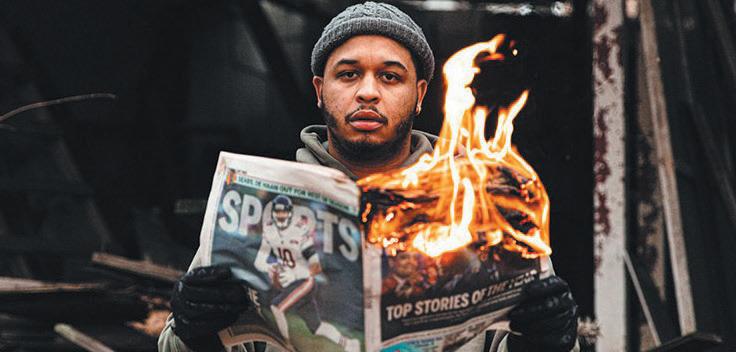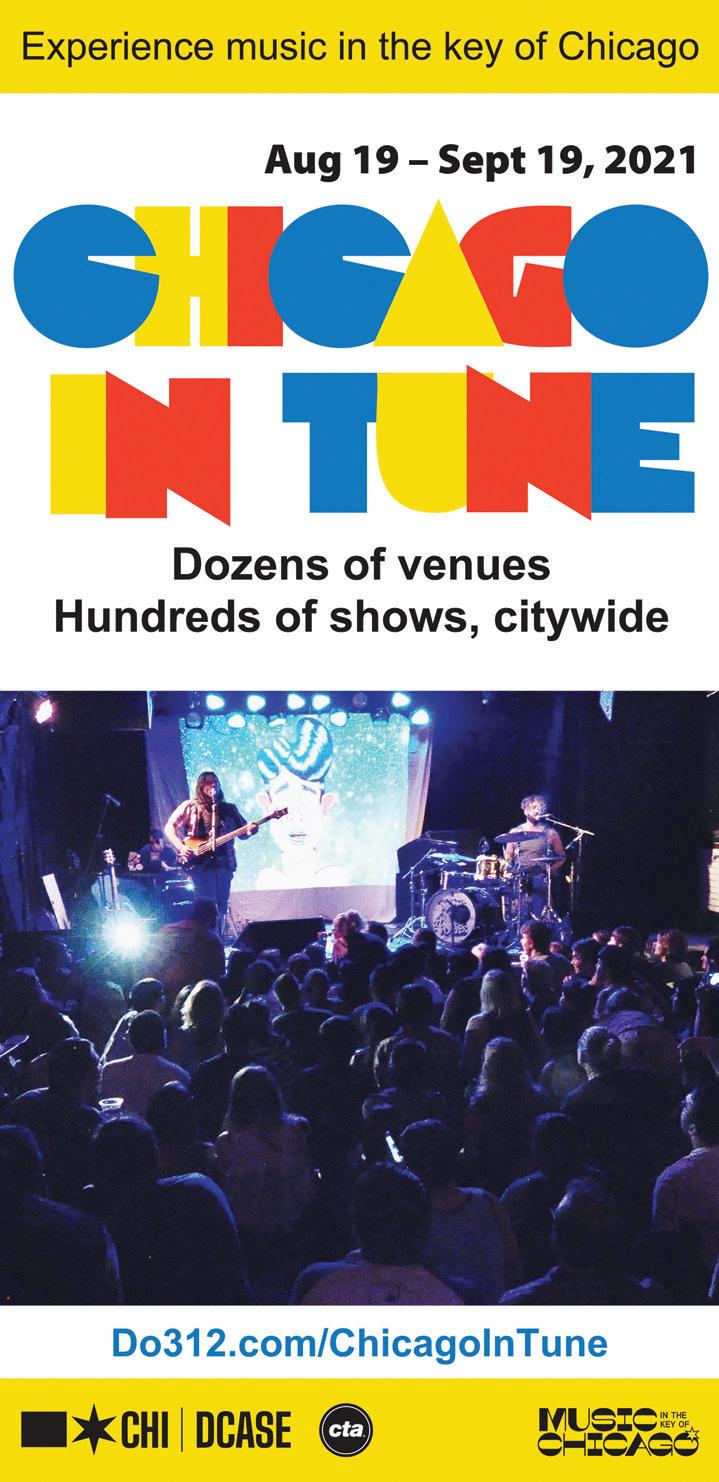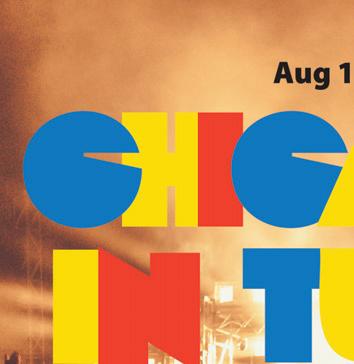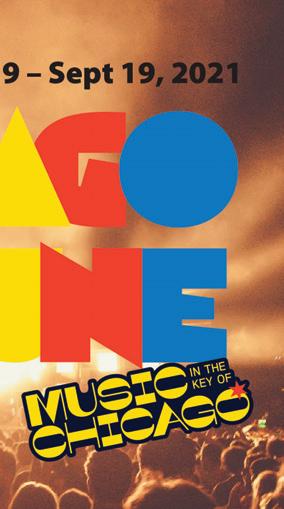The Food Issue
The people, places, and produce building communities, one trip to the market at a time


The people, places, and produce building communities, one trip to the market at a time

04 Inkling A defense of small talk
06 Isaacs | Culture Ravinia opens its Music Box.
moving coming-of-age-story, the Chilean drama Ema blazes bright, and Homeroom documents a pivotal moment of social change.
08 Books Becoming my own champion while reading critic Jessica Hopper’s words
10 Art in Public Jenny Lam’s postcard project reveals Chicago’s inner hopes and dreams.
18 Perfect Grocery Store “Devon Market? Divine market!”
20 Seeds El Paseo Community Garden is about more than just harvesting vegetables.

PULLOUT Chicago in Tune The Reader’s guide to this monthlong music festival includes more than a dozen doorways into its bottomless offerings.
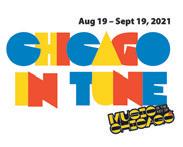
21 Food For All Fresh Moves Mobile Market is a rolling food oasis.
22 Map A guide to longtime, affordable, and excellent restaurants in just about every neighborhood
26 Fundraiser Dance for Life returns to live performance.
12 Sula | ‘True Salvage’ Continental Sales Lots-4-Less is a real treasure island.
16 Market Thai culture thrives in Bridgeview.


28 Pilgrimage Theatre Y flips the script on The Camino Project with YOU ARE HERE
29 Movies of Note CODA is a
30 Chicagoans of Note Dana Hall, jazz drummer and educator
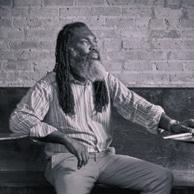
32 Shows and Records of Note Previews of concerts by Orisun, Matthew Shipp, Modern English, and more, plus reviews of releases by Shannon & the Clams, Stuck, and Turnstile

38 Early Warnings Rescheduled concerts and other updated listings
38 Gossip Wolf Hannah Sandoz releases a new collection of melancholy avant-garde folk, the famous Danny’s Smiths Night comes back for one evening at the Empty Bottle, and cult house artist Marcus Mixx looks for help with a new apartment.
TO CONTACT ANY READER EMPLOYEE, E-MAIL: (FIRST INITIAL)(LAST NAME) @CHICAGOREADER.COM
PUBLISHER AND PRESIDENT TRACY BAIM PUBLISHER AND EDITOR IN CHIEF KAREN HAWKINS EDITOR IN CHIEF SUJAY KUMAR MANAGING EDITOR BRIANNA WELLEN PRODUCTION MANAGER KIRK WILLIAMSON GRAPHIC DESIGNER AMBER HUFF MUSIC EDITOR PHILIP MONTORO THEATER AND DANCE EDITOR KERRY REID INTERIM CULTURE EDITOR SALEM COLLO-JULIN ASSOCIATE EDITOR JAMIE LUDWIG SENIOR WRITERS LEOR GALIL, DEANNA ISAACS, BEN JORAVSKY, MIKE SULA STAFF WRITER ADAM M. RHODES EDITORIAL ASSOCIATE TARYN ALLEN
DIRECTOR OF DIGITAL JOHN DUNLEVY SOCIAL MEDIA COORDINATOR JANAYA GREENE STRATEGIC INNOVATION DIRECTOR MARIAH NEUROTH DEVELOPMENT AND MARKETING ASSOCIATE CHINYERE FARR-DOUGLAS MEDIA PARTNERSHIPS COORDINATOR YAZMIN DOMINGUEZ EXECUTIVE ASSISTANT SANDRA L. KLEIN ADVERTISING
312-392-2970, ADS@CHICAGOREADER.COM
CLASSIFIEDS:
CLASSIFIED-ADS@CHICAGOREADER.COM
40 Savage Love Dan Savage tells someone why it’s game over for her husband’s kinks.
45 Jobs
45 Apartments & Spaces
VICE PRESIDENT OF SALES AMY MATHENY SALES DIRECTOR AMBER NETTLES SENIOR ACCOUNT REPRESENTATIVES LENI MANAA-HOPPENWORTH, TED PIEKARZ, WILL ROGERS, LISA SOLOMON
NATIONAL ADVERTISING VOICE MEDIA GROUP 1-888-278-9866 VMGADVERTISING.COM
JOE LARKIN AND SUE BELAIR
DISTRIBUTION CONCERNS distributionissues@chicagoreader.com 312-392-2970
CHICAGO READER L3C BOARD PRESIDENT DOROTHY R. LEAVELL TREASURER EILEEN RHODES AT-LARGE SLADJANA VUCKOVIC
READER INSTITUTE FOR COMMUNITY JOURNALISM, INC. CHAIRWOMAN EILEEN RHODES TREASURER CAROL BELL DIRECTORS ALISON CUDDY, VANESSA FERNANDEZ, KIM L. HUNT, JACKIE KAPLAN-PERKINS, DOROTHY R. LEAVELL, SLADJANA VUCKOVIC
THIS CHANGE HAS been a long time coming, and we’re really just getting started. (Read: Yes, there are some things missing from the new site. Yes, we’re working on it. Yes, we’d still love to hear from you if you find a gap or have feedback for us!) Migrating to WordPress and modernizing the site is part of the Reader’s grand plan to keep being free and freaky for another 50 years. We couldn’t do it without you, and I want to thank everyone who’s supported us during our transition to nonprofit and our ongoing struggle—like everyone else—to successfully weather the upheavals of the last 18 months.
I also want to thank the team at Newspack, a WordPress initiative for small to midsized publishers, for your dedication to us underdogs. And, last but not least, thank you to Reader digital director John Dunlevy, and to everyone who makes us who we are.
The look and feel of chicagoreader.com has changed, but the Reader’s commitment to independent, alternative, impactful journalism has not. Welcome in, we hope you’ll stay awhile. —KAREN HAWKINS, CO-PUBLISHER

READER (ISSN 1096-6919) IS PUBLISHED BIWEEKLY BY CHICAGO READER L3C 2930 S. MICHIGAN, SUITE 102 CHICAGO, IL 60616 312-392-2934, CHICAGOREADER.COM
COPYRIGHT © 2021 CHICAGO READER PERIODICAL POSTAGE PAID AT CHICAGO, IL
ALL RIGHTS RESERVED. CHICAGO READER, READER, AND REVERSED R: REGISTERED TRADEMARKS ®
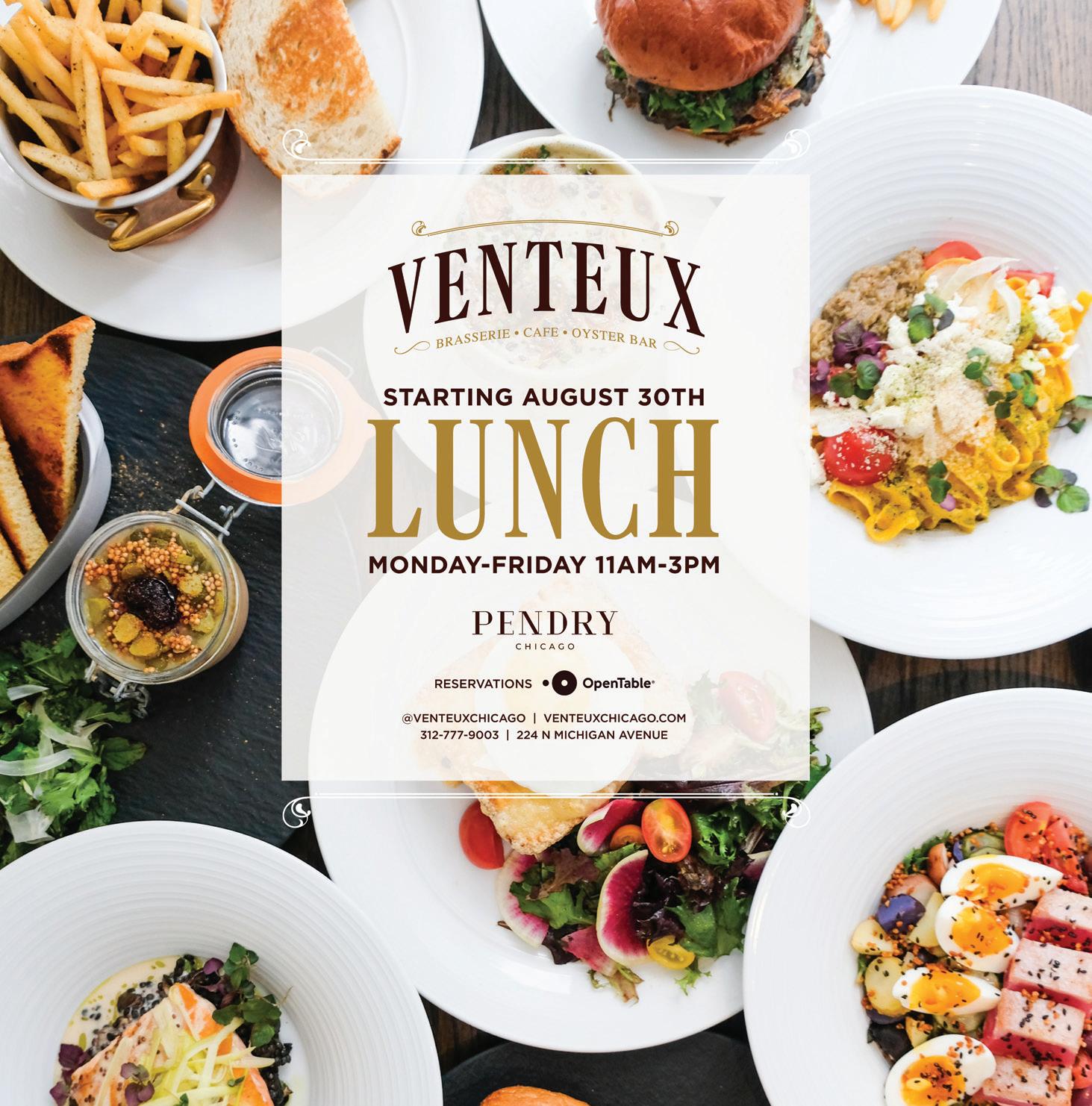
the spot. We’d just met. Asking me to open up on that level felt a little presumptuous. We were supposed to talk about how the week was dragging, and then we were supposed to debate Jewel-Osco versus Mariano’s, and if we were vibing, THEN we could compare our senses of self.
Over last COVID-19 winter, I started a habit of talking to myself out loud in my apartment. I’d catch myself whispering as I moved through my kitchenette: “Does she want a little peanut butter sandwich?” She did.
But for the most part, my private monologue was not small talk on any level. It was soul-searching and self-reflection, unhinged and cyclical, a hall of mirrors that I wandered through day after day. After a few weeks of this, I texted an extroverted friend my complaints, and she said, “Low-stakes social interactions are my oxygen.” Now that I’m moving carefully through the world again, I’m gulping down these inconsequential moments.
and . . . ” with no required punchlines. Being clever can be a bonus, sure, but mostly you just have to sustain the interactions. Keep it simple, baby. Lean on clichés! If it sounds like two poorly programmed AI bots having a chat, then you’re doing it right. Enjoy the ride, and don’t drag it out. The perfect conclusion to any small-talk moment is the elegant, functional “Have a good one.”
There are so many big, scary, valid things to worry about all the time. What a relief to talk about your favorite La Croix flavor with a deli clerk who will never know your name. There’s a distinct pleasure in hitting the rhythms of a conversation, even if the actual contents don’t matter so much.
During the loneliest stretches of pandemic isolation, when I spent ages eternal locked in my studio apartment eating canned chili and descending into my most feral state, I missed a lot of things. Thrift stores. Dinner parties. Riding the el. But the thing I missed with the most startling acuity, as if a vital organ had been ripped from my body: small talk.
I’m talkin’ tiny talk. Miniscule dialogues with Uber drivers or baristas or nail techs. The kind of communications that leave your brain as soon as they wrap up. Small-talk naysayers label these conversations as a waste of time, but after such a long stretch held apart from them, I can see the truth clearer than ever. Small talk rules! As my post-vax, real-world interactions ramp up, I’m finding real joy in saying “TGIF” to my doorman every single Friday.
Listen, I love all talk. My favorite drinking game is a good conversation. Big, deep, necessary exchanges have their time and place. Man
cannot live on platitudes alone. But I don’t need to discuss my traumas with my dental hygienist. My neighbor in the elevator does not need to know my beliefs on God.
I want to talk about how today it’s cloudy, but yesterday we got some sun, and—hey!— the weather app says this weekend will be hot! Doesn’t that sound so soothing, like playing Candy Crush on easy mode? Just a perfunctory motion, all the pieces falling into place. Talking about the weather is a free space on your conversational bingo card. Everyone experiences it, it’s always changing, and even your deepest-held opinions won’t o end anyone. No one’s going to dox you for bragging about how actually you love the rain.
Once, at a party, I got stuck talking to a girl who immediately jumped into soul-searching questions. When was the first time you experienced a sense of self? I took a gulp of wine from a red Solo cup and glanced around the room. If that question had a preamble, I might have answered. Instead, I felt put o and on
Maybe you don’t hate small talk. Maybe it just intimidates you. The good news is that small talk is really just a game, and the rules are easy to learn. Trader Joe’s cashiers didn’t pop out of the womb knowing the exact quip to drop about your Gummy Tummies Penguins. If you want to engage in small talk, your job has two prongs: 1. Be pleasant. 2. Keep responding. Just think of it as the worst improv comedy show you’ve ever been to, an eternal “Yes,

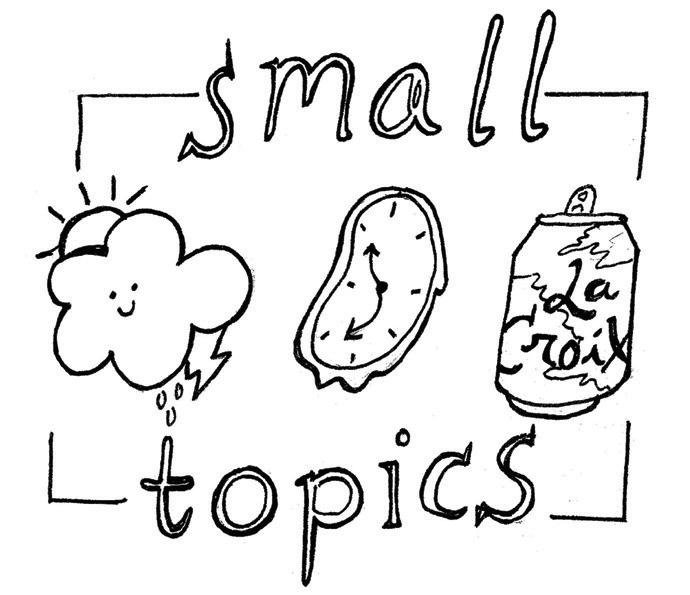
When I say I missed small talk, what I really mean is that I missed people. The community I pass through every day, not friends or even acquaintances. Strangers who are nice just for the sake of it. I missed their variety and predictability, their everyday interactions that keep the globe turning, the sweetness of a social contract where we agree to exchange a handful of pleasant sentences about our shared world.
So hey, it’s good to see ya! This week’s dragging, huh? Heard we’ll get some sun this weekend! Take it easy, man. Have a good one, OK?
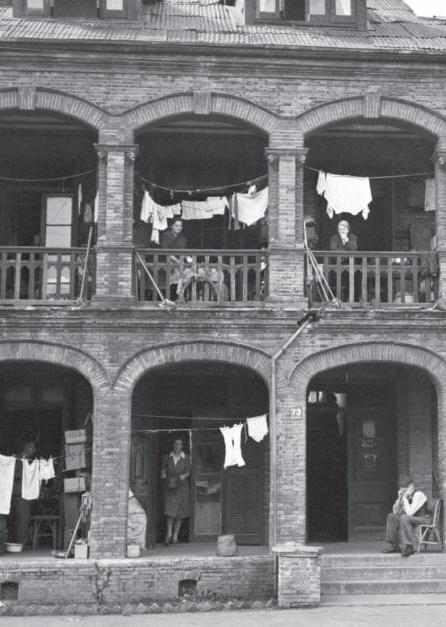
NOW OPEN !

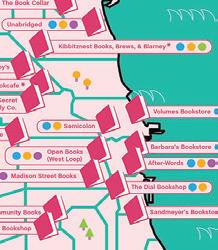
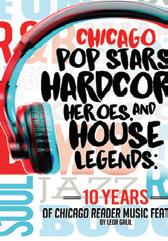



s a film student in the early 90s, Yvonne Welbon only knew of one Black woman filmmaker: award-winning director Julie Dash. Her professors at the Art Institute of Chicago were dumbstruck when she asked if they knew of others. “They were like, ‘Maybe you’re the second one,’” she says. Welbon knew that wasn’t true, so she began doing her own research on Black women in film and compiling her findings into a massive database. In 1997, she transformed the project into Sisters in Cinema website as a resource guide and archival project for and about Black filmmakers.
Today, Sisters in Cinema is a nonprofit organization that celebrates Black girls, women, and gender-nonconforming filmmakers through education, raising awareness, and community support. Among their programming is a documentary fellowship, a screening series, a newsroom, the Sister Social networking gathering, and Sisters in Cinema Productions. “We’re all working together to show how Chicago can be a home for those interested in working in the creative industries, and we’re providing the tools—like our upcoming financial literacy workshops—to help people succeed,” Welbon says.
Sisters in Cinema has also established Sister Outside, a violence interruption initiative that promotes wellness and friendship through neighborhood walks. “We have docents who tell the story of South Shore, and our first stop is Michelle Obama’s house where she grew up,” Welbon says. “It’s a fun tour with historical notes, and it’s casual—it’s only 1.4 miles—so it’s a really comfy walk.”
Following a strategic planning session in 2019, Sisters in Cinema received a Neighborhood Opportunity Fund grant, and this winter they began realizing their biggest dream yet when they broke ground for the Sisters in Cinema Media Center on 75th street in South Shore. The building, which is slated to open in fall 2021 (pending some COVID-related construction delays), will house a gallery, a 45-seat theater, an editing lab, a mixed-use conference and classroom space, and more.
“We’re creating an institution on the south side of Chicago that is for the community,” Welbon says. While the space will serve Sisters in Cinema’s mission of centering Black women, girls, and gender-nonconforming media makers, it will be open to everyone. “This fall we will be working with community members to learn about how they want to use the space, because there hasn’t been anything opening in that community for a long time,” she says.
On August 21, Welbon and Sisters in Cinema will take part in a panel discussion presented by the Chicago Humanities Festival about the development of community-based film resources and infrastructure on the south side, and supporting local women and nonbinary Black and Brown filmmakers. Assembled by Sisters in Cinema’s operations and program manager Joyy Norris, the panel will also include Michelle Kennedy of the Chicago South Side Film Festival, Margaret Caples of the Community Film Workshop of Chicago, and Justin D. Williams of the South Side Home Movie Project. Welbon says that the program will be especially powerful due to the speakers’ long-established working relationships and personal connections. “We work to support each other because our missions and visions are aligned,” she says.
The event will also feature a collection of short works, including Change the Name by Cai Thomas, which documents the efforts of Chicago middle school students to rename Douglass Park in honor of Anna Murray and Frederick Douglass, premiered at the 2021 Tribeca Film Festival and on BET in June.

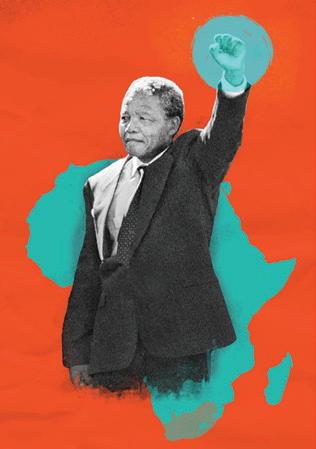
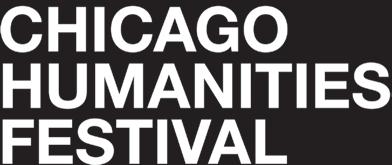

Thomas has been a Sisters in Cinema fellow since 2019, and describes it as a lifelong mentorship rather than traditional fellowship. “Building community with other Black women who really understand the unique position of being a Black woman documentary filmmaker has been really great,” she says.
Welbon says that fundraising for the new building is ongoing and she encourages people to visit Sisters in Cinema’s website (sistersincinema.com) to learn more. “This is a labor of love, but it’s really something that relies on the support of the community to really work,” she says. “There are volunteer opportunities too, to join us and get involved.”
Here’s one way to think about the Ravinia Music Box, the new, high-tech attraction that debuted this month in its own building on the festival grounds: it takes the legendary music venue back to its earliest days.
In 1904, when Ravinia first opened, it was an amusement park, intended to drum up passengers for a new railroad, the Chicago and Milwaukee line. Built along the railroad tracks, with its own station, it featured a carousel and thrilling electric swing ride, along with an electric fountain, skating rink, ballroom, baseball diamond, and theater. Also, a music pavilion.
It wasn’t until that venture bankrupted, in 1911, and philanthropists took over, that the music became the whole show.
From 1919 until 1931, when it closed thanks
to the Depression, Ravinia was a top-tier summer opera venue; when it reopened, in 1936, it became the summer home of the Chicago Symphony Orchestra, with classical music as its major focus.
Since long before last year’s COVID-19 shutdown, however, there’s been concern—at Ravinia and elsewhere—about dwindling audiences for the classical genre. Ravinia’s pop and other offerings can fill the lawn but, as former CEO Welz Kau man noted at a Music Box preview earlier this month, audiences for those events aren’t necessarily coming back for classical concerts.
Kau man, who headed Ravinia from 2000 to 2020, said he was pondering how to take advantage of the fact that those nonclassical audiences typically arrive as much as three or four hours early and have a lot of free time in
the park when he visited the Abraham Lincoln Presidential Library and Museum in Springfield. He was blown away by its multimedia presentation of the Lincoln story, and came away wondering “Who did this?” and “Could they do it for Leonard Bernstein?”
The firm behind the Lincoln Museum show was California-based BRC Imagination Arts; Kau man got in touch.
The result, 15 years and a lot of collaboration later, is Bernstein’s Answer—a 12-minute “immersive theater experience” that whisks through Bernstein’s life from gifted prodigy (who could “see” music) to multi-genre composer, conductor, activist, and television icon. It plays in a 65-seat “4D” theater with wraparound screens, light and kinetic e ects, Bernstein’s own scores in a soaring bath of sound, and some startling holographic images
of “host” Bobby McFerrin and a young “volunteer” from the audience played by Chicago actor and singer Amina Gorman. Bernstein himself appears in photos, video clips, and as an animated cartoon figure that brings to mind an obvious—though very di erent—predecessor: Disney’s Fantasia, circa 1940.
The audience experience begins in an outer lobby of the gently curving structure built to house it, moves on to a brief video introduction on multiple framed screens in an inner “Welz Kau man” lobby, and, after the theater presentation, ends in a gallery that leads to the exit. The building (which also houses a rooftop bar) and the current production cost a total of $28 million; Bernstein’s Answer is expected to have a five-year run before it’s replaced by another show.
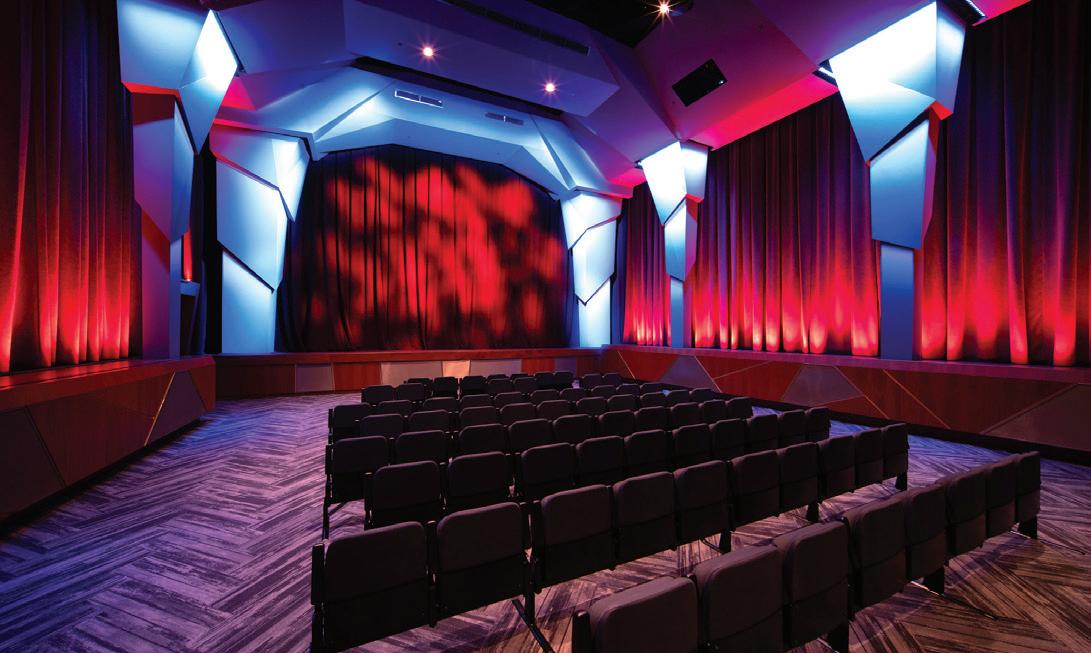
Current CEO Jeffrey Haydon said education is at the heart of this roller coaster of multisensory stimulation, and it’s easy to see the Music Box as a magnet for school groups on field trips. Kau man considers it “an overture.” (He said he was aware that the classical world might consider it “too surfacy,” but reasoned, “If you’re taking someone for their first sushi, do you order blowfish or California roll?”)
And BRC creative director Brad Shelton, whose firm also created the hologram feature for the Illinois Holocaust Museum and is working on a Chicago Blues Experience, said, “We want people to think this is the coolest thing they’ve ever seen.”
It’s definitely cool. But what sticks, at least on a first viewing, is the technology at play— the light, the sound, the figures that look real enough to embrace. For an effort to inspire with the power of music (especially classical music), it does a grand job of impressing with the power of technology.
If you’re heading to Ravinia during the next month to catch, say, the Beach Boys or John Legend, you can check out Bernstein’s Answer yourself. Access is free with each Ravinia ticket, but you’ll probably need to head there early in your visit. Even at full capacity, they’ll be moving a maximum of just 260 people through the “experience” each hour, starting when the park opens and ending a half hour before the Pavilion performance.
@DeannaIsaacsPraised are you who remember Leelah & Blake, Greyson & Mark, Layleen & Leslie
Praised are you who hold up the trans universe, who agitate & educate migrate & radiate


Praised are you who shelter us in libraries & nursing homes locker rooms & train cars prison cells & hospital beds






Praised are you who clothe us in combat boots & leggings button ups & chainmail leather & pleather faux fur & sequins
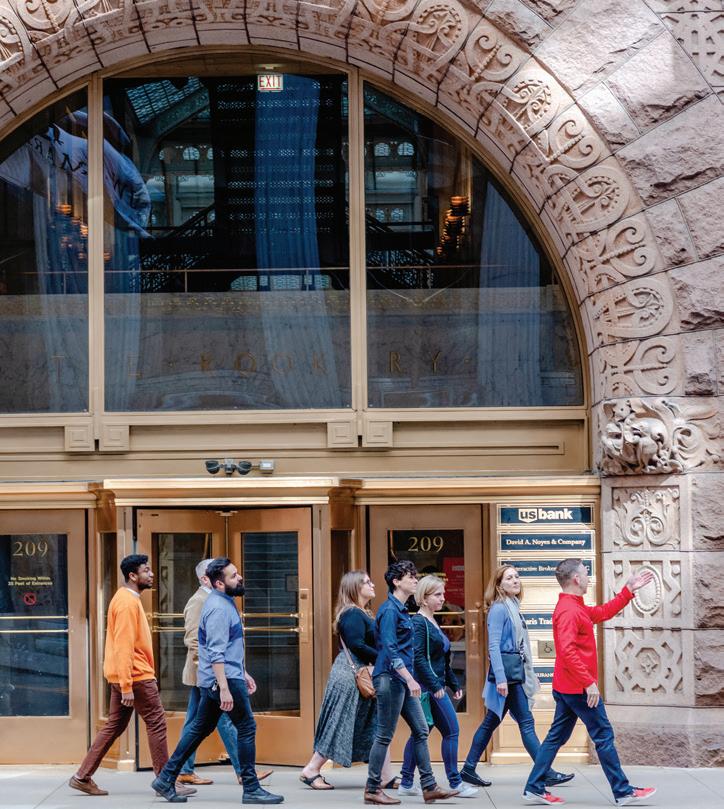
Praised are you who share our joy in naming & renaming screaming & dreaming injecting & rejecting
Praised are you who soothe us from the harms we inflict on ourselves & each other
Let us hope for a day when we no longer need to pray for our safety.
H. Melt is a poet, artist and educator whose work celebrates trans people, history and culture. They are the author of The Plural, The Blurring and editor of Subject to Change: Trans Poetry & Conversation. They attended the Lambda Literary Writers Retreat and the Tin House Workshop. Their next book, There Are Trans People Here, will be published by Haymarket Books in November 2021. A biweekly series curated by the Chicago Reader and sponsored by the Poetry Foundation.
The first time I read Jessica Hopper’s work, I was awestruck. Her essays in the online publication Rookie felt so emotionally honest in contrast to my own close-tothe-chest media consumption. I hadn’t heard the entire Smiths discography at that point (should I have?) or the Sex Pistols but in the interest of seeming cool, e ete, and somewhat

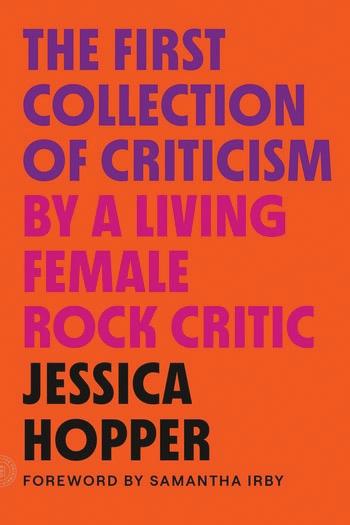
neutral, I lied through my teeth to others about what media, and especially, what music I had or had not consumed. There was none of that dishonesty in Hopper’s writing. The burgeoning feminist in me responded to the way she had a conversation with female artists and pushed beyond the expected in her interviews. Her writing transported me away from my adolescent bedroom and into venues, tour buses, and the other liminal spaces of concerts.
When the first volume of her book The First Collection of Criticism by a Living Female Rock Critic was published in 2015, my love for her only grew. Her original edition was honest, loud, and a little brash. I even appreciated that she wrote the word “fuck” in the second essay
of the collection, “Emo: Where The Girls Aren’t.” As a teenager, I favored being diplomatic rather than forthcoming. Hopper’s work gave me a window to a version of myself that called out sexism and misogyny as I saw it and used the word “fuck” as much as I pleased—whether or not my mother approved.
The new revised and expanded edition of The First Collection, published this summer by MCD x FSG Originals, includes a coherent narrative typically hard to achieve in essay collections. This book is about women in music as they really are: angry, sad, joyful, sarcastic, intelligent, and multidimensional. Writer and former Chicagoan Samantha Irby describes Hopper as “feminist as fuck” in the foreword in this edition, and honestly none of this is a surprise to those familiar with the larger body of Hopper’s work.
While this year’s publication is technically a second edition, it feels like a completely new book. There’s a bevy of new material and revisions have been made to some of the original essays to reframe the information for a contemporary audience.
Hopper’s writing never feels confined to a particular place and time. This is most evident in “Emo: Where The Girls Aren’t.” The essay, originally published in the magazine Punk Planet in 2003, describes Hopper’s feelings of
alienation from the emo rock scene despite being an avid fan. Hopper writes about not seeing her experience—or really the full humanity of women—be represented in any way in the scene. She wrote, “As it stands in 2003, I simply cannot conjure the e ort it takes to give a flying fuck about bands of boys yoked to their own wounding, aka the genre known as emo.” Hopper then dove into punk rock’s political beginnings and the shift in the music genre to the person-centered lyrics of emo. Hopper described the early emo scene as sensitive to the types of specific su ering women go through, and the overt misogyny of the early 00s version of emo in decided contrast. “Girls in emo songs today do not have names,” Hopper wrote. “Women are not identified beyond their absence, their shape is drawn by the pain they have caused. Their lives, their day-to-day-to-day does not exist, women do not get colored in.”
Hopper’s words are about emo circa 2003 but feel resonant to genres across decades, when women are often portrayed in song lyrics as the cardboard cutout versions of themselves and only exist with the limited language of how they are seen by men. Interestingly enough, the song that came to mind for me when reading this was the stalker anthem “Hey There Delilah” by Plain White T’s, which was written about someone who ostensibly did not want to be written about and enriched the person who engaged in creeping via song lyrics. In that case and in the cases of countless other women represented in part or in whole in lyrics written by men, Hopper is clear: we all deserve more. She wrote, “We girls deserve more than one song. We deserve more than one pledge of solidarity. We deserve better songs than any boy will ever write about us.”
In a later chapter Hopper interviews Canadian musician Lido Pimienta about her 2020 album Miss Colombia . The interview is an expansive conversation between them: an Indigenous and queer artist speaking to a music critic who asks all the right questions. They address colonization, racism, sexism, and other issues that directly impact Pimienta and her work. Hopper tells us about Pimienta’s acceptance speech for the 2017 Polaris Music Prize (a music award given annually in Canada for the best full-length album of that year). As Pimineta accepted the award for her album La Papessa, she talked about the racism that she
faced in Canada, reminded the audience of the significance of living on colonized First Nations land, and talked about being dismissed by a sound person before her performance. Hopper reflected, “Since then, it’s become evident that the music industry wants credit for putting Pimienta—an outspoken Indigenous Queer woman—on the stage, but doesn’t have much interest in hearing what she’s saying.”
The outspokenness of Hopper’s interviewing style was matched perfectly by Pimienta’s answers as an artist. Hopper was willing to ask about “taboo” topics, and Pimienta was more than willing to answer in a way that eschewed any type of public relations mechanism. There is something special about women who have given themselves and others the space to speak with moral clarity and this interview was striking because of the way Pimienta has clearly done that for herself as an artist. It was imperative to her personhood to do so.
In the interview, Pimienta said to Hopper, “I can’t conform. I just don’t know how else to be. I just can’t. I do have friends who are like, ‘Lido, you are crazy. You have to chill out. Why do you have to say the things you say?’ And I’m just like, ‘Because I can!’”
A particularly striking moment in the interview happened when Hopper asked Pimienta about the pressure as a musician to write songs in English. “I’m pretty good at communicating in English, but writing a song in English is a whole other . . . I just can’t do it. If I wrote in English, the whole vibe would change,” Pimienta said. “The stu that I say is so obscure but the rhythm is way accessible. People are like, ‘Oh, I can dance to this!’ But I’m actually talking about polyamory; I’m talking about possessive partners, and violence against women.”
When Hopper asks about the inspiration for the album, Pimienta reminds us of the moment when Steve Harvey hosted Miss Universe in 2015 and mistakenly crowned Miss Colombia the winner and had to recant and crown Miss Philippines instead. She wanted the album name and the songs within it to make a statement about the pervasive misogyny in Colombia.
“Beautiful women is what Colombians are about. We’re right up there with cotton, and pearls, and sugar, or oil, or whatever. We’re currency; that’s what we are as women in Colombia,” said Pimienta.























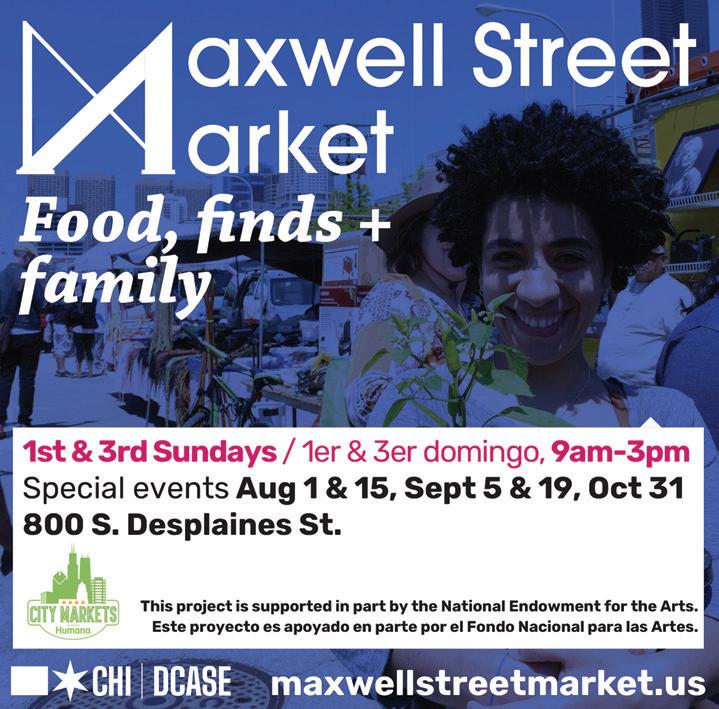
The last portion of The First Collection is dedicated to profiles of prominent female artists like Joni Mitchell, Sleater-Kinney, Hole, and women listed on the Village Voice’s critics’ poll list “Pazz and Jop” from 2018, including Janelle Monaé, Kacey Musgraves, and Robyn. But Hopper’s afterword for the book is perhaps some of the most urgent writing in the collection. She wrote it as speaking directly to the reader and it’s part personal history and part call to action. Hopper’s essays throughout the collection document the degradation and co-optation of independent spaces and artists by major labels and the mainstream, but also how the rise of streaming has meant that many artists have had to survive on a new syndicated model for their music and lend their sound to brands.








In addition to trying to account for the nefarious nature of the music industry through its unfair compensation models for artists, Hopper also writes about the rampant patriarchy that runs roughshod through the industry, materially harming women who try to make their voices heard. She also gives us a snapshot of the sexism that has been thrown her own way.
“I received a lot of unbidden advice from men, many of whom I barely knew, about my work,” writes Hopper. “They usually offered the same paternalistic scolding: that it was perverse to tangle up music criticism with feminism or my personal experience, moral judgements about music didn’t belong in reviews and I should stick to merely aesthetic ones.”
Despite the ill-advised advice, Hopper’s entire career has been dedicated to a new kind of music criticism, one that understands how political art is. The absence of addressing the politics and power structures behind even the blandest music is not only possible but necessary. It’s hard to reimagine what a “feminist music industry” would look like but Hopper’s words tell us that the industry as a whole hasn’t come very far. She references the first time she heard musician Kat Bjelland scream and how that scream liberated her. What Hopper has done by documenting all the women who “scream,” literally and metaphorically, is help weave the voices of female artists into a chorus, and tell us this is what they are saying about sexism, misogyny, racism, colonization, homophobia, and xenophobia. We have to be the ones to decide if we are going to listen.
@schilukuri1
Lam received candid messages from strangers who picked up her postcards.
COURTESY OF JENNY LAM
Jenny Lam’s postcard project reveals Chicago’s inner hopes and dreams.
BY TONY PEREGRIN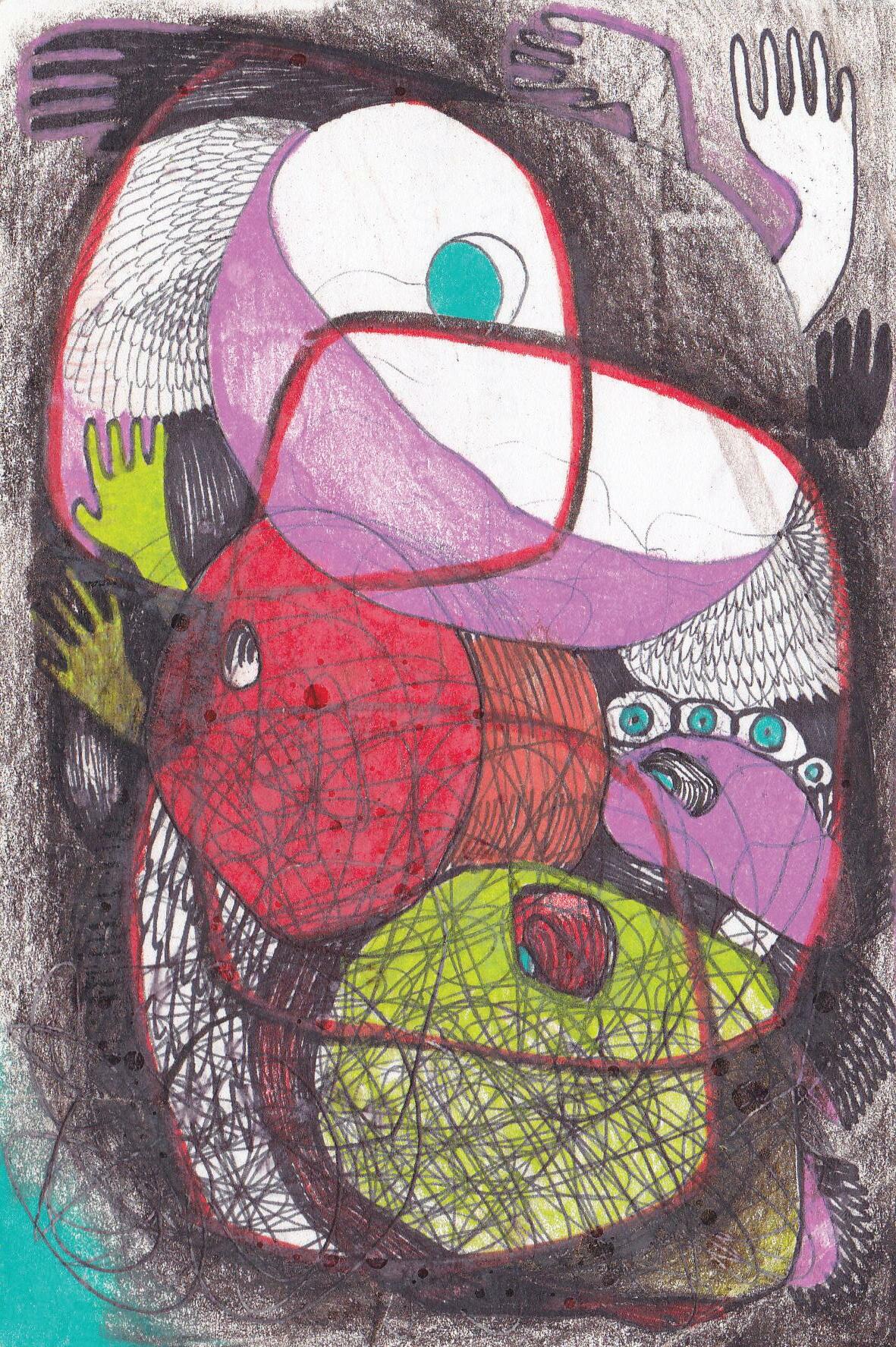
You may have seen one of Jenny Lam’s blank, prestamped, self-addressed postcards a xed to a light pole or on a bookstore shelf somewhere in the city. The postcards always feature the same prompt: “Tell me one thing you dream of doing before you die. Use this card as your canvas.”
Lam, a Chicago-based artist and independent curator, places a unique code on the bottom corner of each postcard, which she uses to record and track its location. “Gradually, I am able to piece together a map of the city of people’s dreams,” says Lam, when we spoke on the phone July 29. She’s left thousands of postcards—6,300 to be exact—in every Chicago neighborhood since the project’s Chicago debut in September 2012.
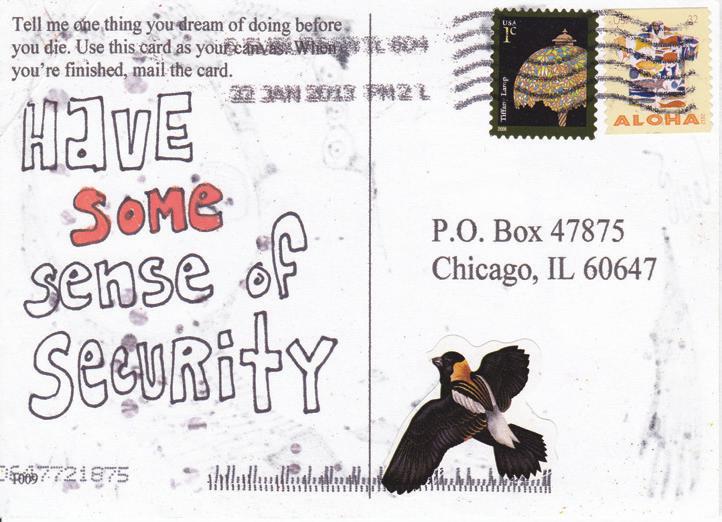
am able to piece together a map of the city of

debut in September 2012. dreams and hopes.


Lam developed a similar project from 2008 to 2009 in New York City, during which she received 100 postcards back. After graduating from Columbia University, she returned to Chicago and relaunched the project on a much larger scale, calling it Dreams of a City . To date, Lam has received more than 600 postcards detailing an astonishing spectrum of dreams and hopes.
“Chicago is the perfect city for a project like this because it’s so segregated,” says Lam, a Chicago-born, Chinese American daughter of immigrants from Hong Kong. “It is my hope that Dreams of a City helps bridge that segregation by showing our commonalities no matter where we live in the city. We have a lot more in common with each other than one might think.”
Chicago-born, Chinese American daughter of immigrants from Hong Kong. “It is my might think.”

Lam temporarily curbed the project due to COVID-19, placing her last postcard in Chinatown at the beginning of March 2020. Once vaccinations started ramping up, she decided it was safe to start leaving the cards around town again, placing her first post-hiatus card earlier this year in June. At that time, Lam also ventured back to her post office box for the first time in a while. It wasn’t overflowing with returned cards but she did receive a few that
town at the beginning of March 2020. Once vaccinations started ramping up, she decided first time in a while. It wasn’t overflowing with

were sent during the height of the pandemic and when Dreams of a City was on hold.
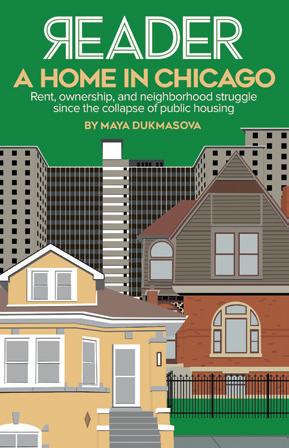
According to Lam, many people find the postcards and hold on to them for long stretches of time before finding the right moment to send their dreams to a complete stranger. “Maybe they keep them as a reminder of whatever they hope for. Maybe they don’t have an answer and just keep waiting for the best answer that they can think of. If I found a postcard like this, I would do the same thing,” says Lam.
One postcard returned to Lam during the pandemic said “I want the courage to be able to make the friends that I want to have,” an admission the artist found incredibly brave. Lam reflected on this response, “When it comes to being in the middle of a deadly pandemic, people really started thinking, ‘When it comes down to it, what am I living for? What are the things that matter to me the most?’”
The postcard responses usually fall into a few loose categories. This was especially true pre-pandemic: dreams of travel are common, as are career-related goals, particularly creative pursuits such as filmmaking, writing, or publishing. Family-related dreams such as mothers wanting their children to have a better life than they did or a desire to live long enough to see grandchildren achieve something also show up quite a bit.
Aug 26–Feb 26
ALSO ON VIEW
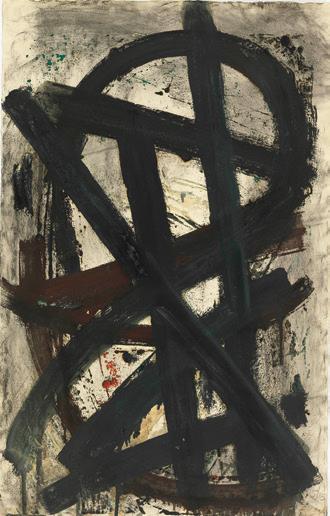
Hal Fischer Photographs: Seriality, Sexuality, Semiotics
Aug 26–Dec 22

“I’ve also received a lot of astronaut-related ones,” adds Lam. “With a project like this, because of the anonymity, people don’t have to worry about being judged. So, I’ll get some far-flung dreams—things that you might not necessarily tell someone in person.”
All of the Dreams of a City postcards, including those having to do with space travel, are viewable on the project’s Instagram.
The most popular dream that Lam has seen with the Chicago postcards is tethered to the desire to make the world a better place. “It goes back to the very first card, the oldest card that I received. That card said, ‘To make one film that matters and helps create positive change.’ That’s the biggest, overarching theme—people want to use their own skills and passions in order to create positive change.”
What dream would Lam write on her own postcard? “People ask me that question all the time because of this project,” says Lam. “I always tell them that this project itself is my dream. My mission is always to bring people together. Dreams of a City is not ‘Dreams of Lincoln Park’ or ‘Dreams of the Loop’—it’s the dreams of the entire city. It’s a love letter to Chicago that consists of a lot of di erent love letters and messages of hope.” v
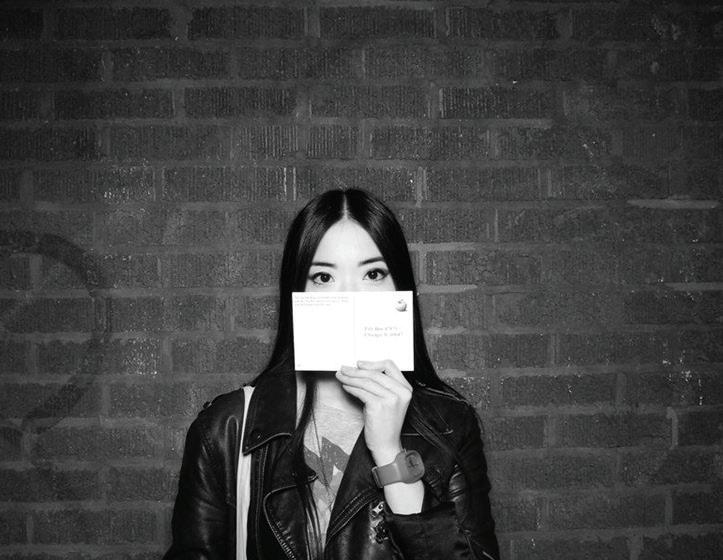
Crip*
Sept 23–Dec 11
University of Illinois Urbana-Champaign kam.illinois.edu
Cheap bubbly, celebrity cat food, and canceled breakfast cereal are here today . . . gone tomorrow.
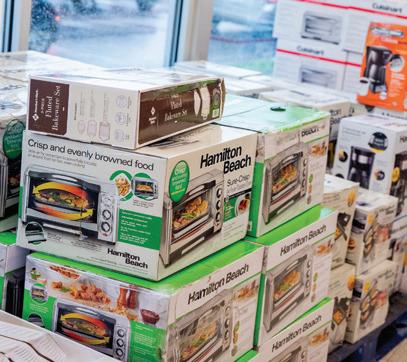
 By MIKE SULA
By MIKE SULA
John Sanchez reckons he downs 12 cases of bubbly a month.
“I don’t drink pop, or juice, or anything diet, so I usually come here for the bubbly,” he shouted. “It’s cheaper.” We were struggling to hear each other in a sun-beaten Clearing parking lot on a recent morning while he loaded two-liter bottles of Poland Spring Sparkling Water into his trunk. Every few minutes a Southwest Airlines 737 roared up from Midway across South Cicero Avenue, but Sanchez made it as loud and clear as a mountain stream that he was a devoted regular at Continental Sales Lots-4-Less. Even if he didn’t quite make the score he expected that morning, he still cleaned the store out of bubbly.
“I usually call, and they even have my num-
ber in the o ce,” he said. “And they can call me when they get any bubbly. I called today and they were like, ‘Yeah we have two-liters of bubbly.’ I came in, and they were gone already. I said, ‘Well, maybe next time you give me a call.’”
Inside the automatic glass doors, customer experience lead David Solano was greeting shoppers as they entered, staging shopping carts, and unlocking the restroom door upon request when his counterpart Jackie Spychalski showed up to give him his break. Solano has worked at Continental Sales for 23 years. Spychalski has been there for 14.
“When we were closed there was so many voicemails,” she said. “Like, ‘When are you guys gonna open back up?’ For a lot of people
it’s like a daily thing they do. They come here every day to see what we have.”
Her boss Ron Rojas says he was able to fully pay his 52 employees with PPP loan funds during the six weeks the 56-year-old closeout retailer shut down during the pandemic. All but three of them have returned to work at the 40,000-square-foot former Toys “R” Us (20,000 feet for merchandise display, 20,000 feet for Receiving in the basement). On that day the floor was well-stocked with short-dated cases of macaroni and cheese, six-pound cans of Chef-mate country gravy, and family-size boxes of Chris-

sy Teigen-John Legend-branded Chocolate Chex, complete with the former supermodel’s “Legendary Muddy Buddies” recipe. Rojas scored 15 cases of the cereal from a broker after Teigen’s recent social media downfall and was selling it for 40 percent less than its original retail price. He got a similarly good deal on 500-some boxes of Aunt Jemima pancake mix, discontinued after Quaker Oats “updated” its racist branding. They were nearing their sell-by date, and priced and positioned to move, near the front of the store. Any day now he was expecting the mother lode of Olympics-themed Team USA




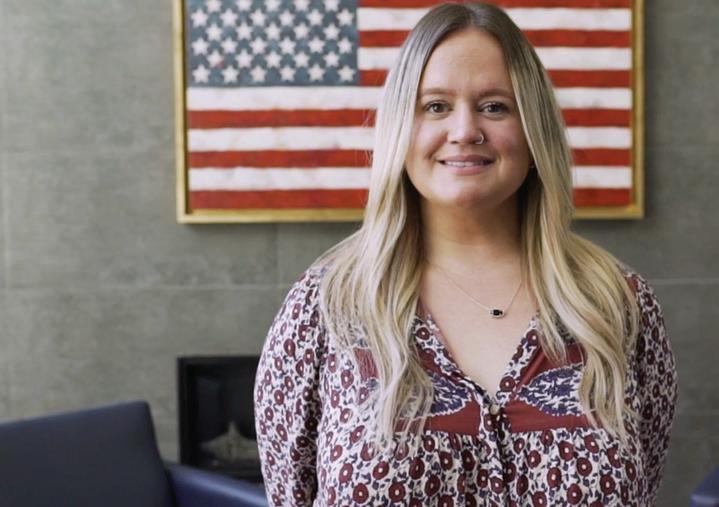

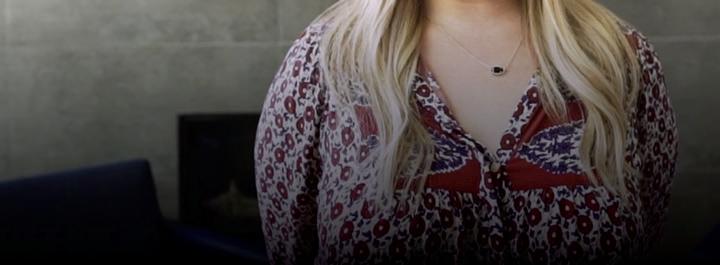





continued from 12
Oreos, their red, white, and blue creme filling loaded with “popping candy.”
Liquidated and discounted grocery items make up about 40 percent of Continental Sales’s stock at any given time, most of which is sold between 40 percent and 60 percent o the listed (and blacked out) price. But there’s also a Health and Beauty department currently boasting good deals on hemp oil- or charcoal-spiked Colgate toothpaste. Apparel might have some sweet House Lannister tank tops on sale, Pulp Fiction T-shirts, or random Bulls/ Bears/Cubs/Sox/Hawks swag. In Auto, there are windshield wipers, air fresheners, and antifreeze for days, and Housewares usually has cheap wine stems or maybe some oversized drinking glasses imprinted with Bible verses.
There are always rare and random finds. Rick Baker lives in the neighborhood and comes in a couple times a month, especially on Wednesdays when senior Club 60 customers enjoy a 10 percent discount. He’d grabbed a bunch of stu ed Gumby chew toys for his pit bull, and for himself a “Redneck Plunger” in the form of a pump-action shotgun that declared along the barrel, “The Poo Goes Thru.”
I noticed that the perfectly good kitchen blade I bought earlier this summer was still in stock, marked down to $1 because of the typo on the Chinese import’s package that says “BONER KNIFE.” (My store receipt says it too.)
Spychalski, at her post near the entrance, told me she loves her job, loves her boss, and her coworkers. But there was a lot more oddball product on the shelves when she first started, like anatomically correct, organ-shaped mugs (hearts, kidneys) and a whole aisle of Apprentice-era Trump dolls that “sold really well.”
“It was always the best with Ron’s dad, the owner,” she said. “He was definitely one-of-akind with some of the merchandise we used to get.”
The late Angelo “Mickey” Rojas was working as an architect in 1965 when a friend invited him to join him in the salvage business. They opened in the former Continental Health Spa in south suburban Burbank, excising “Health Spa” from the sign and replacing it with “Salvage.”
The business moved around in the early years, gradually transitioning from a wholesale salvage brokerage to a more retail-focused model by the time it settled into its current space in 1982, catty-corner from Midway in a relative retail desert. When Rojas first joined his dad’s business in 1996,
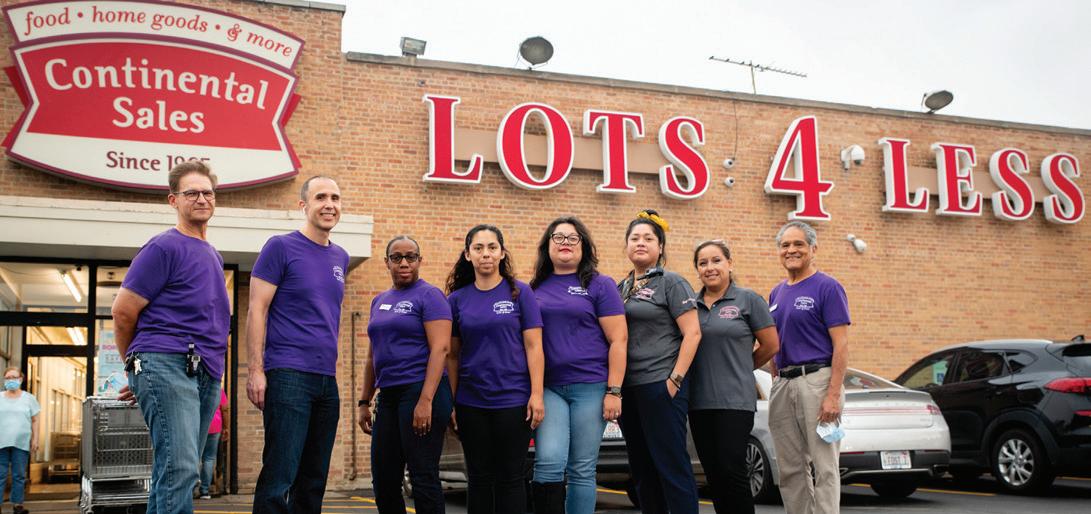
he’d just ended a short rookie season playing second base on a Detroit Tigers minor league team, having suffered a lower back injury. He remembers on his first day his dad had a complete 1992 auto transmission on display in the back of the store. “It was true salvage,” he said. The transmission eventually sold, but the son, who’d otherwise planned to coach ball at Triton College, never left.
He helped make the transition to retail more or less complete. “I saw opportunities,” he said. “I was thinking we can buy things that customers are actually looking for as well as having those unique deals.”
Over the years the store has built relationships with hundreds of vendors, manufacturers, distributors, and salvage brokers who know how to find them if they have to unload a product that is, say, nearing its manufacturer-determined “Best if used by” date, or something that’s been mislabeled, or shipped at a couple degrees off temperature. Rojas and two other buyers monitor their e-mails and texts and pounce on good deals, which are sometimes offered to other liquidators. The early bird gets the worm.
A few weeks ago around 6 AM, after Rojas had finished his morning meditation and workout, he checked his e-mail to discover an o er he couldn’t refuse. A truck full of Rachael Ray-branded cat food and 1,500 SwissTech backpacks was up for grabs. Just as parents are starting to outfit their kids for the new
school year, he marked the backpacks down to $7.99 from $28.99.
Last May he took a call from a salvage broker desperate to offload a trailer full of live tropical bromeliads rejected by a major supermarket chain because they’d arrived a day late. Rojas knocked the price down to $10 from $50, just in time for Mother’s Day, and had a staffer spend all his time replenishing the display until they sold out.
A visit to Continental Sales is a treasure hunt, and the same experience goes for the buyers making the deals. “With all of those contacts it’s enough to fill one high-volume store,” said Rojas. Continental Sales is a “true closeout” business, he says, versus national discount chains like Big Lots or Family Dollar, closeout posers that have to resort to purchasing imports directly to stock their shelves.
By the time you read this, the deeply discounted off-brand mac and cheese I saw an older woman piling into her shopping cart will probably be gone. (“Inflation,” she told me. “I’m stocking up.”) The Swedish Fish packaged in decorative plastic Easter eggs probably won’t last until April. But at $9.99, the 40ounce bags of “probiotic” dried apricots might still be around. “That’s too much,” another woman told me. “I might not like them.”
If they’re still in stock after their April 20, 2022, expiration date, she might get a better deal. The Continental Sales crew will move them to the rear of the store to the Thrift
Section, where expired items are sold at “stupid prices,” according to Rojas, 60 percent to 80 percent down. As long as seals or rims aren’t dented, and packaging isn’t otherwise breached, it’s good to go. “If somebody tastes something that didn’t sit well with them or they thought it was a little too old, or it didn’t taste the greatest, we give a hundred percent money back. But we have so little of that.”
Along with the Poland Spring and a half dozen di erent flavors of Kettle Brand potato chips, a pallet-load of La Lechera condensed milk was rapidly disappearing. This product was a “flyer,” so named because “it flies o the shelves.” Rojas said it would probably take a regular big-box retailer a month to move that much canned milk, but at his prices he was selling a pallet per week.
Right now Rojas is looking for an operations manager so he can focus all his time on sales and purchasing, with the idea of possibly opening a second store. But a true closeout is a delicate balance of relationships and environment that not just any abandoned toy store can provide. “If we were right next to a major store we’d have problems,” Rojas said. “Because they’d be calling those manufacturers and distributors saying, ‘How can we compete?’ But there’s no one near us. We don’t have any big competition. We’re the biggest thing on this little island.”
@MikeSulaIfindmyself, like many, living in a flashback of 2020 at multiple points of my day. Sometimes small acts trigger the time anomaly. Like waking up in the morning and checking my phone to suddenly realize this exact ritual was the origin of so many breakdowns (mental, societal, existential) and the bearer of so much loss that I would spend days in the fetal position, clutching the black square as empires decayed outside my bedroom window. CLUNK! My 2021 phone falls from my hand to the floor as I seize up for a moment, unable to tell when I am.
Or when walking into my neighborhood Target and reaching for paper towels then BOOM!
My eyes and mind project to me barren shelves, heavily weaponized store guards, and a swarm of anonymous masked faces with eyes of desperation clawing at the entrance door like a scene from World War Z. PUMPF! The 2021 paper towels hit the linoleum floor and I hear the announcement of a lost child by an ambivalent employee over the intercom system and dated Top 40 playlist. I am stuck between time. Twilight Zoned. Or better yet, stuck between the trauma of witnessing global cataclysm on a daily basis and abruptly being shoved back into that chaotic world armed with only a name badge, two cloth masks, and a resume with a blindingly visible gap. Here you go: decipher the equation of capitalism again. Capitalism no matter what.
The larger acts that trigger the time anomaly for me are mostly external and based on decision-making:



Mykele, that person is coming closer and they don’t have a mask visible. How are you going to greet them? How would you have greeted them last year? You wouldn’t have greeted them last year because you were inside your home the entire time, longer than most of the people who you wished you could have greeted. Here they come . . . just back away. Go hide. Where’s your sanitizer?
Or trying to figure out new social etiquette for myself:
Is it all right not to go to these events even though initially I said I would? Mykele, you’re vaccinated. Mykele, that doesn’t matter. Last year I was expected to be at home. Remember? People had patience then. You remember Animal Crossing, your island is probably filled with atheists now. Just go play Animal Crossing again. Go lay in the bed like then. People will understand. They have to. You’re not ready yet.



I write this to say that as I learn to live with this outer time experience (OTE for the scholars), I don’t entirely dread the process of living in both past and present. There is a strange level of responsibility I have over how I interact with the world now, informed by both. There is agency. There is a check-in. There is terror. But ultimately there is motion. Like a UFO that defies our physics, healing is nonlinear. I can only hope that I am not alone out here.
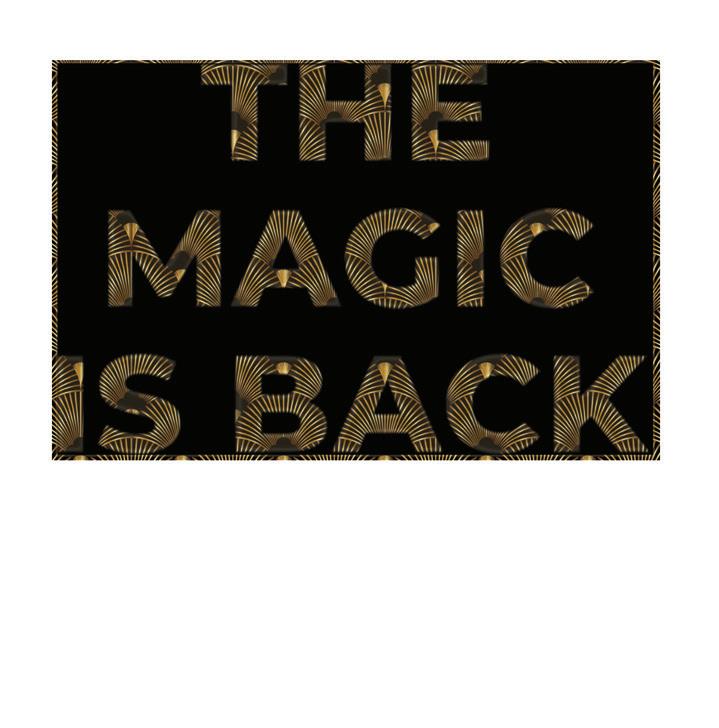
Bull Horn is an avenue to give wings to the stories that matter most. This series, from Red Bull in partnership with the Chicago Reader, invites guest writers, artists, activists, and community members to share their ideas and amplify timely, crucial topics they feel are important now.

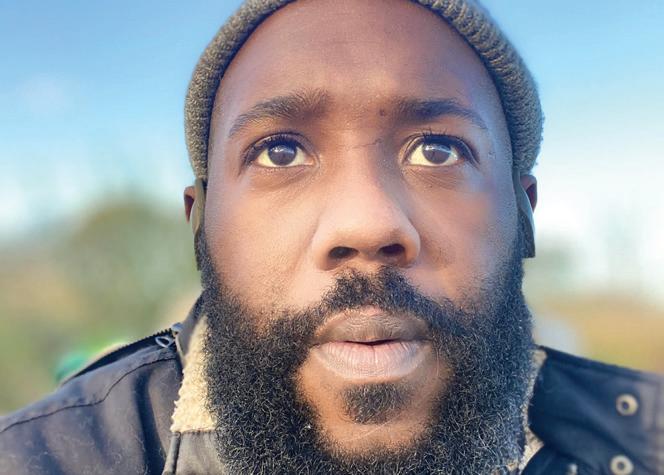
The weekly market features everything from authentic Thai dishes to locally grown Asian vegetables.
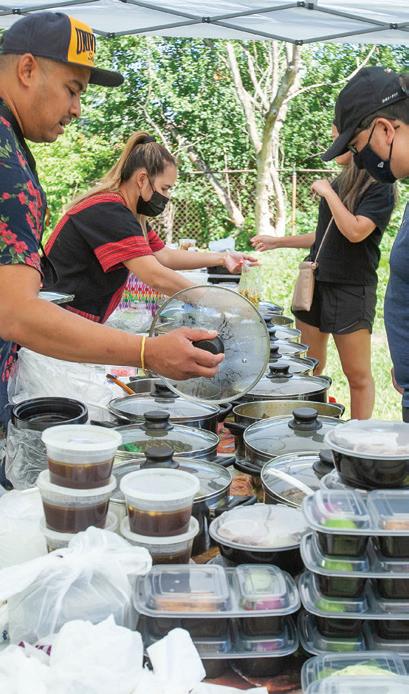

Sundays 10 AM-2 PM, Thai Twin, 7430 S. Harlem, Bridgeview, thaiillinoischamber. com, thaiweekendmarket@ gmail.com.

A small market started by the Thai Chamber of Commerce offers a community hub with plenty of authentic cuisine.
By KAYLA HUYNHIn Thai culture, the first question people ask is not “How are you?” but instead “Gin khao reu yung?” Have you eaten yet? As a kid, I’d learn this phrase from my mom, who immigrated to the U.S. from Bangkok in 1989. It just made sense: If you hadn’t eaten yet, there must be something wrong.
I hear this question often when I go with my family to the small outdoor Thai market in Bridgeview, where we peruse items ranging from sweet basil and stewed pork belly to herbal teas and handmade soaps. Sometimes, the saying can be more of a demand than an ask. The moment I sit next to a lady huddled over a helping of som tum, she passes me her plate, nodding toward it. “Gin,” she says. Eat. In America, we’re told not to take candy from strangers—but if a Thai person tells you to eat, then you probably should. “I need friends,” says the woman, Monchita
Ratanawong. “You can’t eat papaya salad alone.”
We share a dish packed with peppers and fermented fish sauce from vendor Chef Kim’s, hu ng away the heat in our mouths between pauses in conversation. “Ped,” Ratanawong keeps saying. Spicy. She recruits the help of three other women to tackle the meal, including my mom. They introduce themselves to each other in Thai, saying, “Sawasdee ka.”
Hello. I can’t understand them, but the sound of my mom speaking in this language makes me happy. Aside from the few Thai friends she has in my hometown, the market is her sole opportunity to meet other Thais in the state.
“You met some nice people today,” she says in a follow-up text. “Thai people are usually friendly by nature. So when we are far away, it’s nice to be able to form our own community.”
“Jek” Suthasinee Schembari says this is what the gathering is really for—bringing Thai people together. As codirector of the Thai Illinois Chamber of Commerce, which hosts and organizes the weekly event, she’s watched the market grow from a hub for picking up meals to an a air attracting hundreds of Thai people from around the midwest. Each Sunday during the summer, di erent vendors, many from Chicago, surrounding towns, and even out-of-state, drive their homemade products to Thai Twin in Bridgeview, setting up shop in tents that line the grass lot behind the restaurant. While the market is currently limited to invitees, those not associated with the Thai community can still request tickets to the event by e-mailing thaiweekendmarket@ gmail.com.
The fair, open from 10 AM to 2 PM, serves as a haven for Thai folks living in Illinois, where

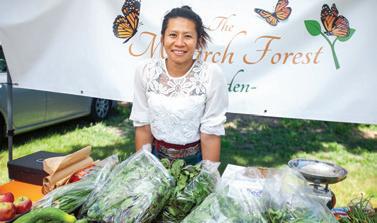
true Thai tastes are rare. Though Chicago abounds with Southeast Asian restaurants, finding an authentic pad see ew can still be as challenging as meeting fellow Thai people. Menus are fit for American palates: more sweet than savory, more mild than spicy.
“Here they can get what they used to use before, so it brings them back to their own country, like a little Thai in the U.S,” says Schembari, who has a stand selling Asian veggies from the Monarch Forest Garden, her one-acre farm in Woodstock. “I’m lonely here. But when I go to the market, we talk Thai language, we see Thai food, we eat Thai food, we buy Thai stu . It’s more happy.”
Wearing a sticker that reads, “I just got vaccinated,” Patrick McIntyre, Ratanawong’s husband, tells me he came straight to the farmers’ market from getting his second dose of vaccine. He had waited until July, thinking the Thai government might require tourists to be inoculated before entering the country. “I wanted to wait to see if some other people fall first,” he jokes. “But I really want to go back to Thailand.”
“We’ve made a couple of friends around here,” he adds. “We come mainly for my wife to be able to have some people in contact with her.”
The couple married last October, and Ratanawong, who recently got a job at a Thai restaurant near Tinley Park, lives in the U.S. on a K-1 visa. “You land from Thailand here, then you’ve got 90 days to get married,” McIntyre explains. “You either get married or you’ve got to pack your shit and go back to Thailand.”
Ratanawong shows me photos of her family, who live thousands of miles away in the northern Thai countryside. Handing over a bag of steamed sticky rice, she says I remind her of her oldest daughter, who’s the same age. Though Ratanawong calls them every morning, it’s been nearly two years since she’s seen her mom and daughters, and with COVID19 restrictions tightening in Thailand, their reunion likely won’t come anytime soon.
Until this summer, Thailand had managed to contain the virus, avoiding much of the fallout other countries, like the U.S. and China, faced last year. But now, with more than half of Americans vaccinated, the situation has
reversed. In Thailand, a vaccine shortage has resulted in just 6 percent of the population being fully inoculated, and the record for daily COVID cases inches higher each day.
At the market, a petite woman guards the entrance, chasing down kids not adhering to the guidelines. Masks have always been required—vaccinated or not.
Ratanawong assures her family that the Thai government can handle the pandemic, perhaps even better than the U.S. If those living in America could get through it, she says, then Thailand could too.
Richard Hanviriyapunt, a financial advisor at the chamber and owner of Thai Twin, recalls COVID’s initial impact on Thai restaurants in Illinois. He says many Thai immigrants were left without jobs as businesses began to shutter.
“The new generation who have restaurants are still students—some of them successful, some of them not so successful,” he says. “They realize there’s a lot of cash flow, but there’s no saving money. That’s why I have to educate them, I have to share my experience and tell them how to save. The businesses right now have a problem, so that’s why I have the market to help them.”
Last year, the Monarch Forest had already been using Thai Twin as a meeting point for pick-up orders, and many Thai social media storefronts began popping up in the Chicago area. Schembari wondered if a few of her friends would join in to make orders more convenient and safer for customers.



After consulting the chamber, she invited one friend, who invited another, who invited another. So many people expressed interest that it only seemed natural to call it a market. As the organization realized its potential for Thais to earn extra cash, Schembari set up a chat dedicated to advertising and coordinat-
ing the event on the popular Thai messaging app LINE. Later, she’d start a Facebook group for the market, which has grown to nearly 1,000 members.
On the morning of the debut, heavy rains sent vendors without tents packing, many of them at-home chefs and online business owners unprepared to weather the storm. Still, swaths of customers arrived, stocking up on Thai meals and goodies to eat while sheltering at home.
Schembari hadn’t expected such high turnout, especially considering the weather. She figures people were already traveling from outside the city—too late to turn around, perhaps not enough to keep them away from the products they’d been longing for.

Now in its second year, the market has worked out most of the kinks. “We’re learning on the fly,” says chamber codirector Tham Chaiket. “Getting people together was tough, but now that we’re getting experience, we’ve made sure it’s run smoother and safer.”
“Slowly but firmly,” Schembari chimes in. They hope to eventually expand the event, making it more open to the public, but the chamber and its vendors are still figuring out how to best manage the private gathering. More volunteers now provide tra c control, and the chamber o ers free supplies to vendors, including tents and tables. “We don’t charge them anything,” Schembari says. “They just come and make the product the best that they can do, and then we help along the way. I like to give people the space and opportunity to do that.”
“Money is not that important when you get to the hard times,” she adds. “We help each other—that’s more important.”




For the past three years, she’s kept herself


busy learning to cultivate different organic plants at her farm, as part of a compromise with her husband.
“He doesn’t really want to move to Thailand,” Schembari explains. “He’s a Westerner, he was born here.” In place of returning to southeast Asia, they moved to a bigger house away from the city, purchasing a stretch of land in the country. Though she began her business with no experience in farming, the garden has become a sanctuary and a reminder of her childhood.
Scehmbari often thinks back to her days growing up in a small Thai suburb. Her grandpa never seemed to leave the backyard. She’s certain of this because he’d always make her water the grounds as a chore. “I don’t like the garden in that moment,” she says, laughing.
“He just went to the garden every day and grew everything. When I grew up, I realized I didn’t have to go to the market. I have everything in the backyard of my home,” Schembari recalls. “Everything that he grew when I was young: mangoes, bananas, coconuts.”
Five years after Schembari moved overseas, her grandfather passed away. “I didn’t have the chance to go back to his funeral,” she says. “I’m still sad about that.”
The garden brings her closer to him. When she first dug her fingers into the soil, she felt chills. “I feel it,” she tells me. “I feel like he’s right here. From that moment, I just grow. Keep growing. And I was happy.”
Among the dozen tents, Ravadee Inphom sells handcrafted soaps infused with Thai herbs, while a mother-daughter duo fries sweet Thai bananas. Many o er premade meals, snacks, and cold beverages sold exclusively at the market.
Some have been in the food business for a while: Saifon Powell, a trained culinary chef,
runs Chef Kim’s from her home in Warrenville. Tee Sutapa and Nipaporn Khajornkham, owners of online store Saweedus, feature meals from the northern and southern regions of Thailand. Another vendor, Max Bounyavong, second-generation owner of Lai Thai in Morton Grove, cooks his mom’s family recipes. Other stalls, like the Instagram storefront Gray Basic Cafe, are more experimental ventures.
Chatsaran “Jujue” Karnchanaudomporn, the 29-year-old architectural-interior designer who manages the virtual cafe, perfected her recipes at home throughout the pandemic. The brand is influenced by the trendy After You dessert cafe in Bangkok, and the Gray Basic aesthetic is an ode to “cafe hopping,” one of Jujue’s favorite activities during her yearly visits overseas. On Instagram and at local Thai groceries around the city, she and Noppanun “Pai” Saensuk sell fresh juices, milk teas, and pastries, including sweet bread toasts and pineapple tarts.
Young owners like Jujue and Pai bring hope to Hanviriyapunt, who provides the space at the market. He sees their entrepreneurship as an opportunity—a way to ensure the Thai community stays alive as older generations age.
“Some people still do Thai traditional dress when they come here. They still say ‘sawasdee ka,’” Hanviriyapunt says. “It doesn’t matter where you are. You’re still Thai.”
He hopes the market will teach others what he hadn’t learned growing up in America: to embrace being Thai.
“There is no culture like us,” he says. “To keep that culture, we should be proud of it. We have to belong to it and identify ourselves to be Thai. We have language, we have dress, we have food to be proud of.” v
@_kaylahuynh
100% of Profits go toward Homelessness prevention and assistance programs in Illinois.
which helped him get into the business, too. At the northeastern corner of the store— flanked by the potato stand, a burgeoning vegan section, Mexican cheeses, cooler shelves of beef, and an aisle of Georgian wine—is another point of pride for Basa: the pizza station. (Lest you have negative thoughts about grocery-store pizza, I can personally vouch for its delicate thin crust, excellent seasoning, and generous toppings.) The takeaway pizza is returning from a pandemic hiatus soon, and the Iraqi baker in charge of this station will also add pastries to the fresh pita and zaatar bread she bakes here. “Trust me, it’s gonna be amazing,” Basa says.
INTERNATIONAL DELIGHTS
The perfect grocery store does exist.
By MAYA DUKMASOVA“One, two, three, four, five, six, seven, eight, nine . . . they have nine different types of feta. Yeah. It’s a place called Devon Market.”

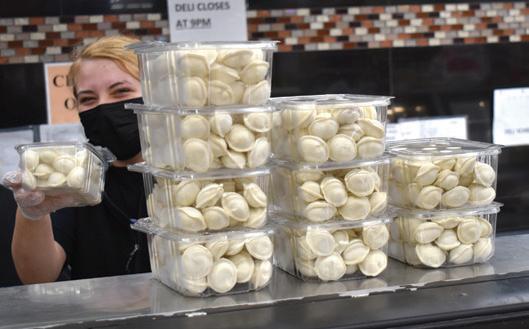
The tall, white, American man drifted in front of the deli counter. If his euphoric expression and phone conversation hadn’t given him away as a first-timer, his massive, empty cart definitely did. Only a rookie would bother with a full-sized cart at Devon Market. Those familiar with the densely packed, winding aisles of the Rogers Park grocery store know that it’s better to stay nimble with a basket.
Devon Market is situated at the northeast corner of Devon and Greenview Avenues. Since 2000 its owner Shaul Basa, an Israeli immigrant of Iraqi heritage, has provided fresh produce, meat, dairy, and dry goods from all over the world to the international, integrated community that defines this part of the city. To enter through Devon Market’s doors is to enter America at its best.
Past a mural depicting Basa’s wife as a blonde mermaid riding a shrimp and giant
containers filled with lush petunias, a covered outdoor vestibule is a staging area for everything Basa is o ering at deep discounts. The inventory changes daily—ripe papayas and cabbage, pickled peppers from Ukraine, Turkish marshmallows, Spanish cookies, light bulbs, mineral water. Basa says he purposefully overstocks items to put on super sale. Last week, high-end Russian sunflower seeds that are supposed to retail at $7.99 per bag were on o er for $1.99. After the overstocked items are gone, Basa puts out a di erent pallet of unexpected delights.
The mouth of Devon Market is also home to a small ecosystem of symbiotic entrepreneurs—a cast of panhandlers; a Mexican woman selling outstanding tamales from a small cooler; a few elderly musicians from former Yugoslavia who pump out folk melodies on accordions and guitars. The musicians just started showing up in the parking lot last summer and when it got colder Basa invited them to set up under the awning.
Past this busy entryway and some automatic
doors, the 27,000-square-foot hive of the store opens up in its full magnificence. First, coolers of European and Middle Eastern pastries all made in-house, then every imaginable packaged sausage and salami, shelves of pickled herring, mozzarella cheese, beer, Turkish yogurt. The produce section is filled with all the universal basics but also staples of Central American and West African cuisine. Basa, 54, is particularly proud of his fruit selection. When he was growing up in a poor part of Tel-Aviv with five siblings his family struggled—his mom couldn’t work and his father, who was sick through much of Basa’s childhood, died when he was 16. Basa had to support the family from a young age and always dreamed of being able to a ord the fruit that tempted him from the carts in the street. His dream was to own a fruit shop long before a cousin of his immigrated to America and started a grocery,
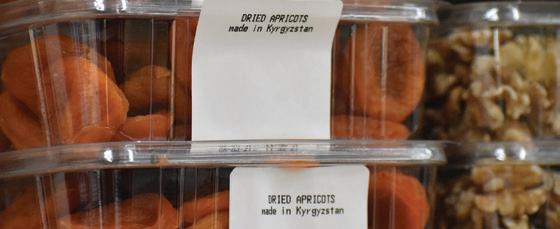
Since the onset of the pandemic, as grocery shopping has become both the most stimulating and stressful part of life, Devon Market has provided thrills and reassurances. In the early spring of 2020 it was the only place in the neighborhood reliably stocked with toilet paper, hand sanitizer, pasta, and masks. “I saw it coming, I saw what’s happening in Europe and in my country,” Basa explained, “I knew what they are short with so I bought a lot.”
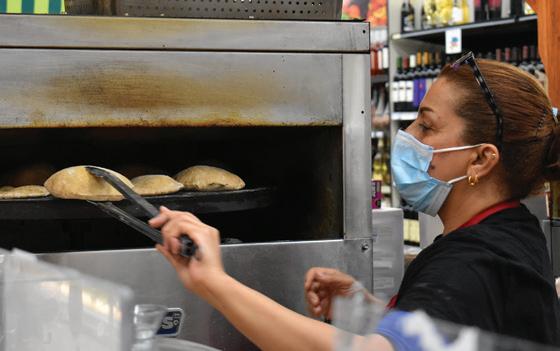
Basa quickly adjusted to the demands of a new era—Devon Market started offering online shopping and home delivery, expanded senior shopping hours, and handed out gloves. On their Instagram page they shared mesmerizing videos of disinfection specialists in white jumpsuits spraying down every surface of the store set to the pulse of immersive techno.
Basa says their business didn’t suffer over the last year-and-ahalf. A few workers got sick but all returned eventually. He’s not struggling with a labor shortage. About 80 people work at the store, at least 30 of whom have been there more than ten years. Some of the sta have been with Basa since he opened.
“This is the best boss in the world, number one,” Emina, a young Bosnian baker says, pointing to Basa as he shows me the narrow back kitchen where she’s preparing a cake made of chocolate sponge layered with raspberry and white cream filling. She’s worked for Basa for five years and says she loves the atmosphere among the staff. “We are like friends you know, like a family.” Basa lets his
cooks and bakers develop their own recipes and doesn’t mind the kitchens turning into a dance party. “I don’t like to choke the people, I like to let them do whatever,” Basa says with a shrug.
Basa is soft-spoken and measured but warm, with a clean-shaven face, a perfect coif of silver hair, and a taste for polo shirts and leather jewelry. He’s not a man who raises his voice, even when he’s haggling with a supplier in the eagle’s nest of an office perched high above the liquor counter. Up there, with the expanse of the store visible like a dollhouse with the roof removed, Basa and a few women who do accounting and other administrative work sit on high-backed leather chairs strewn with cozy throws and pillows. He asks their opinions when vendors come in o ering new products.
Organic meat is about the only thing missing from Devon Market. Though there’s a small selection of organic chicken, Basa says stocking organic meat is a big expense (perhaps even a risk given the affordability needs of the neighborhood). But he’s always considering new options. Basa’s retail philosophy seems to be to try anything once. When a vendor brings him neon green roses encased in water-filled glass orbs, he puts a few on the shelf next to the date-paste cookies and prices them at $16.99. To his own surprise, the “rose bowls” sell. When a longtime customer tells him he needs to stock Brown Cow yogurt, he promises to look into it. This is how, over time, Devon Market’s shelves have acquired an endless variety of Baltic oil-preserved fish, pickled vegetables, Ukrainian arthritis ointments, olives, and chocolate. The layout and organization of the products is loosely logical (there’s an aisle for dry legumes and canned items common in Latin American cuisine, a section for Southeast Asian products, a baking aisle), but as you navigate the store you have to think regionally, not just categorically. Not all the jams and preserves are in the same place—the Smucker’s and Bonne Maman brands aren’t next-door neighbors with the Polish black currant jellies; Persian teas are not in the same place as Lipton. Sometimes, though, you just have to search carefully and systematically.
“If you ask me if everything makes sense over here,” Basa says with a chuckle, “no. I won’t lie to you.” As we wind through the store past the rotisserie chicken station, and Slovenian bakeware, the cooler of frozen pelmeni dumplings shipped from Russia, and shelves upon shelves of spices, Basa points to particular points of pride. He shows off the
fish counter and fresh peanut butter grinder, the Ethiopian co ee, housemade hummus and the bagged sumac and cardamom. The crown jewel of the store is aisle seven, home of many varieties of ajvar (Serbian-style red pepper spread), honey, fish pates, herbal tea, and Five Roses-brand flour from Canada, whose higher protein content is crucial for Eastern European baking.
Access to healthy food continues to be a persistent inequity in Chicago. One of the features of the segregated city is that some neighborhoods are food deserts while others are oases for grocery shopping. Rogers Park has a thriving independently owned grocery scene, but if you ask the locals, Devon Market is at the top of the food chain. It’s not just because of what you can buy there, or the a ordable prices—it’s also just the good vibes. Whether you run into a friend in the cereal aisle, or spy an enemy in the checkout line, Devon Market is a hub for familiar faces. It’s the kind of place where you can always count on hearing your favorite Fleetwood Mac song.
“You feel so at home over there you leave your car with the key in the ignition,” one neighbor told me a while back. “You’re cool there, nothing bad is gonna happen to you. Or your car.”
“When I think of why I enjoy living here, Devon Market factors,” a recent transplant to Rogers Park said. “It’s peaceful.”
A friend recently had a houseguest whom she sent over to do some shopping. When he returned “he was like ‘Devon Market?! Divine market!’”
On my way out of the store last week I stopped to chat with a few customers. A Black woman in her 40s who lives around the corner said she likes to shop here because of the quality of the produce. A middle-aged Lithuanian man said he’d been coming since Basa first opened because it’s the only place that stocks the products from his home. I also met Kale, 26, who only recently moved to the neighborhood and had just emerged from their first experience at Devon Market.
“I actually went to Jewel earlier and just felt really gross,” they said. They found the atmosphere, prices, and quality of the products here much more appealing. “I moved to Rogers Park because of the community,” they said. “I loved being able to hear people speaking in their own languages. I had a great interaction with some of the staff.” Devon Market had clearly won another loyal customer. v @mdoukmas
PAID SPONSORED CONTENT
National Expungement Works: Emancipating justice-impacted communities that have been exploited by systemic inequities
Q:Thank you for taking the time to chat with us. Is it true that National Expungement Works is the group of brilliant minds that made National Expungement Week a landmark event across the country?
LaTorie Marshall: Thank you so much for your interest and support of our work! National Expungement Works (N.E.W.) is the creator of the annual week known throughout the country and internationally for legal relief and transformative services: National Expungement Week. As the healing processes that we o er have always extended beyond seven days, our name evolved to National Expungement Works to fully reflect the continuous nature of our service to justice-impacted communities exploited by systemic inequities. Therefore, National Expungement Week, a project of our organization, also evolved into the N.E.W. Week of Action and Awareness. Our call to action raises the public’s awareness of the importance of legal relief in restoring pathways for generational wealth and healing. This year, our Week of Action and Awareness will take place from September 26 through October 3.

Q: Why did you choose to make expungement the cornerstone of your mission? What impact do you hope to achieve?
LM: Our mission at N.E.W. is to emancipate justice-impacted communities that have been exploited by systemic inequities. It is estimated that there are about 48,000 legal and socioeconomic barriers restricting people with an arrest or conviction on their record. These barriers prevent access to the most basic of human rights, impacting education, housing, voting, employment, and governmental services. Expungement and other forms of legal relief, including record-sealing and even the payment of some fines could instantly mitigate the impact of these barriers for over 70 million people across the country.
Q: What expungement services and programs does N.E.W. o er? Any new programs in the works?
LM: Besides being an access point for expungement and legal relief, N.E.W. o ers many wraparound services to restore rights and uplift communities, including employment resources, voter registration, and health screenings. New this year, and throughout the 2021 Week of Action and Awareness, we will also feature programming reflective of our organization’s seven core principles - healing, solidarity, creation, ascension, education, legacy, and fellowship.
Q: How can people take advantage of the expungement and record-sealing services you provide? Is there a cost?
LM:
LM: Record clearance laws and policies
di er significantly, state by state—sometimes even county by county. Therefore, for our events, it is essential to review the information distributed by N.E.W. and from our website (newxnow.org) and social media platforms to determine the kind of legal relief that may be available, whether pre-registration is necessary, and what supporting documents (LiveScan, photo ID, etc.) might be needed. Through the generosity of our benevolent partners, such as Green Thumb Industries, we can cover most costs for services such as fingerprinting and fines that would prevent people from embarking upon the expungement or record-sealing process. Although we address many of the injustices caused by our nation’s failed drug war, we are not cannabis-specific. Anyone in need of expungement or record-sealing processing, education, or other supporting services is welcome at N.E.W. Week of Action and Awareness events.
Q: What should we expect for National Expungement Week 2021?
LM: Since 2018, N.E.W. has generated tangible results in the lives of over 1,600 people who have begun the expungement process through their online and in-person gatherings. In addition, over 7,000 have received wraparound services such as voter registration, job support, health screenings, and assistance with housing and food insecurity, and 950 have had fines reduced or cleared. This year, N.E.W. aims to increase the number of participating cities, and we are exploring opportunities to make expungement and record-clearing/sealing more accessible virtually.

Q: How can individuals and organizations like Green Thumb support your important mission?
LM: We rely on the generosity of individuals and benevolent partner organizations like Green Thumb Industries for the resources to help us continue our mission and expand our reach. In addition, we invite strategic partnerships with other nonprofit organizations, municipalities, legal services providers, and others who want to do this work. Finally, we invite anyone interested to visit our website at newxnow.org to learn how to volunteer with us, donate, or become a benevolent partner through sponsorship. This

is a sponsored content series, paid for by Green Thumb Industries. Submit YOUR questions about expungement and record-sealing in Illinois to socialequity@gtigrows.com.FIND THESE RESOURCES AND THE REST OF THE EXPUNGEMENT SERIES ONLINE AT CHICAGOREADER COM/GROWINGFORGOOD Featuring LaTorie Marshall, visionary and founder, National Expungement Works
Torres. Made out of adobe bricks from the garden’s dirt, the monument is an homage to Mesoamerican tradition and ritual, a place for the community to burn incense and have space to grieve, a necessity in a time of so much loss. Torres wasn’t even a garden member when she proposed the project, but says leadership was supportive of her vision from the start.
The beekeeping station has also grown through the investment of volunteers. The current project leaders, Noah Frazier and Matthias Lampe, had no experience with beekeeping when they started.
“I wouldn’t have even thought that I would ever do that, and now we teach 15 people here in the beekeeping program,” Lampe says. “The engagement of people here is really incredible.”
In the permaculture site at El Paseo Community Garden, seven layers of plants grow in a harmonious, planned ecosystem. Wild strawberries flourish at the foot of fruit trees, out of direct sunlight. Comfrey grows near herbs and berries, bringing nitrogen and phosphorus to the soil, acting as a sort of natural fertilizer to neighboring plants. A natural depression in the earth is host to swamp hibiscus, a wetland flower that can make use of the excess water that collects, while at the same time providing nourishment to bees, hummingbirds, beetles, and other pollinators. The holistic permaculture food forest models the way the members of El Paseo work together to grow both food and community.
The garden was founded as Growing Station by a group of community members in 2009. Initially bordering an active railroad, it included just a few garden plots along 21st Street, but has gradually expanded over the
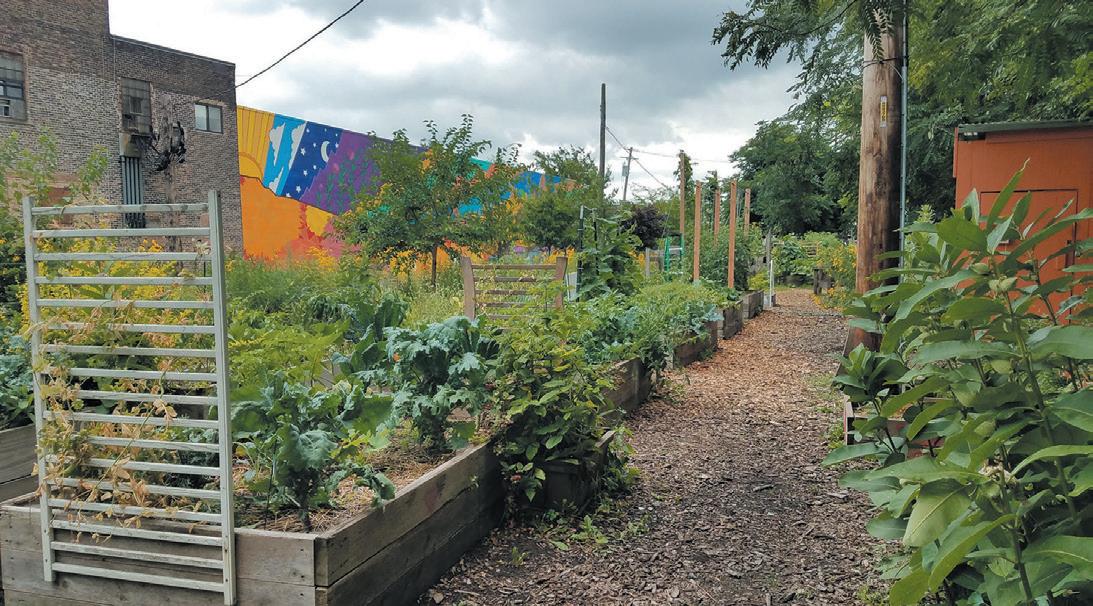
years to encompass the entire block from 21st to Cullerton. In 2015, Paula and Antonio Acevedo took over as garden leaders and have been responsible for much of the garden’s expansion over the years. Each major project area has its own committee and leader, which this year includes a farm plot, collective garden beds, allotted garden beds, a senior program, beekeeping, the permaculture site, wellness programming, a prairie, and a group planning a dog run in a newly acquired adjacent lot. Every position is done on a volunteer basis.
“It’s a really beautiful thing to see, how it’s growing organically,” Paula says. “When we’re growing, it’s really because the capacity is growing as well.”
During the warmer months, El Paseo has free programming nearly every day, from yoga to drawing and meditation classes to flamenco dancing. Sundays are public stewardship days, where anyone can come and work on garden
projects or do regular maintenance work, like weeding. On a recent Sunday, more than a dozen volunteers were at work on various projects: one group was painting a new educational sign about the beekeeping station, another was laying a flagstone path in the permaculture forest. Paula notes that there has been an influx of interest in the garden and its programming in the past year.
“The pandemic has really highlighted the need for all of these programs in outdoor space,” she says.
The growth of the garden, which is formally owned and managed by land trust nonprofit NeighborSpace, is a testament to the dedication of its members. As many volunteers told me, Paula and Antonio are very receptive to new projects or ideas, so long as they align with the garden’s mission and are accessible to the community. One of the newest projects is “Xochiotia,” an earthen monument by Marcela
Lampe’s experience echoes what Paula says is one of the garden’s greatest strengths: fostering community leadership. “Community garden leaders throughout, they can all vouch that the most challenging part is growing the people. Not the plants, not anything, it’s all about growing people,” Paula says. “That’s what these spaces really are.”
El Paseo is a space where Pilsen residents can learn to grow their own food, or even harvest a bounty from the community beds or the permaculture forest: from tomatillos to swiss chard to basil. But for the garden’s leaders, the growth of the members is the most rewarding part.
“It’s really great to see that, it’s kind of like an incubator space,” Paula says. “Although we call ourselves a community garden, typically when you see community gardens, they’re fenced in plots that are more like gardening clubs. We really are an outdoor community center. We’re trying to create an example of what these green spaces can be.”
Abby Wagner just got involved in the garden this year, but already grows food there and is also leading kids programming this season. She likens the El Paseo community to a family. “It’s really special,” she says of the garden, looking out at the verdant farm plot that is new this year. “We were just planting seeds, I guess it was two months ago, and now everything is so lush.” v @booksnotboys
Fresh Moves makes three stops a day, Monday through Friday, in neighborhoods on the south and west sides.
ured out how to fundraise and expand by ten sites during the pandemic.”
Fresh Moves stops at three locations per day Mondays through Fridays, spending about two hours at each site—places like Claretian Associates in South Chicago, Trina Davila in Humboldt Park, and multiple Howard Brown Health clinics. And demand is high: Sims said the Fresh Moves customer base has tripled in the last four years. An auxiliary van—a mobile stock room of sorts—follows the bus to each site, filled with crates of peppers, tomatoes, eggplants, onions for sta members to replenish the shelves. From what I observed at the Boxville stop, it’s a continuous process.
The Urban Growers Collective initiative targets the city’s south and west sides.
By SHARON HOYERThursday afternoons at the 51st Street Green Line el Station you’ll find a colorful scene: A large shuttle bus wrapped in a bright photo collage of fruits, veggies, and beaming faces, parks at the curb of Boxville, a shipping container village of 20 hyper-local small businesses. This is the last of three stops that day for the Fresh Moves Mobile Market, a produce store on wheels originally conceived by urban agriculture nonprofit Growing Power to alleviate food insecurity on the south and west sides. Growing Power dissolved in 2017, but the bus rolls on under the Urban Growers Collective, former Growing Power Chicago director Erika Allen’s ambitious new food justice organization.
About ten people were standing in line outside the Fresh Moves Market on the hot hazy afternoon I visited, masked and spaced and patiently waiting their turn to board and shop the one aisle of fruits, vegetables, and smattering of packaged goods—most of which are produced by farms in the city limits. Laurell Sims, cofounder of UGC, said the market purchases a few out-of-season and out-of-climate options—bananas, avocados—from Midwest Foods so shoppers can find most of the fresh
ingredients they need. But the bulk of the array, tidily displayed on rows of raked wire shelving, is grown at one of UGC’s eight farms or from participants in their Farmers for Chicago incubation program, which provides training for aspiring BIPOC growers.
Sims said that by growing the food themselves, UGC is able to keep costs to customers low. The Fresh Moves market also accepts Link Match double-value coupons and has been offering $10 vouchers throughout the pandemic, an option Sims hopes to extend through the end of the year.
Keeping prices low is, of course, a central concern. Food insecurity across Chicago’s south and west sides—whether you call the multitude of grocery-less neighborhoods deserts or, more aptly, the product of apartheid—only worsened during the pandemic.
UGC shifted their focus to emergency relief, using the Fresh Moves bus as one of several methods to transport over a million pounds of food to people in need. UGC uses the bus to distribute USDA food boxes, anywhere from 200 to 500 boxes per day. “Folks appreciated the bus was consistent,” Sims said. “A lot of businesses had to shut down in COVID. We fig-

Sims said UGC would like to deploy a second bus dedicated solely to the west side once the organization completes their Green Era Campus—a nine-acre development encompassing a farm, teaching kitchen, farm stand, and compost-producing anaerobic digester—which is slated to open in Auburn Gresham in the spring. For now, the organization is struggling to grow enough produce to meet the current demand.
Most of the Fresh Moves stops are health centers and churches, charitable organizations connected to and serving populations in need. But I was particularly interested in visiting the Boxville stop because of the mini-city-center vibrancy it’s established at 51st and Calumet Avenue. Fresh Moves shoppers can browse the brightly painted micro-storefronts of a custom apparel shop, a wellness boutique, or what Sandria Washington, Boxville’s director of engagement, told me is, somewhat incredibly, the first running store on the south side. Folks can pick up a snack at Conscious Plates, the vegan/alkaline restaurant or (if they’re like me) The Hot Dog Box. UGC even has a shop in half of one box to vend dried medicinal herbs and teas grown and packaged by the kids in their job training program. As I waited in line, I saw an older woman get a bit of free bike maintenance advice from a young employee of the Bike Box, the Boxville business that started it all. Visitors can wander across the street to the Bronzeville community garden and admire the mural on the wall backing beds of chard, echinacea, and collard greens. It’s a welcoming place where two ingenious solutions to deeply entrenched inequities—one on wheels, one adapted from transportation—meet to create an atmosphere of optimism and promise. v



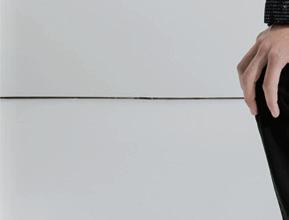





Along with Chicago’s many beaches and tons of interesting things to do—plus the fact it’s relatively cheap to live here and generally fairly easy to get around without a car—our city’s diverse, a ordable, and appetizing eating scene is one of the main things that makes this a terrific place to live.
I first came up with the concept for the Iconic Chicago Restaurants Map a couple years ago as a love letter to the hospitality industry, and to highlight the fact that all parts of town are worth visiting. The idea was to pick a top eatery in each of the city’s 77 officially designated community areas, along with a few runners-up: delicious destinations that reflect the local culture.
I was shooting for longtime (20-plus years), non-expensive (entrees costing $20 or less), and overall excellent eating spots, bending the rules where necessary. For example, in communities with few independent restaurants I was willing to include newer spots, and I wanted to showcase a mix of eateries that mirrors Chicago’s ethnic and culinary diversity.
After posting requests on Twitter and Facebook for input on each community, I got enthusiastic recommendations from hundreds of people, ranging from anonymous foodies to aldermen. Thanks to all of you who responded.
In my 30-plus years in Chicago, I’ve lived in many parts of town, from Woodlawn to Bridgeport to Humboldt Park to Rogers Park, and my jobs as a bike messenger, urban planner, and reporter have taken me to every corner of the city. So I had lots of opinions of my own.
But I’m not a restaurant expert by trade, so I ran a rough draft of my list by a number of distinguished food writers and other journalists,
dining industry veterans, and seasoned civilian restaurant explorers, including Michael Alarcon, Ines Bellina, Monica Eng, Michael Gebert, Cheryl V. Jackson, Jeremy Joyce, James Porter, Anjulie Rao, Titus Ruscitti, and sommelier and food historian Richard Tan. Their feedback was a huge help.
Reader food critic Mike Sula o ered some particularly helpful wisdom: No matter how carefully I tried to select the top eateries, not everyone would be happy with my choices. “Like any list, I’m sure it will piss some people o .”
I’d made good progress by March 2020 when COVID-19 hit Chicago. It seemed unwise, and maybe inappropriate, to publish a restaurant map when it wasn’t clear how many of these establishments would survive the crisis, so I back-burnered the project. But this spring after vaccinations became widespread and relatively safe indoor dining was possible again, it appeared to be a good time to finish the job. Obviously the pandemic has been an extremely stressful time for restaurant workers and owners, with exposure risks, constantly shifting safety protocols, reduced revenue, and layoffs. Even now, labor shortages are a major challenge, and with Delta variant hospitalizations on the rise among the unvaccinated, there are fears of yet another lockdown. But hopefully this map will bring more business to some of Chicago’s undersung eateries, doing a little bit to help them weather the storm.
I’ve identified worthwhile independent restaurants in 75 of the 77 community areas. But the tiny, triangular Burnside neighborhood on the southeast side lacks brick-andmortar eateries. According to Eighth Ward
sta er Alvin Rider, that’s due to the area mostly being zoned for residential and industrial uses. However, a branch of Huddle House, a Wa e House competitor, is slated to open this September just east of Burnside at 95th and Stony Island in Calumet Heights.
The far south side community area Riverdale, which includes the Altgeld Gardens housing project, also lacks restaurants. But neighborhood advocate Fatimah Harris says getting one is low on her priority list. “We are a food and transportation desert. Our only grocery store, Rosebud Farms, closed a few years ago. What we’re really promoting is fresh food, health, and wellness.” One such initiative in the area is a monthly pop-up with a fresh produce truck. The situation in Riverdale is a reality check for those of us who can take for granted easy access to supermarkets, let alone restaurants.
The Iconic Chicago Restaurants Map exists in a couple different formats. Along with a map beautifully illustrated by Steve Shanabruch showing the locations of the 75 top picks, I’ve created a Google Map that also includes up to four runners-up in each community. View the Google Map at tinyurl.com/ IconicChicagoRestaurantsMap.
Check out the version of this article on the Reader website for brief descriptions of the 75 top restaurants and links to previous Reader coverage of them, plus the runners-up for each community area. Did I overlook any hidden gems in your community, or have any of these places closed since the map was published? Feel free to tweet feedback to me at @greenfieldjohn. Bon Appétit! v @greenfieldjohn
The fundraiser turns 30 at a time of increased need.
By IRENE HSIAODance For Life, presented by Chicago Dancers United, celebrates its 30th year of bringing Chicago dancers together to raise money for The Dancers’ Fund with a performance on August 26 featuring ten dance companies and a new work by Randy Duncan. Founded in 1991 in response to the AIDS crisis by Keith Elliott, a dancer with Joseph Holmes Chicago Dance Theatre, with Todd Kiech, Harriet Ross, Danny Kopelson, and Gail Kalver, Dance for Life and the Dancers’ Fund offer financial aid for dancers with critical health-care needs. Last year, the fundraiser shifted online with a series of videos from past performances and continued its tradition of an annual premiere with the presentation of a dance for camera for 23 dancers choreographed by Hanna Brictson. This year, for the first time, the event takes place outdoors at Pritzker Pavilion in Millennium Park—and
admission for the general public is free, with reserved seating for those donating $300 or more to the fund.
“This year, it’s about celebrating our 30th anniversary and being part of the dance community, being supported by and being able to support the dance community for 30 years,”
Thu 8/26, 6 PM, Pritzker Pavilion, 201 E. Randolph, chicagodancersunited. org, free (premium reserved seating available for $ 300 donation)
says Mark Ferguson Gomez, one of the cochairs of the event. From over 30 submissions from dance companies in the city, Ferguson Gomez and others on the committee selected works by Hubbard Street Dance Chicago, Joffrey Ballet, Giordano Dance Chicago, DanceWorks Chicago, Movement Revolution Dance
Crew, PARA.MAR Dance Theatre, South Chicago Dance Theatre, Trinity Irish Dance Company, Visceral Dance Chicago, and a film by Winifred Haun & Dancers. “Our general criteria are that we like group pieces—we want the stage to be as full as it can be. We like for [works] to be uplifting, happy—we’re looking for lively, upbeat, celebration.” For some companies, including Hubbard Street and the Jo rey, the event also marks a return to the stage for the first in-person performances since 2020.
Formerly a dancer with Giordano Dance Chicago, Joseph Holmes, and River North Dance Chicago and a Chicago resident for 40 years, Ferguson Gomez has fond memories of the solidarity and camaraderie he experienced while performing in the event. “I always believed in the community of dancers,” he says. “To be backstage, seeing all the different dance companies backstage watching each other and
supporting each other, there’s nothing like it. It’s magic. That’s always been my experience in the dance community. Everybody wants everybody to do well.”
That spirit of generosity continues to characterize an event where performers and companies donate their time and talent for the cause. “Everybody is so willing to be part of it, so willing to do their share. Everybody works together to create this event,” he says. “The artists give their time for the evening performance. The companies generously provide the rehearsal time that the dancers need. It’s giving on many levels.”
In a year of heightened health-care concerns and financial anxiety for many dancers, Chicago Dancers United has increased opportunities for dancers to receive grants for critical costs. “During the pandemic, we set aside special monies to help the dance community in this time of need,” says Ferguson Gomez. People for whom a primary source of income is derived from dance—including instructors, technicians, and administrators—can apply online at Chicago Dancers United for the fund, which covers bills related to medical care, mental wellness, dental fees, insurance premiums, and other health-care-related costs. The existing Critical Health Need Grant, limited to $4,000 annually, is now supplemented with the General Health and Wellness grant, limited to $500 annually. The website for the fund notes, “Awarded applicants will not receive any payments directly. The Dancers’ Fund will pay the healthcare provider, utility provider, landlord, or other appropriate vendor(s) for the incurred and approved expenses on behalf of the awarded applicant.”
Chicago Dancers United board member Sandi Cooksey notes, “There was a 111% increase, from 2019 to 2020, in the number of grants awarded.”
“We would like for more people to apply that need money,” says Ferguson Gomez. “One hundred percent of the people who qualified for the grants were paid. We’ll continue to provide assistance to the dance community, as long as we’re in this pandemic and there’s a need for it. There is money available if you need help.”
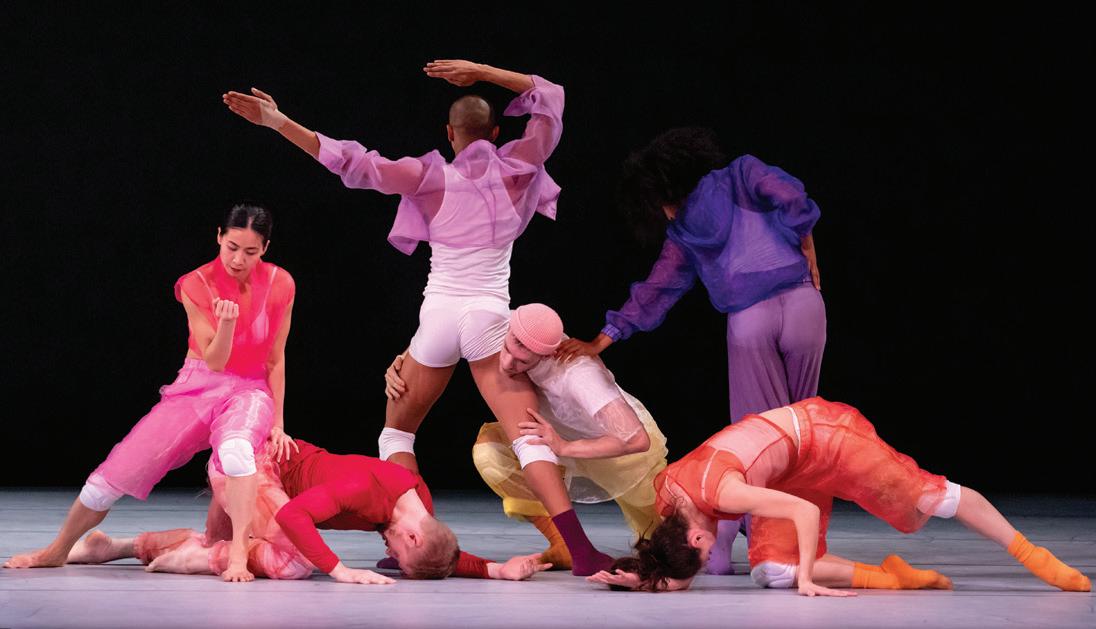
ABBA’s hits tell the hilarious story of a daughter’s quest to discover the identity of her father, bringing three men from her mother’s past back to the Greek island paradise they last visited 20 years ago.




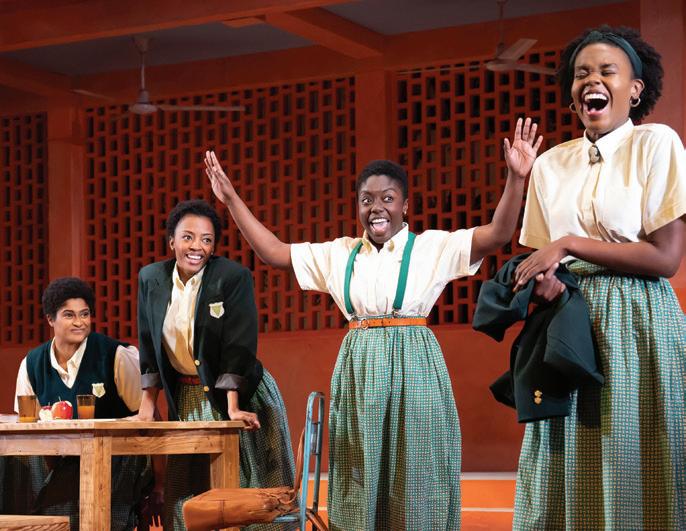
MAMMA MIA! is fun for the entire family, and folks 25 and under get tickets for 50% off!



AUG. 19 - 29, 2021


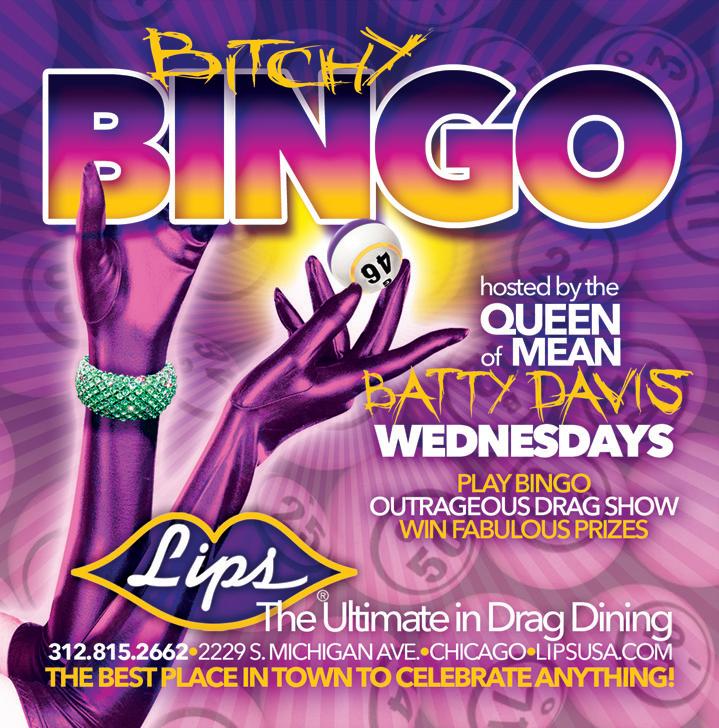





In 2019, Theatre Y presented The Camino Project , an engaging five-hour miniature pilgrimage through Bucktown and Humboldt Park featuring experiential pieces intermingling dance, theater, and performance art. The adventure culminated in a group meal with audience members and actors breaking bread. It was a delightful experience and an ambitious endeavor having actors guiding guests through a variety of “happenings” inspired by the ensemble’s 2017 journey along Spain’s Camino de Santiago, a 500-mile pilgrimage route dating back over a thousand years.

This year, however, Theatre Y has flipped the script. Like many arts organizations, the pandemic has given them the opportunity to reevaluate their priorities, as well as relocate, and to completely recraft The Camino Project “As a free theater, what were we doing in Lincoln Square providing free theater for people who could have paid for their ticket?” asks artistic director Melissa Lorraine.
This epiphany led them to start the process of relocating to North Lawndale and has helped them absorb other realizations in the past year and a half. The most salient lesson from the pandemic, Lorraine says, was that people on Zoom don’t make eye contact. So even with audience members and performers in masks, she says, “at the very least, there’s still eye contact. Suddenly eye contact became this extraordinary gift, this thing that we’ve been deprived of for over a year; eye contact is kind of the height of intimacy in some ways.”
However, watching footage of the 2019 show, Lorraine noticed a section where she
was touching everyone’s faces. She realized with sadness that it was like seeing a dream, something that would never happen again. The most encouraging thing she learned, though, was that as a free theater they were set up to survive. Their membership model supported them in creating virtual content during the pandemic. They never knew that adopting that model in 2018 would be their salvation.
Other lessons struck at the core of their very mission. Lorraine always thought her role as a theater director was to hold a mirror up to society, to highlight its faults. But watching the pandemic unfold, as people in Italy sang from their rooftops seeking the synchronicity they were lacking, and watching Americans march in the streets for racial equity, she saw a distinctive purpose for her art. “We woke up in a di erent place,” Lorraine says, “and the text of 2019 was no longer appropriate. Instead, I now want to focus on a way forward, to create networks of love.”
This new, even more ambitious incarnation, YOU ARE HERE: The Emerald Camino Project, was created in partnership with nearly 80 artists, community leaders, and organizations across the “Emerald Necklace,” the famed boulevards that link the public parks on Chicago’s west and south sides. Each walk will seek to explore one of a dozen di erent neighborhoods and feature local artists, beginning in a green space and ending with a picnic in the same spot. Their intention is to have the audiences be made up of half local residents and half residents from other neighborhoods, creating a “curated conversation with the neigh-
YOU ARE HERE: The Emerald Camino Project 8/21-9/26 ; see theatre-y.com for schedule of tours and reservations; free for neighborhood residents (nonresidents encouraged to purchase a Theatre Y membership for $ 60 annually or $ 5/month sustaining membership).
YOU ARE HERE: The Emerald Camino Project COURTESY THEATRE Y
the opposite production in some way.”
YOU ARE HERE will be directed by Lorraine with choreography by Serbia-based Heni Varga. The entire project will be documented by Worldview Solutions, a social enterprise spin-o of WBEZ headed by host Jerome McDonnell and senior producer Steve Bynum that seeks to carry forward the mission of the radio show Worldview without WBEZ. Documenting The Camino Project will be their first project, notes Lorraine. It will also be documented by National Geographic’s Out of Eden Walk-Chicago, and by Berlin-based Nigerian photographer Akinbode Akinbiyi, also known as Bode.
borhood,” Lorraine says, as well as with each other. The walk will cover a four-mile loop and visit historic, cultural, social, and religious sites in each neighborhood. Each Theatre Y castmate has spent a year connecting with artists and activists in a single neighborhood that they wanted to learn more about, finding partners to collaborate with on this endeavor.
It will essentially “cast Theatre Y as the guest and our ‘audience’ as the guides. So the bulk of your experience is a conversation with a stranger that we are curating and guiding you through,” Lorraine says, adding, “The text is mostly yours. You bring your own theater.”
The irony of city planners like Daniel Burnham creating these boulevards to make the city walkable, versus the reality that they are not seen as walkable today, is not lost on Lorraine. “We’re doing this project because we can’t,” she says, in recognition of the present difficulties with walkability, and adds, “We are not pretending that the city belongs to us in some colonizing way, but to recognize that it’s not acceptable that the residents of these communities can’t walk their own boulevards. YOU ARE HERE is acknowledging that we are the guests, that we need to be invited and guided through these neighborhoods and that we are there to listen, essentially.”
This is the opposite of how they approached their 2019 iteration of The Camino Project . “We were giving ourselves the microphone and making declarations to our city,” Lorraine says. “Any kind of declaration to our city doesn’t feel quite appropriate anymore, so we needed to invert the model and create a container to listen to the public. So, this is really
“Pilgrimage has a rhythm that is so beautiful,” Bode says, “and theater tells us something peculiar and particular about our lives.” Cited in articles as having “the wanderer’s gaze,” Bode documents city life through his black-and-white photography in cities like Lagos, Nigeria, where he captures lives impacted by racism and colonialism. He was presenting his work at a photography exhibit with the Chicago Architecture Biennial in 2019 and more recently at the Museum of Contemporary Photography in Chicago when he came to Lorraine’s attention. They connected immediately and she invited him to document the pilgrimage.
Walking through neighborhoods on the south and west sides will be a new experience for some, let alone sharing six hours with strangers, but Theatre Y believes people are ready to connect and branch out. “People ask all the time if this is even theater we’re making,” Lorraine says, “and maybe it is, maybe it isn’t, but it’s something that I know we can do as a theater company with our community.”
As part of the documentation, actors will be wearing microphones and recording something like 700 to 940 hours of conversations between Chicagoans, creating a plethora of archival materials. “We’ll have podcasts throughout the year of various conversations, little snippets, and documentary filmmaking,” Lorraine says.
“I think theater in every aspect is about connection. I have the privilege of falling in love with sections of the city that I have never even been to and then hopefully assisting in that process for others as well. It is really thrilling.” v
@joshua_flanders
Get showtimes and see reviews of everything playing this week at chicagoreader.com/movies
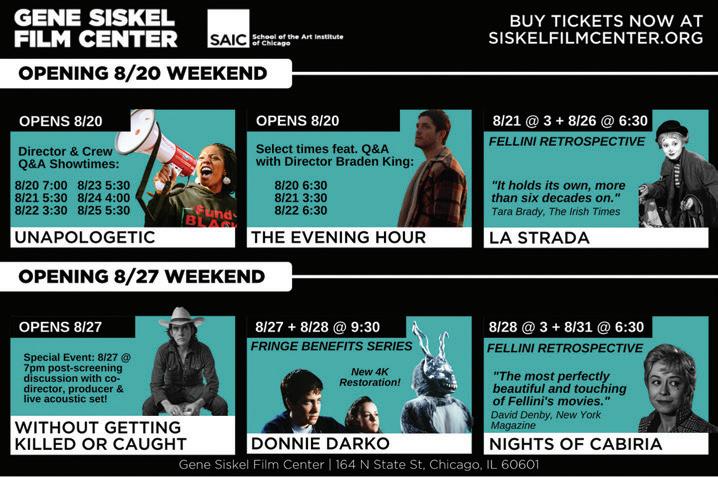


CODA is a coming-of-age story meant to move. And while the beats of the film may be predictable, it’s no less affecting. Following Ruby Rossi (Emilia Jones), a child of deaf adults (CODA) and the only hearing person in her family, viewers are introduced to a teenager that’s torn. Will she help her parents (played to perfection by Marlee Matlin and Troy Kotsur) and older brother (Daniel Durant) keep the family fishing business afloat or pursue her love of music? “If I was blind would you want to paint?” asks Ruby’s mother. The question reveals a familiar mother-daughter tension while honing in on the heart of the film. Ruby is entering adulthood. No longer her mother’s baby, it’s also time that she’s no longer her family’s interpreter. As they relearn how to communicate with each other, the film offers reassurance that each family member will fill their new role successfully.
—BECCA JAMES 111 min. Streaming on Apple TV+, in theaters at Landmark’s Century Centre Cinema
Napalm is the combustible gel you get from mixing, in the preferred variety for flamethrowers, kerosene and diesel. Throughout a lethal performance from Mariana Di Girolamo as the flamethrower-wielding title character in Chilean director Pablo Larraín’s eighth film—his first since Jackie (2016)—we see an individual who is the human equal to napalm, an incinerating force whose power derives from twinned, potent fuels coming together and exploding.
Ema, a dancer, leaves off training for elite chamber recitals under her director and brooding older husband Gastón (Gael García Bernal), channeling those energies instead into propulsive reggaeton workouts in the streets with an all-woman crew. The two styles stoke the film’s entire heat from one another in a series of generous if slightly showy dance sequences, which cinematographer Sergio Armstrong swoops across using Steadicam, importing clean MTV circa 1994 aesthetics to mixed effect. A tragedy that drives Ema and Gastón apart, once social services rehouse their adopted child, also decouples Ema’s mothering side from her ferocious sexuality. These paired impulses, again, burn up everything in their path once they fuse together, as Ema tempts and caresses her way across a huge queer swathe of bodies on the way to any reunion possible with Polo (Cristián Suárez).
Larraín is clearly sensitive to all the destruction that comes along with Ema’s bright blaze. When she drags her smitten divorce attorney Raquel (Paola Giannini) to a lesbian rager, Raquel’s discomfort comes across without any derisive coloring; there is room in Larraín’s world for both attitudes toward chaos, Raquel’s repressed one and Ema’s delight in it. Even Gastón’s tirade against reggaeton (he calls it “prison-music”), in an exquisite scene
from Bernal, reads as plausible, steering the film clear of the shallows once again and out of extended-musicvideo territory. But if there is a submerged morality at play, the 102-minute film is much more palpably a sweaty, sexy, neon-bathed scorcher. Flame on. —MAX MALLER 102 min. AMC River East 21, Music Box Theatre
Throughout his career as a documentary filmmaker, Peter Nicks has been fascinated with the complexities of Oakland and the people who live there. His 2012 film The Waiting Room honed in on an overworked emergency room. In 2017, he shi ed his focus to the county’s embattled police department with The Force. In his most recent work, Homeroom, the stars are the students of Oakland High School as they confront not just the regular highs and lows of high school, but also pushing to remove police officers from their district, rapid budget cuts, and the beginnings of the COVID-19 pandemic. While there are several moments of joy from the film’s charming cast of characters, Homeroom isn’t afraid to revel in the instances of profound sadness, either. A pivotal scene where two students make the case to remove police officers from campus is one of the most harrowing moments in a documentary this year, elevated by the devastating editing from Rebecca Adorno and Kristina Motwani that forces you to sit in the silence. To watch Homeroom is to be a fly on the wall at a pivotal moment of social change, where several intersections of activism all come to a head. —CODY CORRALL 90 min. Hulu
The Night House is a strong argument for more films that let Rebecca Hall be a scream queen. Feeling the ripple effects of her husband’s recent, unexpected death, Beth (Hall) copes as well as you could expect. She drinks, rewatches old wedding tapes, and covers her pain by projecting a wry, dark sense of humor. But it becomes clear soon enough that there’s something about the house that he built, and the way her husband passed, that doesn’t add up. Beth is constantly questioning what is real and what is her brain playing tricks on her—or if there’s something else at play—and the viewer is right there with her. Director David Bruckner explores grief and terror in fascinating ways here, even if the film loses its way to the central core at times. The Night House is especially clever when it comes to its use of space and perspective, actively distorting any stability that could be felt in the house, or in the audience. Hall’s performance is a standout, translating her usual smarmy inclinations into a genre context while still feeling grounded. The Night House is certainly a bold horror film, even if it can get tangled up in its own web of clever ideas. —CODY CORRALL 110 min. AMC Theatres, Regal Theatres v
Jazz drummer Dana Hall is also a composer, bandleader, ethnomusicologist, and educator. He serves as director of jazz studies at DePaul University and a visiting professor at the Sibelius Academy in Helsinki, Finland. His regular collaborators include vocalist Kurt Elling; saxophonists Chris Madsen, Geof Bradfield, and John Wojciechowski; and Damon Locks of the Black Monument Ensemble. Hall leads the
band Spring (among others), and in January at the Logan Center he’ll remount his multidisciplinary project Hypocrisy of Justice, a collaboration with actress and playwright Cheryl Lynn Bruce and artist Kerry James Marshall.
Hall will perform twice in late August and early September as part of the Fulton Street Collective’s Jazz Record Art Collective series, and this weekend he has gigs with
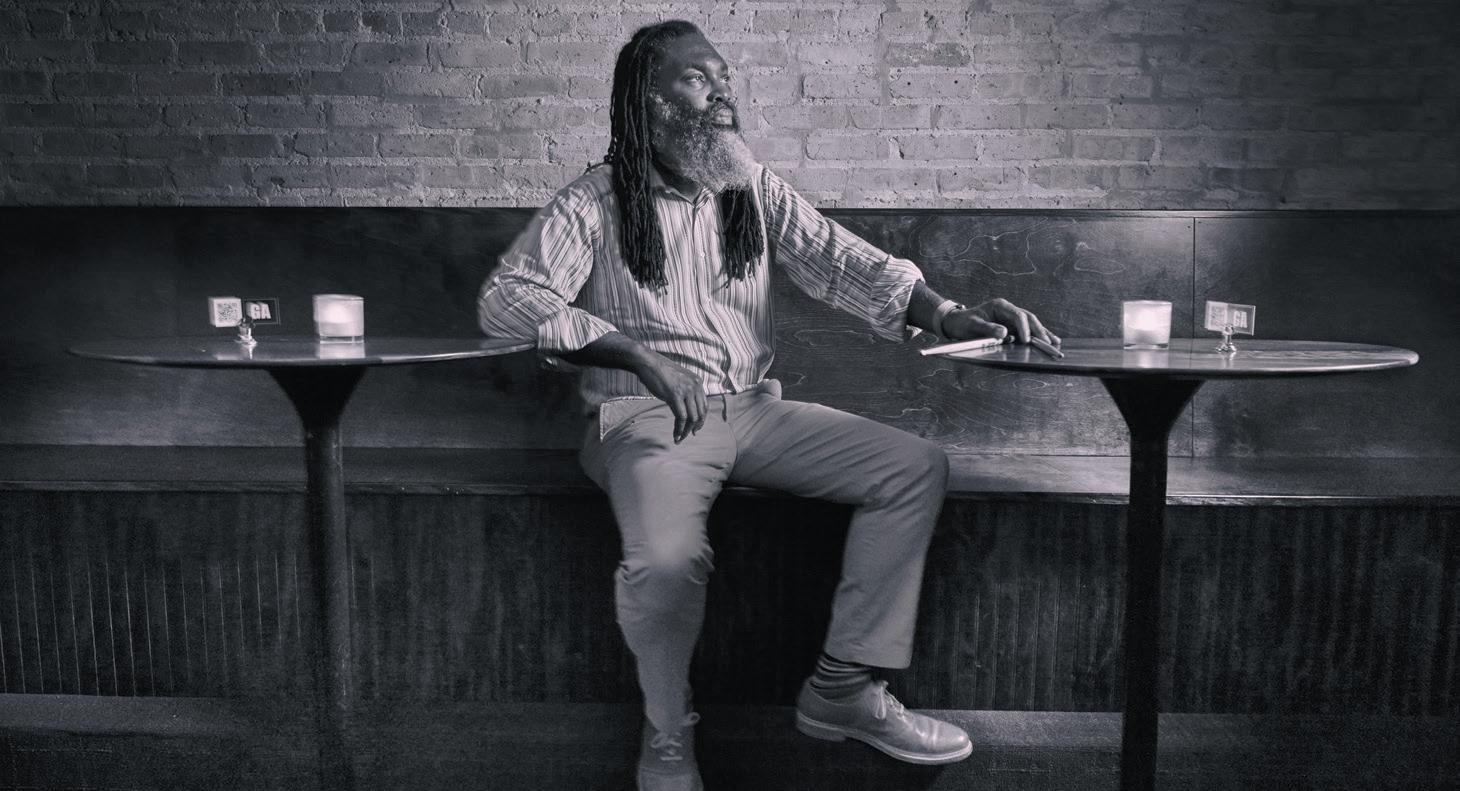
saxophonist Adam Larson at Fulton Street (Thu 8/19) and with Elling at the Green Mill (Fri 8/20-Sat 8/21). Hall’s next releases will be recordings with Larson and with bassist and composer Clark Sommers, both due late in 2021 or early in 2022.
Working remotely is something that I think is less common in the type of social musics that I’m generally engaged with—jazz music, improvised music. Being in the room and feeling the heartbeat of the people that you’re with, that’s really a large part of what makes the music what it is.
But certainly we find in commercial-based music a lot of collaboration that happens remotely, whether it’s producers sending tracks to different artists, or the idea of having an already-produced work and a vocalist going in, or rock groups that lay everything down in multiple tracks. In this moment, a lot of us have had to learn what that’s all about. We’ve
had to buy equipment, we’ve had to imagine studio spaces in our homes and in our closets and in our bathrooms, to figure out ways of sharing tracks or finding platforms that allow us to collaborate in real time.
I’ve purchased equipment and microphones and set spaces up so that I can share tracks with other people. And of course I’ve been in studios where I’ve gone in one door, I’ve been in one booth, I’ve not talked to anyone, I’ve played what I’m supposed to play, and I leave the studio without really communicating with anyone other than through my headphones.
DePaul University has been very responsible. They’ve been proactive about listening to and following the science, following the guidelines that’ve been put forth by the CDC, by local and state representatives. I would say probably 99 percent of the work that I did over the past academic year, and since March or April of 2020, has been entirely remote.
I could probably count on one hand the
“Being in the room and feeling the heartbeat of the people that you’re with, that’s really a large part of what makes the music what it is.”
As told to PHILIP MONTORO
number of times I’ve been at our brand-new facilities in Lincoln Park since April of 2020. The music that I teach and mentor students with is a community music, it’s a social music, it’s a music that is rooted in culture. And it’s a challenge to try to communicate those ideas and those concepts through a Zoom chat screen, especially when you’re told you have a week and a half to figure out how to do that.
Not only that, but there’s a lot of inequities in education. There’s a lot of inequities in having access to technology. I’m not just talking about high-speed Internet, but I’m talking about maybe a computer, a good microphone. Maybe you’re someone who plays piano and you’re relying on the practice facilities in a building, and you have to catch a train and a bus to get to those practice facilities so that you can play on an instrument. And if you’re at home, you don’t have a piano. You don’t have a keyboard. So how do you continue your education, if it’s not safe to be on a train or a bus or that building is not available to you?
We would think, “OK, well, everybody’s got Internet, right?” No, everybody doesn’t have Internet. “Everybody has Internet that will allow them to be on a Zoom call, right?” No, everybody doesn’t have that. “Everybody has Internet that will allow them to be on a Zoom call with audio and video and the ability to play their instrument so that their teacher can hear them, right?” You keep kicking this down the road, and it becomes increasingly complicated. It’s not just someone sitting there listening to someone lecture about jazz. And I would say that if we had to start tomorrow in a remote fashion, we would not have all the answers to those complications that were placed in front of us in March of 2020. But we’ve made great strides.
Maybe students have their instrument, but they’re living in an environment that they’re not able to play it. Let’s say you’re with your family and your younger sister and your mother’s at home and everybody needs to be in school remotely or working remotely. How do you play drums? When do you play drums?
With my students, some of them are living at home where it’s like, well, my mom takes a lunch break at this time, that’s when I can play the drums. So we need to have a lesson at this time. Or one of my west-coast students will say, I have to go to a rehearsal space. I can only
access that rehearsal space these days of the week at these times. Oh, by the way, it’s a twohour time-zone difference. Can we have my lesson at this time.
So I’ve been teaching remotely, and much of that job has not been a nine-to-five job. It never was, but now I live where I work. I’m on call 26 hours a day for my students. That’s what I signed up for, and I’ve been happy to be able to be available.
A lot of the work that I’ve been doing has been counseling. Like, “Why I am going into music? Why I am going to get an education in music when all the clubs are closed? What will I be able to do? Where will I be able to play?” Students recognize, because that’s the way we teach it at DePaul, the social and cultural connections that are the bedrock of this music. So they go out to the clubs, and they go out to the jam sessions if they’re old enough, and they make the scene. They know that that’s what makes the music alive. When they’re like, “Well, I’m cooped up at home and I can’t go see my mentors. I can’t go see my teachers play, I can’t hear them in person, I can’t play with other people”—then it makes them question, well, when will this happen, and what are they supposed to do in the meantime?
A fair amount of my time has been on paradiddles, but it’s also just been about, Hey, how are you doing, how are you feeling, how are you coping? Let’s talk about some fears you have, some concerns you have. Let me share some feelings and fears and concerns I have.
I feel like particularly with this type of social and cultural music, with Black American music, it’s really important for people to be walking the talk. You have to be able to know that the people that are mentoring you are actually part of this organism. That they’re a part of the live and living music that you’re trying to learn. So my educational and teaching practice is also my creative and performing practice or my composing practice. They inform each other. What I do on a bandstand is what I do in a classroom, and what I do in the classroom is what I’m gonna be figuring out on the bandstand later that evening.
So a part of me was cut o . What am I gonna do? A lot of the people that I make music with, and they’re my close collaborative friends, they’re also highly esteemed educators. We’re having these conversations about, like, “Man, who am I if I’m not out playing? Who am I if I feel like I’ve got to completely reimagine my teaching philosophy and my pedagogical practice?”
But also, when you hit the video button on
Zoom, you’ve gotta know that people are looking at you and looking to you for some sort of guidance, for some sort of solace. And it’s not about putting on a happy face, but it’s about continuing to tell them that. And then you’re like, OK, I’m gonna believe this too. I’ve gotta really remember that I said that, and I really believe that, and it’s this constant cycle of belief and disbelief and questioning and who am I and who do you wanna be.
As far as my own personal work, I’ve been teaching drum-set lessons, working with ensembles, engaging in remote recording projects, doing a whole Brady Bunch, everybodyin-a-box collaborative video-audio montage. Teaching courses in history, in theory, analysis, critical listening. They all have had their interesting issues with the modality of doing things remotely. It’s really been a trip.
Many of us that are dealing with creative music, we’re on one side of the microphone, and we don’t know anything that’s happening on the other side of the microphone. We don’t know anything about the engineering side, we don’t know anything about the production side. We’re not invested in those areas because we’re invested in composing and playing and the hustle of trying to keep that part of our career happening.
So when we go in the studio, it’s like, just make sure I sound good—I don’t care how you get it happening. Well, we’ve had to start caring about that. We’ve had to figure that out. We’ve had to start figuring some things out about mike placement, about digital audio workstations, about recording ourselves and making it sound as optimal as possible, about sound reflections o of walls and windows and in corners, and what’s the best place to put my instrument so that it sounds good. It’s things that we should’ve been dealing with and that should be a part of any 21st-century curriculum in music schools. Our students need to deal with that. We as faculty members have had to deal with that and learn it and make it a part of our practice. So that’s an upside.
Another upside is, we really have been able to think about what is elemental to a jazz-studies program, to a music program. So obviously we’ve reinforced the idea that teaching private lessons happens at its best in person—we’ve been able to cosign that and confirm that is the case! But now, a jazzhistory course for graduate students, where it’s more of a seminar-based three-hour course of close readings and then conversation about those close readings—can that happen in a remote fashion for a classroom that’s
between ten and 14 students, primarily folks who are getting graduate degrees, who may be teaching in classrooms or working on compositions during the day? Can this be delivered at night? Maybe some of it asynchronously? We’ve been able to decide that, yeah, maybe that’s a course that actually could benefit, and it would benefit our students.
Right now we’re planning to do everything in person for the upcoming school year. We are imagining that it’s October of 2019, and we’re having ensembles in person. But we have guidelines that say if you’re in a room with more than one person, everyone should wear a mask.
We are making allowances for those individuals who for whatever reason are not vaccinated—maybe they’re coming from another country, where they have not been able to have access to a vaccine. We are requiring students to be vaccinated or provide some sort of medical or religious exemption, and then they’re going to be required to be tested with regularity.
So we are proceeding and following the CDC guidelines with respect to how distant people should be, how many people should be in a room, how long should we wait to clear aerosols. Should we be wearing masks? Are we gonna wear masks only when we’re playing or when we’re not playing? Are we gonna have face shields? And if ultimately this is not going to be a good experience for the students, then once again we realize that we know that Zoom exists.
I’ve seen saxophonists, they’ve got an entire hood over their instrument. That’s the reason why our ensembles met remotely. I said, look, if we have to be inside of a four-by-four plexi box with a shield over our flute and wearing a plastic mask over our face and a hazmat suit, we probably should not be in person making music with each other.
Last year it was an option for some of our educators to teach some of their private lessons in person. As a school, we purchased what we needed in order for that to happen, and we had specific rooms with air exchange and timing and everything that was necessary, simply because their students and that faculty member felt comfortable being in person.
We follow the guidelines, and it’s fortunate that we’ve had a dean and we’ve had a university and a president who felt like, OK, you can make smart decisions, and we’ll support those smart decisions if they keep people safe. v
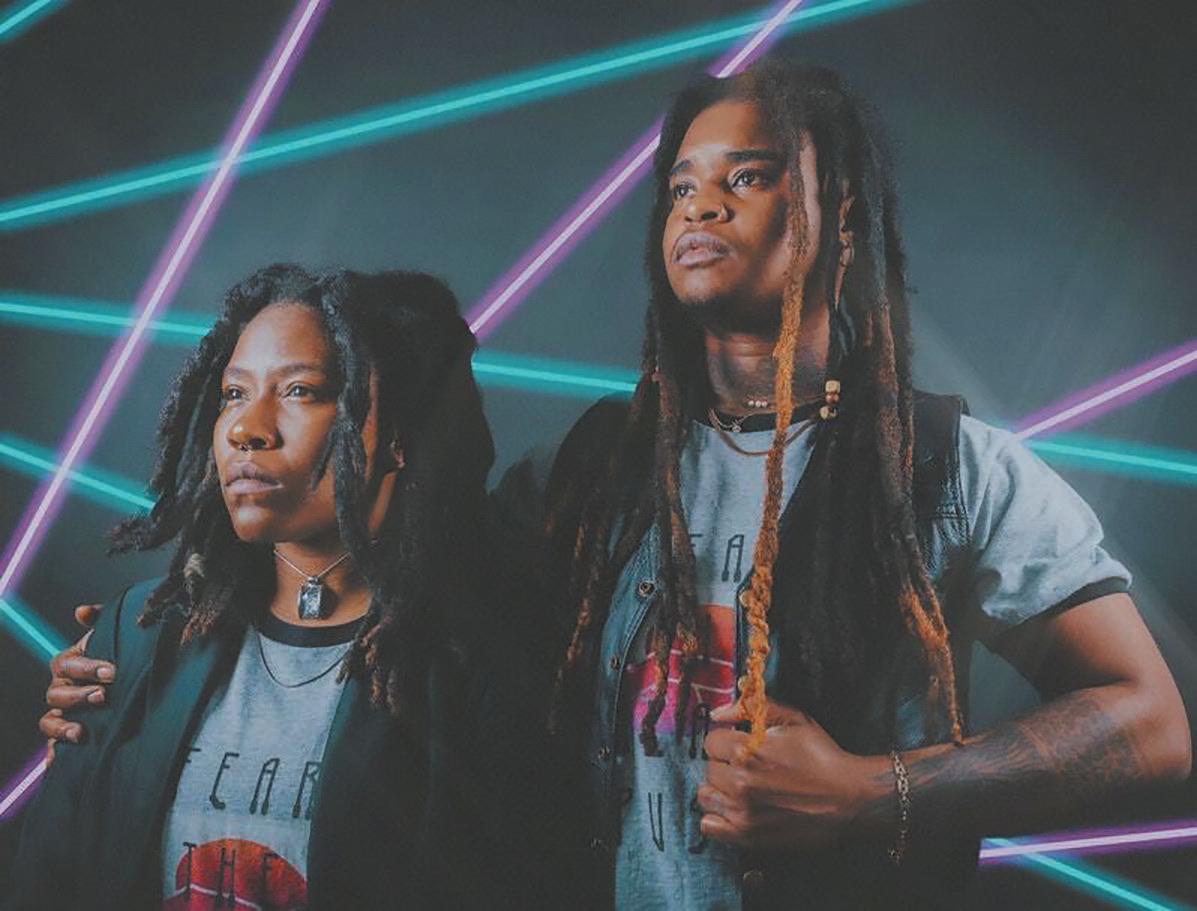
ORISUN
Tue 8/31, 9 PM, Hideout, 1354 W. Wabansia, $12. 21+
CHICAGO INDIE-ROCK DUO ORISUN indulge in their lo-fi proclivities without ever giving in to slacker entropy. On their self-released debut EP, May’s This Is Orisun, multi-instrumentalist Kai Black and front person Asha Adisa artfully employ gossamer guitars, sophisticated keys, precisely programmed percussion with dampened drums, and relaxed, alluring vocals to calibrate moods that test the bounds of tranquility. Orisun can draw you in quickly—they give the gloomy atmosphere of “Miserable” a dose of animated energy with a straight-to-the-gut grunge riff. This Is Orisun is only about 16 minutes long, but Black and Adisa don’t need much time to establish their band as one to watch —LEOR GALIL
Air Credits Air Credits play on day one of the three-day Glenwood Avenue Arts Fest; A Queer Pride and friends and Environmental Encroachment open. 8:15 PM (music at 6 PM), 1400 block of W. Morse at Glenwood. F b
Few pop acts are quite as prepared to engage with climate change as Chicago’s Air Credits. Since 2016, rapper ShowYouSuck (aka Clinton Sandifer) and producer Steve Reidell (half of the Hood Internet) have turned dystopian nightmares into strangely joyful songs. There’s catharsis to be found in these missives from a future where oxygen is a scarce commodity, since so many of us (but hardly enough of us) grapple with the reality of escalating global climate change—humans are wreaking havoc on the planet, pushing us closer to Air Credits’ bleak visions. The duo’s new Believe That You’re Here (Wasteland Radio New Archives) couches its moody futurism in concerns we already have today. On the tense, brittle “Party Outside,” for instance, Show raps about the tightening grip of the surveillance state, and if you’ve ever felt anxious about something you’ve posted online, it’ll hit you square in the chest. The album ain’t all doom and gloom, though: the dreamlike “Time/Space” coasts on slow-moving synths and kindly vocals from Show and Lili K. The future might look grim, but if more musicians take inspiration from the imaginative work of Air Credits, the present could get a little better. —LEOR GALIL

Mexican Institute of Sound Mexican Institute of Sound performs on day two of the three-day Ruido Fest, which also features
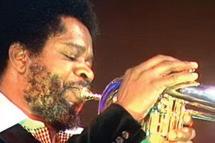




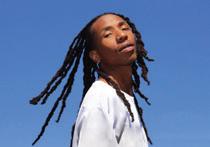


9/4: SCORCHED TUNDRA PRESENTS IN THE COMPANY OF SERPENTS, 9/5: FOTOCRIME (RECORD RELEASE), 9/6: ELI WINTER (FREE!), 9/8: VARIOUS DISTRACTIONS (FREE!), 9/9: TEMPERS, 9/10: PITCHFORK AFTERSHOW WITH DIVINO NINO, 9/11: PITCHFORK AFTERSHOW WITH DEHD, 9/12: PITCHFORK AFTERSHOW WITH YVES TUMOR, 9/10: PITCHFORK AFTERSHOW WITH BARTEES STRANGE (FREE!), 9/14 - 9/15: THURSTON MOORE, 9/16: TORRES, 9/17: NOUVELLE VAGUE, 9/18: ALGIERS, 9/19: COMBO CHIMBITA, 9/21: HOLY WAVE, 9/23 @ GARFIELD PARK CONSERVATORY: SACRED BONES AND EMPTY BOTTLE PRESENT PLANTASIA, 9/29: THE BELLWETHER SYNDICATE, 10/2: FAT TONY +

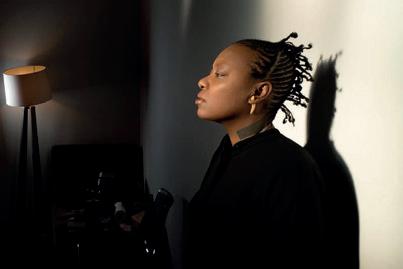

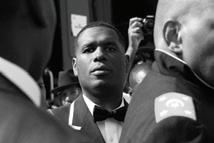






continued from 32
Panteón Rococó, Mœnia, Ivy Queen, Enjambre, Inner Wave, Maye, Nahuales Underground, La Doña, Tone Zone Skam, and others. 3:45 PM (music begins at 1 PM), Union Park, 1501 W. Randolph, $65. b
Camilo Lara, who makes music as Mexican Institute of Sound, is hardly the only Latinx artist to meld traditional rhythms with contemporary electronic dance genres (Colombian group Bomba Estéreo, Ecuador-based producer Nicola Cruz, and fellow Ruido Festers Los Amigos Invisibles immediately come to mind). Lara is one of the most highprofile, though; he’s done production work with chart-topping artists such as Beck and Norah Jones, and he worked as the creative musical consultant on Pixar’s smash hit Coco. Lara’s latest record, Distrito Federal (Soy Sauce), meditates on his hometown of Mexico City and how it’s changed over the years, using a bubbling stew of styles and a motley cast of guest stars. Colombian trio La Perla provide harmonies and surging percussion to the fuzzed-out production of “El Antidoto”; Los Angeles singersongwriter Cuco sings a dreamy retro ballad over watery psychedelia on “Poloma”; Spanish singer Joe Crepúsculo emotes against a chorus of “Hooked on a Feeling”-style ooga-chaka s on “Cruzando el Río”; Graham Paxon of Blur adds snarling guitar to the boiling funk, smeary horns, and anti-xenophobic lyrics of “My America Is Not Your America.” Distrito Federal shakes its hips across international borders and through Mexico City’s past and present: the electro cumbia of “Dios” celebrates local food (quesadillas, chicharrones, gorditas), and “Se Compran” incorporates the cries of street vendors, whose soaring harmonies seem to call out to an older city slowly being swamped by the rising squall of new visitors and new technology. Mexican Institute of Sound’s energetic, stomping live shows also defy its academic-sounding name. Wherever he plays, Lara shows up with a rotating team of musicians, a broadbrimmed hat, and—like many of his fellow perform-
ers at Ruido Fest—a determination to get butts moving. —NOAH
BERLATSKYPreservation of Fire Natural Information Society headline, with a lineup of Joshua Abrams, Ari Brown, Lisa Alvarado, Mikel Patrick Avery, Jason Stein, Nick Mazzarella, and Mai Sugimoto; Drum Divas open, and King Hippo hosts. 6 PM, Millennium Park, Pritzker Pavilion, 201 E. Randolph. F b
In 2019, Chicago event producer and teacher Alejandro Ayala, who DJs as King Hippo, received a grant from the city’s Department of Cultural Affairs and Special Events (DCASE) to produce a two-night concert series called the Preservation of Fire. The concerts, hosted by Co-Prosperity in Bridgeport and broadcast live on Worldwide FM and Lumpen Radio, were immersive experiences that spotlit the sort of music that King Hippo tends to play on his radio shows; he stacked each bill with improvisers and boundary-pushing musicians, including audacious jazz-pop fusion band Resavoir and saxophonist and visual artist Eliel Sherman Storey. This is music that isn’t afraid to explore—you may want to make sure your shoes are laced up tightly, so they don’t fall off as the sounds whoosh you up into the stratosphere.

Ayala continues to use the Preservation of Fire moniker, and his latest event is part of the Millennium Park Summer Music Series at Pritzker Pavilion. The evening will open with Drum Divas, a local ensemble of women who perform traditional African drum music, and the headliners are multi-instrumentalist
Joshua Abrams and his entrancing Natural Information Society, a loose jazz- and psych-influenced collective that for this performance will include legendary saxophonist Ari Brown. When I spoke to Ayala in March, he talked about the importance of respecting and taking care of Chicago’s music, calling musi-
cians “treasures for the city.” Likewise, this showcase promises to deliver a treasure trove of sonic pleasures. —SALEM COLLO-JULIN
Wilco, Sleater-Kinney Wilco headline; Sleater-Kinney and NNAMDÏ open. 6 PM, Millennium Park, Pritzker Pavilion, 201 E. Randolph, $45. b
Wilco released their latest album, Ode to Joy , in October 2019. Sleater-Kinney released their new record, Path of Wellness, in June. Due to the pandemic, neither record has had the kind of live support you’d normally expect such high-profile indierock releases to get. That gives this doubleheader tour all the more potential to be amazing, if everything goes according to plan. Wilco made a statement on their website that is very cautious and forgiving of people who don’t feel up to coming to live shows right now, but as of this writing, the show is nearly sold out, so obviously plenty of people do, and hopefully they are considering the ethics of how to behave at such an event. Wilco’s quiet and intimate Ode to Joy sounds prescient now, both in the semi-remote method of its recording—front man Jeff Tweedy and drummer Glenn Kotche built the framework of the songs and brought the rest of the band in later—and in some of its lyrics: “Now all I see from where I’m from / Empty auditorium / We were lucky, that’s for sure,” Tweedy sings on “We Were Lucky.” Mixed with cuts from Wilco’s back catalog, these inviting songs should make for a satisfying homecoming (and those with trepidation about attending any show might find the band’s darker moments fit their mood).
Last fall, Tweedy’s son and frequent collaborator Spencer Tweedy published a book, Mirror Sound: A Look Into the People and Processes Behind Self-Recorded Music , which includes a lot of first-
hand observations and anecdotes about tricks of the trade, many of which musicians employed by necessity during the pandemic. It also has a foreword by Sleater-Kinney guitarist and vocalist Carrie Brownstein. Path of Wellness is Sleater-Kinney’s first album without longtime drummer Janet Weiss in 24 years and the first self-released record of their career. Brownstein and Sleater-Kinney’s other founder and front woman, Corin Tucker, have settled into a comfy groove that’s pretty easy on the ears for fans of 90s rock. Their harmonies are lovely, and their lyrics are weird and wise. The album caused some controversy upon its release, I suspect because it called back to the 80s instead of sticking to the classic indie-rock style fans have come to expect of Sleater-Kinney. The powerful postpunk groove of the title track recalls early-80s Bush Tetras, and “High in the Grass” (my favorite of the 80s-flavored tunes) features English folk-rock-style vocals over raw guitars and shout-out choruses. For a lot of fans, Wilco and Sleater-Kinney feel like old trusted friends. In these precarious pandemic times, when everyone has to choose what level of calculated risk to take, spending an evening outdoors with them could feel just right.
—MONICA KENDRICKMatthew Shipp 8:30 PM, Constellation, 3111 N. Western, $20, $25 in advance (donation requested for livestream at Constellation’s YouTube channel). 18+
Matthew Shipp has been making music at a relentless pace since the 1980s. On occasion, the Delaware-born, New York-based pianist has copped a David Bowie move and threatened to retire from recording. But now that he’s reached the age of 60, he’s apparently too busy making new records to talk about quitting. So far in 2021 he’s appeared on seven albums, including a run of virtuosic duo exchanges with drummer Whit Dickey, bassist William Parker, and saxophonists Evan Parker and Ivo Perelman. And he’s not done yet: Dickey’s new
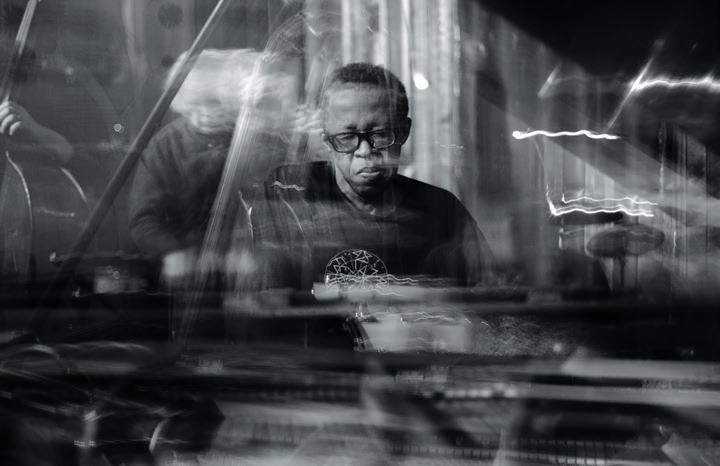
Make time to learn something new with music and dance classes at Old Town School! We offer flexible schedules for all skill levels both in-person and online.
Sign up for classes today at
oldtownschool.org
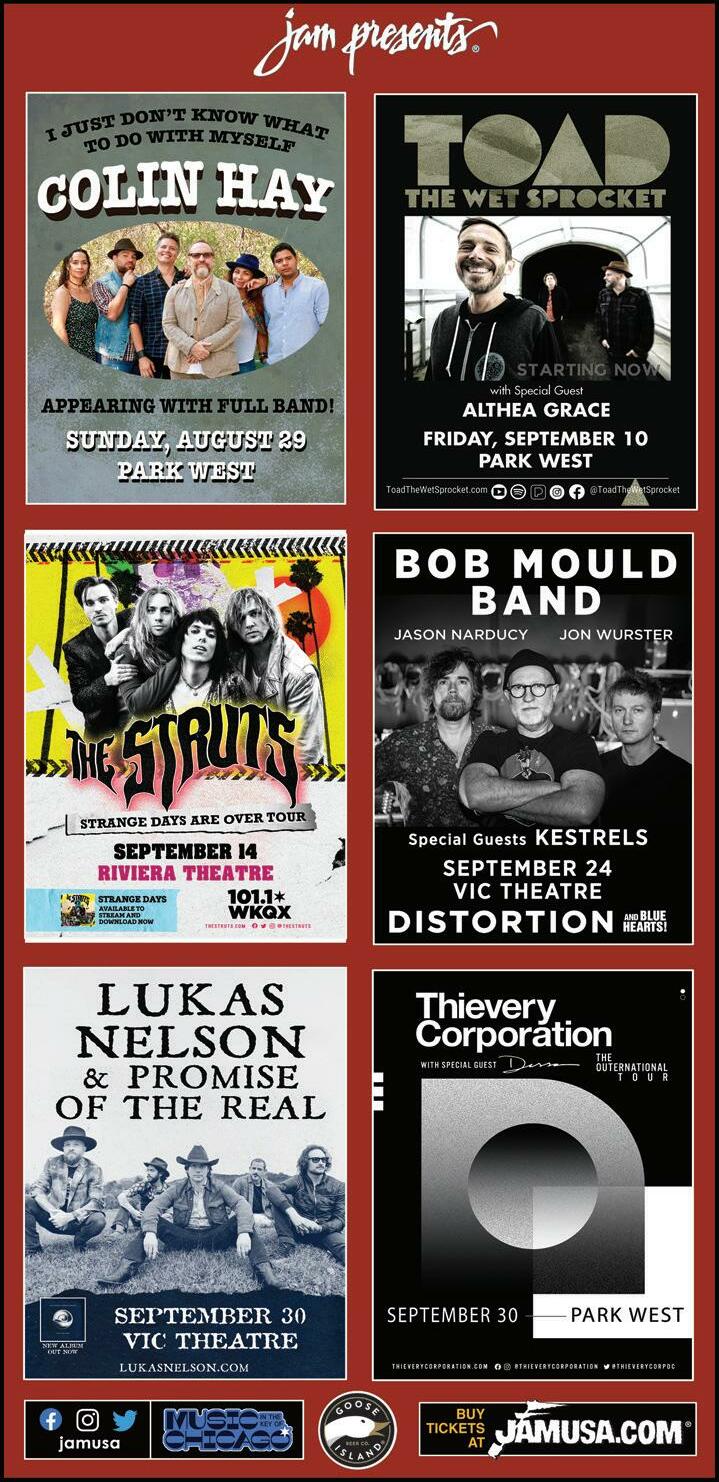
Find more music reviews at chicagoreader.com/soundboard.
imprint, TAO Forms, is set to issue Shipp’s newest solo CD, Codebreaker , before the end of the year. Shipp’s ability to sustain an equally ferocious pace at the keyboard has long made him a favorite accompanist for high-energy saxophonists, but on Codebreaker he’s considerably lightened his touch. This makes it possible to hear the fleet precision and contrapuntal articulation he uses to express his melodic ideas, as well the dense harmonies that make even his quietest passages feel rich with possibility. Since 2014, Shipp has been a repeat participant in the loose jam sessions that Constellation has traditionally hosted over Labor Day weekend, a er the Chicago Jazz Festival’s main events. This year there’s no festival and thus no jam sessions, but Shipp’s presence at summer’s end is a comfortingly mooring one.
—BILL MEYEROrisun See Pick of the Week, page 32. This show will be held outside on the Hideout’s patio.
9 PM, Hideout, 1354 W. Wabansia, $12. 21+
Modern English, Ganser 8 PM, SPACE, 1245 Chicago Ave, Evanston, $30, $28 in advance. b
I was nine years old when I ordered Modern English’s second album, 1982’s A er the Snow, from Columbia House. I bought it for “I Melt With You” and discovered that the rest of the songs sounded nothing like that hit single—the record quickly submerged me in the band’s netherworld of ominous postpunk, undoubtedly the same way Joy Division’s smooth smash “Love Will Tear Us Apart” led many FM listeners deeper into their anguished sonic
landscapes. Modern English began mining dark postpunk territory on their 1981 debut full-length, Mesh & Lace (4AD), which has loads of sonic effects and a mesmerizing, edgy, subterranean vibe that’s miles from the anthemic new wave they’re associated with today. I’ve been a fan of the band for most of my life, but despite my enduring love, I was in no way prepared for what I’d witness at Modern English’s Empty Bottle show in 2016 (part of their first major U.S. tour in decades). I committed to it at the last minute (“OK, I guess I’ll go”), and to make a long story short they blew me the fuck away by flawlessly and faithfully playing material off all their albums with an urgency rarely seen from legacy-act reunions. I was especially in awe of ax wizard Gary McDowell (and his psychedelic face tattoos), who didn’t play a straight note the entire time, instead going for textural, atonal scrawls of sound—and the rest of the group kept up, maintaining an energy level that even emerging bands would be lucky to match.
Speaking of emerging bands: local post-postpunkers Ganser, who open this show, shared a bill with Modern English in October 2017. That makes this SPACE gig a “reunion of sorts,” according to lead vocalist and bassist Alicia Gaines. The fourpiece will play material off their latest LP, Just Look at That Sky, whose release last summer in the heart of the pandemic has meant they’ve had few opportunities to rip into the tunes live. Gaines says the record is “about feeling perpetually bewildered by life, so it seems as fitting as ever.” Against all odds, Modern English and Ganser will be using their music to tackle the darker aspects of existence together again. I can’t wait to be in the front row— most likely dressed in black, with a matching mask.
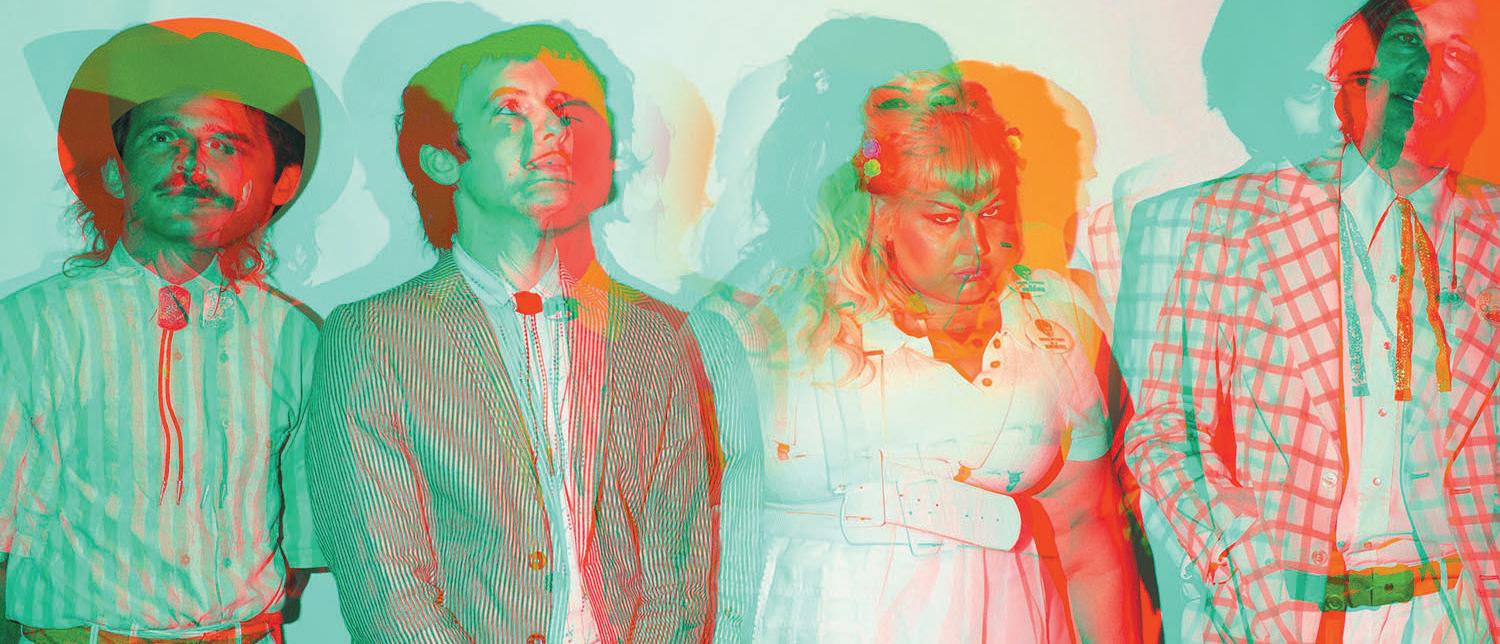 —STEVE KRAKOW
—STEVE KRAKOW

click.ees.link/yearo hespider
Shannon & the Clams’ new sixth album, Year of the Spider , is a welcome anomaly in this wretched second pandemic summer. The band completed the record in early 2020, just before COVID19 brought the country and its music industry to a grinding halt, so it’s unmarred by that particular global catastrophe. Instead the album’s 50s- and 60s-inspired garage punk reckons with a series of challenges that had befallen Clams bandleader Shannon Shaw: In 2018, a Northern California wildfire nearly forced her parents from their home, and a year later she was exiled from her apartment of 14 years due to a relentless peeping tom. Soon a er, her father was diagnosed with cancer. Seeking solace in the cosmos, Shaw contacted a local psychic, who encouraged her to call upon the wisdom of Durga, an eight-armed Hindu goddess. With that, Shaw embarked on her own “Year of the Spider,” summoning the power and protection of her new patron saint and bringing her trio of Clams along for the ride to make a new album. Produced by Black Keys front man and guitarist Dan Auerbach and released on his Easy Eye Sound label, Year of the Spider is a blunderbuss of punk, blues, funk, and girl-group tunes, just like you’d expect of a record cosigned by Dan Auerbach, but also introduces a welcome broadening of the Clams’ tonal horizons. The album bursts open with “Do I Wanna Stay,” a tour de force of Ennio Morriconeesque pomp, funk flourishes, and Shaw’s line storm of a voice. Lead single “Midnight Wine” is a thunderous flex of Shannon & the Clams’ uncanny ability to spin somber subjects into captivating rhapsodies; dedicated to overdose victims in the Oakland arts community, it’s ecstatic, eerie, and disturbingly groovy. Elsewhere the album’s heaviness is tempered by gummy, organ-powered pop (“All of My Cryin’”), candy-coated jangle (“Leaves Fall Again”), and ditties powered by the fury of a thousand raging Shirelles (“Mary, Don’t Go”). The Clams hit their stride on the tracks where the tenderheart-
ed vocals of guitarist Cody Blanchard freely tangle with Shaw’s bruiser belts; he imbues “Flowers Will Return” with a lyricism and Americana-style lilt that recall Tusk -era Lindsey Buckingham. As lofty as the subject matter of Year of the Spider may be, Shannon & the Clams ease its existential weight with beauty and bombast—big beehives and bigger hooks, stacked harmonies and towering melodies. Facing grief feels and sounds different to all of us; to Shannon & the Clams, it sounds like a raging choir, singing in the face of fear.


—SHANNON NICO SHREIBAK
Stuck, Content that makes you feel good Exploding in Sound explodinginsoundrecords.bandcamp.com/album/ content-that-makes-you-feel-good
Chicago postpunk upstarts Stuck can make tension boil over slowly, and you can feel it all over their 2020 debut, Change Is Bad. In April 2021, they convened at Jamdek Studios to knock out a quickand-dirty recording, intending its release to renew interest in the band as clubs, promoters, and artists prepared to re-emerge thanks to the mass rollout of vaccinations. That hopefulness warms up the resulting EP, Content That Makes You Feel Good (Exploding in Sound). Front man Greg Obis bellows about the anxiety and toil of engaging with highspeed, mass-produced culture (“Labor Leisure”) with the same clipped indignation he uses to rail against government-funded paramilitary organizations whose resources and power dwarf that of the communities they’re supposed to protect (“City of Police”). Content That Makes You Feel Good torpedoes ahead with punk vigor, and Stuck tackle challenges bigger than themselves in song with a force that telegraphs optimism. If I could sound as energized, focused, and determined as they do while battling the ills that have swirled around my brain throughout the pandemic, I’d feel capable of anything. —LEOR GALIL



turnstile.lnk.to/GlowOn
Traditionally, when people says hardcore bands have “progressed” it means they’ve begun the slow process of abandoning the genre for something more accessible. Plenty of hardcore bands have started slipping into 90s alt-rock territory, but Baltimore’s Turnstile use their new album, Glow On , to draw out the fact that heavy radio-friendly rock was built on hardcore’s DNA. After all, you don’t get Rage Against the Machine without the Inside Out seven-inch Zack de la Rocha helped write before his more famous band formed. Glow On is impactful not only because it still sounds like Turnstile—the big, chugging riffs and high-kick-friendly mosh calls are still here—but also because it makes room for so er R&B-infused sections and a couple Blood Orange collaborations. Unlike other hardcore bands expanding their sound, Turnstile seem wholly unconcerned with proving that hardcore is “art,” as they’re much more interested in proving that bouncy riffs, pogo-inducing breakdowns, and sing-along hooks are a universal language. On “Blackout,” Turnstile lay down an impressive hardcore foundation while front man Brendan Yates gives the most dynamic vocal performances he’s ever committed to record, reaching for high notes he’d never attempted before while still letting loose with primal, powerful screams. The track is built on a hook that wouldn’t feel out of place on terrestrial rock radio, but the way it stays a mosher’s delight even as it veers into more expressly danceable rhythms perfectly encapsulates the album’s charm. Glow On is full of unbridled joy and rampant positivity, which have always been a part of hardcore, even if they’re occasionally overshadowed by (or dismissed because of) its layers of masculine posturing. In contrast with so many other genrebending hardcore records, Glow On never tries to hide Turnstile’s roots. Instead it invites listeners into the band’s world and gives them a reason to dance.



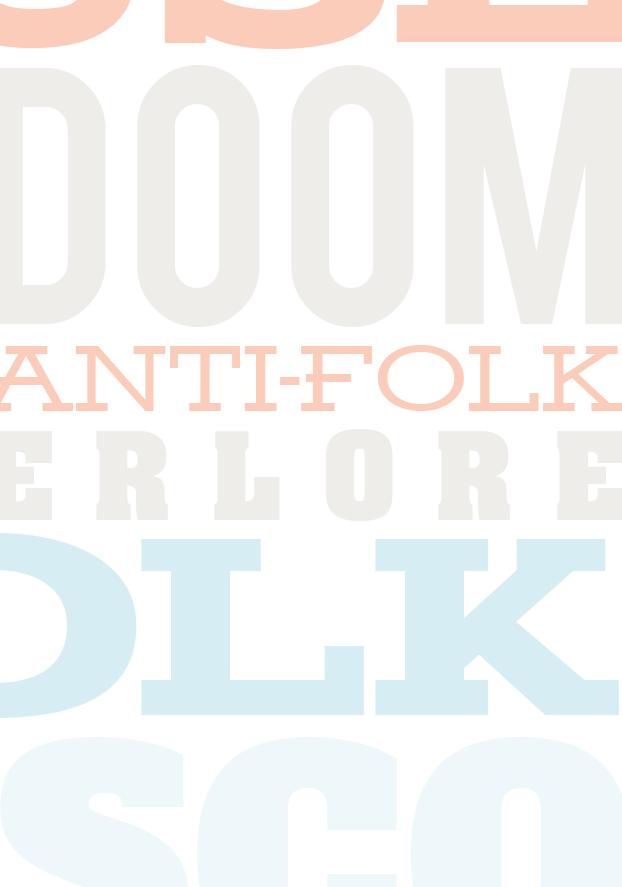
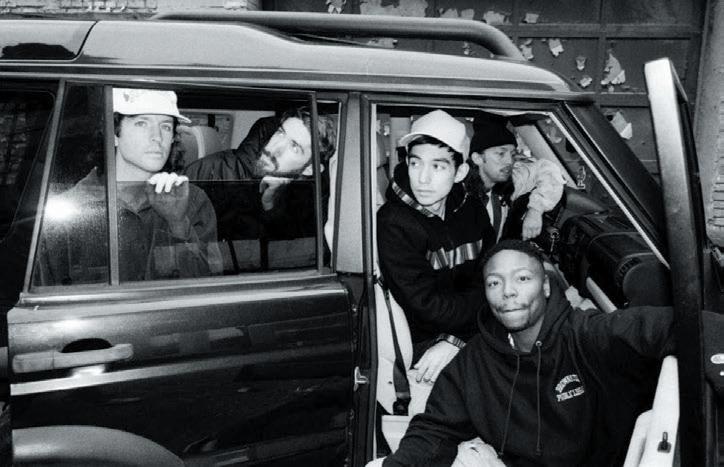 —DAVID ANTHONY v
—DAVID ANTHONY v



A-Trak 9/9, 8:30 PM, Thalia Hall, 17+
Above & Beyond, Andrew Bayer, gardenstate 9/18, 7 PM, Huntington Bank Pavilion b
Afrodjia Social Club featuring DJ Sadie Woods and friends, Proximity with Micah Collier & Electec 8/30, 6 PM, Pritzker Pavilion, Millennium Park F b
Julien Baker, Thao, Katie Malco 9/22-9/23, 7:30 PM, Metro, 18+
Bayside, Senses Fail, Hawthorne Heights 9/19, 9 PM, Concord Music Hall, 17+ Big Sandy & His Fly-Rite Boys 8/28, 8:30 PM, FitzGerald’s, Berwyn
Charlie Reed, Living Thing, Fast Preacher 8/26, 9 PM, Sleeping Village
Slique Jay Adams, Mecca
All-Star Band 10/4, 7 PM, the Promontory b
El Alfa 11/18, 8 PM, Rosemont Theatre, Rosemont b
Bendigo Fletcher, Evening Attraction 8/27, 8 PM, Schubas, 18+
Big Freedia 9/18, 11 PM, Martyrs’, 18+
Big Time Rush 12/15, 8 PM, Chicago Theatre b
James Blake, Fousheé 10/3, 8 PM, Chicago Theatre b
Bnny, Squirrel Flower (solo), Divino Niño (DJ set) 9/2,
9:30 PM, Empty Bottle
Brooks & Dunn, Travis Tritt, Elvie Shane 9/18, 7 PM, Hollywood Casino Amphitheatre, Tinley Park b
Cimafunk 10/1, 8:30 PM, Thalia Hall, 17+
Brett Dennen 3/4/2022, 8 PM, Park West, 18+
Diane Coffee, Deep Sea Diver, Why Bonnie 9/21, 8 PM, Lincoln Hall, 18+ Dream Theater, Arch Echo 11/11, 7:30 PM, Chicago Theatre b
Elita, Sunday Cruise 11/14, 8 PM, Schubas, 18+
Samantha Fish 12/19, 7:30 PM, Park West b
Future Bartenderz, Timmy
Vulgar’s Genetic Armageddon 8/31, 8:30 PM, Empty Bottle
Kany Garcia 9/26, 8 PM, House of Blues, 17+

Garcia Peoples, Weak Signal 10/15, 10 PM, Schubas, 18+
Helen Gillet 8/29, 7 PM, SPACE, Evanston b
Jack Harlow, Babyface Ray, Mavi 11/12, 8 PM, Aragon Ballroom b
Hoyle Brothers 8/27, 5:30 PM, Empty Bottle F
Jonas Brothers, Kelsea Bal-
Kim Gordon 9/10, 10 PM, Thalia Hall, 17+
Guns N’ Roses, Mammoth WVH 9/16, 6 PM, Wrigley Field b
Half Gringa 9/25, 8:30 PM, Lincoln Hall, 18+
Jon McLaughlin 9/12, 8 PM, SPACE, Evanston b
James McMurtry 9/24, 8 PM, Maurer Hall, Old Town School of Folk Music b
lerini 9/12, 7 PM, Hollywood Casino Amphitheatre, Tinley Park b
Little Big Town, Caitlyn Smith
9/29-9/30, 8 PM, Chicago Theatre b
Mannequin Pussy, Angel Du$t, Pinkshi 9/15, 7 PM, Lincoln Hall b
Andrew McMahon, Zac Clark
10/19, 7 PM, Chicago Theatre b
Micro TDH 9/16, 8 PM, House of Blues, 17+
Midland, Hailey Whitters
10/30, 7:15 PM, Aragon Ballroom b
Andy Mineo, SonReal, Propaganda, Wordsplayed
9/27, 7 PM, House of Blues b
Mon Laferte 10/6-10/7, 8 PM, House of Blues, 17+
Monsta X 2/3/2022, 7:30 PM, Chicago Theatre b
90s Kickback Concert featuring SWV, Ginuwine, Next, Case, H-Town, Shai, Miche’le 10/8, 8 PM, Chicago Theatre b
Xavier Omär, TheMIND 9/16, 7:30 PM, Lincoln Hall b
Brad Paisley, Jimmie Allen
9/10, 7:30 PM, Hollywood
Casino Amphitheatre, Tinley Park b
Pink Martini 10/20, 8 PM, Chicago Theatre b
Plack Blague, Ozzuario, Him
Hun (DJ set) 9/3, 10 PM,
Empty Bottle
Saint Jhn 11/13, 7:30 PM, Riviera Theatre, 18+
Eric Schneider and friends
8/26-8/28, 8 and 10 PM; 8/29, 4 and 8 PM, Jazz Showcase b
Slipknot, Killswitch Engage, Fever 333, Code Orange
9/28, 5:30 PM, Hollywood
Casino Amphitheatre, Tinley Park b
Spag Heddy, Houseloadz, Pierce, Viperactive 10/2, 11 PM, House of Blues, 17+
$uicideboy$, Turnstile, Night Lovell, Germ, Shakewell, Ramirez, Chetta 10/23, 6 PM, Aragon Ballroom b
Surfaces 11/20, 7:30 PM, Riviera Theatre b
Keith Sweat, Jagged Edge 12/11, 8 PM, Chicago Theatre b
TLC, Bone Thugs-n-Harmony
9/15, 7:30 PM, Hollywood Casino Amphitheatre, Tinley Park b
Katie Toupin, Thing With Feathers 8/26, 8 PM, Schubas, 18+
The Tubes 10/14, 7:30 PM, Park West, 18+ Valley Maker, Ophelias 8/28, 9 PM, Schubas, 18+
Rufus Wainwright, José González 9/24, 8 PM, Chicago Theatre b
Zedd 10/29, 9 PM, Aragon Ballroom, 18+
Ekali 10/23, 9 PM, Concord Music Hall, rescheduled, 18+ Frames 9/23, 7:30 PM, the Vic, canceled
The Hu, the Haunt 10/13, 7:30 PM, Park West, opener added, 18+
JMSN, Malia 10/17, 8 PM, Lincoln Hall, opener added, 18+
Alanis Morissette, Garbage, Cat Power 9/11, 7 PM, Hollywood Casino Amphitheatre, Tinley Park, opener changed b
Chuck Prophet & the Mission Express 3/17/2022, 8 PM, SPACE, Evanston, rescheduled b
Residents 8/27, 8 PM, Lincoln Hall, canceled
Spafford, Eggy 11/6, 8 PM, Park West, opener added, 18+ Too Many Zooz & Big Freedia 9/18, 11 PM, the Vic, canceled
CIVL presents Neal Francis and more 9/9, 6 PM, Pritzker Pavilion, Millennium Park F b
Cleopatrick, Zig Mentality, Ready the Prince 9/21-9/22, 7 PM, Cobra Lounge b
Contemporary Indigenous Voices featuring Leonard Sumner, Lyla June, Tall Paul 9/6, 6 PM, Pritzker Pavilion, Millennium Park F b
Contenders 8/26, 8 PM, SPACE, Evanston b
Jhay Cortez, Mora 8/28, 9 PM, Radius Chicago, 18+
Daryl Hall & John Oates, Squeeze 8/26, 7 PM, Hollywood Casino Amphitheatre, Tinley Park b
Indigo De Souza 9/30, 8:30 PM, Beat Kitchen, 17+ Dead Sara 9/25, 7:30 PM, Beat Kitchen b
Dolly Varden 9/3, 7 PM, American Legion Hall Post 42, Evanston
Eighth Blackbird with Karim Sulayaman, J. Ivy, and Tarrey Torae 9/16, 6 PM, Pritzker Pavilion, Millennium Park F b
Eleventh Dream Day 9/24, 8:30 PM, Constellation, 18+ Emily Blue, SuperKnova 8/28, 8 PM, Lincoln Hall, 18+
Emotional Oranges 9/28, 8 PM, Thalia Hall b
Ferris & Sylvester 9/18, 7:30 PM, Martyrs’
Sam Fischer 9/8, 7:30 PM, Lincoln Hall b
Flogging Molly, Violent Femmes 9/14, 7 PM, Aragon Ballroom, 17+
French 79 9/10, 9:30 PM, Sleeping Village
Christian French, Sarah Barrios 9/21, 7 PM, Bottom Lounge b
Future Crib 8/24, 8:30 PM, Empty Bottle
Ghost-Note, Sungazer 9/15, 7 PM, City Winery b
Megadeth, Lamb of God 9/9, 6 PM, Hollywood Casino Amphitheatre, Tinley Park b
Angel Meléndez & the 911 Mambo Orchestra, ÉSSO
9/13, 6 PM, Pritzker Pavilion, Millennium Park F b
Bob Mould Band, Kestrels
9/24, 7:30 PM, the Vic b
Mr. Bungle, Fishbone 9/17, 10 PM, Radius Chicago, 17+
Needtobreathe, Switchfoot
9/30, 7 PM, Radius Chicago b
Lukas Nelson & Promise of the Real 9/30, 7:30 PM, the Vic, 18+
Ohmme, Ganser 8/26, 8:30 PM, Thalia Hall, 17+
Out of Space presents Big Boi, Twista 9/2, 7 PM, Temperance Beer Company, Evanston, 18+
Out of Space presents DriveBy Truckers, J.D. McPherson
9/3, 7 PM, Temperance Beer Company, Evanston, 18+
Out of Space presents George Clinton & Parliament Funkadelic 9/5, 7 PM, Temperance Beer Company, Evanston, 18+
Perpetual Groove, Steady Flow 9/18, 8 PM, Chop Shop, 18+
Phora 9/9, 7:30 PM, House of Blues b
Quinn XCII 9/11, 7 PM, Huntington Bank Pavilion b
Real Friends, Action/Adventure, Muted Color, Wilmette
9/11, 7 PM, Bottom Lounge b
Rebirth Brass Band 9/24, 10 PM; 9/25, 7 and 10 PM, Martyrs’
Thomas Rhett, Cole Swindell
9/25, 7:30 PM, Hollywood Casino Amphitheatre, Tinley Park b
Mike Zito 8/27, 8 PM, SPACE, Evanston b
Zoé 8/18-8/19, 8 PM; 8/25, 8 PM, House of Blues, 17+
Zulema, Sones de México
Ensemble 9/2, 6 PM, Pritzker Pavilion, Millennium Park F b v
IN JANUARY, Gossip Wolf got obsessed with The Year of Alone, a handmade cassette by local singer-songwriter Hannah Sandoz that’s full of hushed and atmospheric folk that seems to encapsulate the COVID-19 era’s sadness and isolation as well as any music that’s come out in the past 18 months. This week, Sandoz followed it up with To Love and Loss!, which has all of the earlier tape’s rustic charm and sweeping feelings of melancholy. It opens with “Ollie, I Miss You (World’s Saddest Song)” and the breathtaking “Over Stair,” which rides a forest of glistening, ringing guitars and reminds this wolf of the sublime and introspective ballads on Liz Phair’s Exile in Guyville. According to Sandoz’s Bandcamp, To Love and Loss! is limited to 30 copies, though it’s also available for digital download.
Gossip Wolf will mourn Danny’s Tavern for years to come. The Bucktown nightclub was legendary for its stellar monthlies, including long-running soul party Sheer Magic, Beau Wanzer’s experimental electronic showcase Hot on the Heels, and Smiths Night , where Joan of Arc’s Bobby Burg, his bandmate Ben Vida, and FACS guitarist Brian Case would somehow fill the floor by DJing the Smiths, the Fall, and other Britpop and postpunk acts. For a few hours on Saturday, August 21, Burg and Case will bring that Danny’s energy back by resurrecting Smiths Night at the Empty Bottle in tribute to their old stomping grounds. It’s free, and masks and proof of vaccination are required.
When the Reader profiled cult house artist Marcus Mixx in February 2019, he’d recently launched a GoFundMe to help him secure an apartment a er a few years living in homeless shelters. He did eventually find a place, but he has to move out at the end of this month. He’s started a new GoFundMe, hoping to cover at least some of the cost of transitioning into a new apartment: gofundme.com/f/help-marcusmixx-get-to-higher-level-of-success .
—J.R. NELSON AND LEOR GALILGot a tip? Tweet @Gossip_Wolf or e-mail gossipwolf@chicagoreader.com.





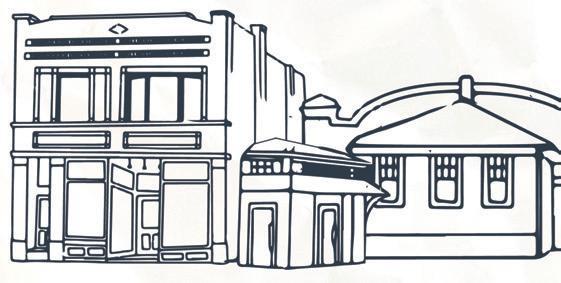










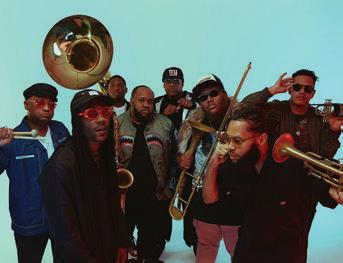







still with your husband and still interested in having vanilla sex with him, I’m gonna assume your husband recognized how he failed you on those occasions when you were violated and that he’s shown remorse, apologized specifically and profusely, and made whatever changes he needed to make for you to feel safe with him. If he’s done none of those things— if he hasn’t done all of those things—you should leave him.
for anything” virgins—and he didn’t rush you into anything. Six years went by before you had your first threesome. And while MMF threesomes probably aren’t something you would’ve sought out on your own, MYBOD, I’m hoping you enjoyed some of them—you know, the ones that didn’t involve boundary violations so egregious that you experienced them not as sexual adventures you were having with your husband, but as sexual assaults your husband participated in and Jesus Fucking Christ on the Cross.
game enough to give him your blessing to get his kink on with other people. So you haven’t stopped being GGG. You’re being GGG in a different way now.
He needs to respect boundaries and your appetite for vanilla sex.
By DAN SAVAGEQ : Is it ever ok to stop being GGG? I’ve been with my husband for 26 years. Shortly a er we got together, my husband disclosed a major kink: MFM threesomes. I was young and a virgin and up for anything then, but we didn’t start hooking up with other men until around year six of our relationship. Over the last 20 years we’ve been on and off with this. We had children, we took a break, and we found the time to go wild now and then. My husband’s interests expanded into dominance play—owning me and sharing me—but I’m in my late 40s
now and my husband is in his 50s. I’m approaching menopause and my sex drive has decreased. There were also instances where I was basically sexually assaulted— or at the very least, my boundaries were not respected on more than one occasion. Long story short, I want to be done being kinky. I want my body to be mine. My husband and I have been having other marital problems, and he thinks my rejection of his kinkiness is a rejection of him. I’ve told him I’m still interested in sex, I’m just tired of being GGG. He says he isn’t interested in
vanilla sex with me because he is “disappointed.” When I told him to outsource his kink, he said, “Good luck finding that as a married man.” Am I ever allowed to retire from his kink? Am I the asshole here? —MY YEARS BEING OBEDIENT DONE
A : First and most importantly, if your husband stood by and did nothing while your boundaries were violated in front of him—or if he violated your boundaries himself—then there’s an asshole in this marriage, MYBOD, and it ain’t you. But seeing as you’re
Zooming out for new readers: GGG stands for “good, giving, game.” As in, “good in bed, giving of pleasure, and game for anything—within reason.” I believe we should be GGG for our partners and that our partners should be GGG for us. Being GGG, however, does not mean doing whatever your partner wants. That’s why the final G has always come with that italicized-for-emphasis qualifier: “game for anything—within reason.” Being game means recognizing your partner will have sexual interests that you don’t share and being up for giving those things a try—so long as they’re reasonable. “Reasonable” is a subjective standard, of course, and we all get to decide for ourselves what may or may not be reasonable.
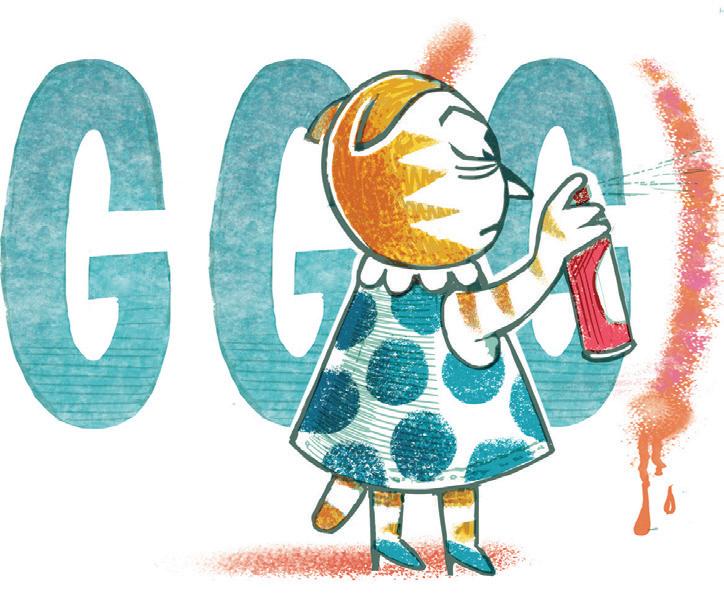
Back to you, MYBOD. A kink for MMF threesomes is not a thing for feet or light spanking. It’s a big ask. And if your husband knew he needed MMF threesomes to feel sexually fulfilled, sharing that when he did—early in the relationship—was the right thing for him to do. He laid his kink cards on the table before you got married, before you had kids, and when you could easily walk away. You didn’t walk away. You told him you were open to the idea—you told him you were one of those rare “up
In all honesty, MYBOD, I’m having a hard time getting past those boundary violations. But seeing as you got past them—seeing as you’re still interested in being with your husband—I’m going to continue to assume he somehow made things right and advise you accordingly. If he didn’t make things right, disregard my advice and divorce the motherfucker already.
Alright, you asked me if you can stop being GGG, MYBOD, and my answer is no. I think you should continue being GGG. That doesn’t mean you have to continue having MMF threesomes with your husband. You can decide you’re done with that—you can take them from the menu permanently—while still being GGG in other ways. You’re also allowed to be done with dom/sub play. (Your husband never owned you and your body was never his to share. That was naughty dirty talk you indulged in, not a deed of sale you have to honor.) And doing what you’re doing—giving your partner permission to get a specific sexual need met elsewhere—is one way a person can be GGG. There’s this need, this kink of his, that’s important to him—so important he brought up early on— and you met that need for a long time but can’t meet it anymore. But you’re good enough, giving enough, and
And just as you’re not obligated to have kinky sex with your husband, MYBOD, your husband is not obligated to have vanilla sex with you. If you think he’s withholding sex right now because he’d disappointed, well, maybe you can see how it might be disappointing and give him a little time to get over it. But if, on the other hand, you think he’s withholding sex to manipulate you into having threesomes again, MYBOD, that’s a deeply shitty thing to do and you should leave him.
P.S. Please show this to your husband, MYBOD: Dude. GET OVER YOUR DISAPPOINTMENT ALREADY. You had a good run. I hope you’re grateful and I hope you found some way to make up for boundary violations. Assuming you did: The sooner you stop fucking sulking and start fucking looking, the sooner you’ll find couples seeking male thirds. And you know those couples are out there because you and your wife used to be one of those couples. And far from being a stumbling block, the fact that you’re married is a selling point for many couples seeking thirds. (A married or partnered man is seen as less threatening for obvious reasons.) And I don’t know if you’ve been online recently, but hot daddies are very much in demand these days, and dominant daddies get a lot of play. Your wife isn’t taking your kink from you. She’s telling you to get this need met elsewhere. You are not being wronged. Stop being a baby and an ingrate. Jesus! v
Send letters to mail@ savagelove.net. Download the Savage Lovecast at savagelovecast.com. @fakedansavage



COMEENJOYFOURSTAGESOFLIVE
JOHNPRIMER&THEREALDEALBLUESBAND
KENNY“BEEDYEYES”SMITH • MELODYANGEL
BIGJAMES&THECHICAGOPLAYBOYS•BOBSTROGER


MISSISSIPPIGABECARTER • HARMONICAHINDS
GERRYHUNDT'SLEGENDARYONE-MAN-BAND
NICKALEXANDER • ERICNODEN&JOEFILISKO
GREASYGRAVYDUO:MATTHENDRICKS&RICKSHERRY

MILWAUKEESLIM • JIMMYBURNS

PLUS! FOOD,TOURS,&MORE!






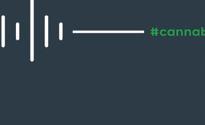
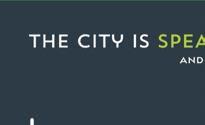






Book Club members receive an additional 10% off at the following stores:
The Book Cellar | 4736 N. Lincoln 60625 773-293-2665 | bookcellarinc.com
Bookie’s | 10324 S. Western 60643 312-890-3860 | bookiesbookstores.com
Bucket O’Blood Books and Records | 3182 N. Elston 60618 312-890-3860 | bucketoblood.com
The Dial Bookshop | 410 S. Michigan, 2nd Floor 60605 dialbookshop.com
Madison Street Books | 1127 W. Madison 60607 312-929-4140 | madstreetbooks.com
Pilsen Community Books | 1102 W. 18th St. 60608 312-478-9434 | pilsencommunitybooks.com
Roscoe Books | 2142 W. Roscoe 60618 773-857-2676 | roscoebooks.com
Semicolon | 515 N. Halsted 60642 312-877-5170 | semicolonchi.com
Seminary Co-Op Bookstore | 5751 S. Woodlawn 60637 773-752-4381 | semcoop.com

We’re continuing the conversation! Watch for the next Reader Cannabis Conversations on September 30, 2021


Space is limited. Reserve your spot now. For more information, contact ads@chicagoreader.com

Volumes Bookcafe | 1474 N. Milwaukee 60622 773-697-8066 | volumesbooks.com
Women & Children First | 5233 N. Clark 60640 773-769-9299 | womenandchildrenfirst.com

This yearlong partnership with independent bookstores is supported by the Poetry Foundation.



Mikki Kendall
Hood Feminism: Notes From the Women That a Movement Forgot
Author Talk: Oct. 22, 2020
Sonali Dev
Recipe for Persuasion
Author Talk: Nov. 19, 2020
Riva Lehrer Golem Girl
Author Talk: Dec. 17, 2020
Emil Ferris
My Favorite Thing Is Monsters
Author Talk: Jan. 28, 2021
Eve Ewing
1919
Author Talk: Feb. 25, 2021
Nnedi Okorafor Remote Control
Author Talk: Mar. 25, 2021
Natalie Moore
The South Side
Author Talk: Apr. 22, 2021
Rebecca Makkai
The Great Believers
Author Talk: May 26, 2021
Fatimah Asghar
If They Come for Us
Author Talk: June 24, 2021
Presented by:
Kayla Ancrum
Darling
Author Talk: July 22, 2021
Jessica Hopper
The First Collection of Criticism by a Living Female Rock Critic
Author Talk: Aug. 26, 2021
Precious Brady-Davis
I Have Always Been Me: A Memoir
Author Talk: Sep. 23, 2021
Book Club membership includes:
Exclusive access to conversations between Authors and the Reader Discounts to your favorite independent bookstores



A curated monthly newsletter A members-only discussion forum

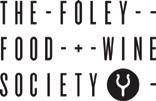




Special offers from Reader partners
Jessica Hopper is a music critic, producer, and author based in Chicago. In a career spanning more than 20 years, Hopper has earned acclaim as a provocative, fearless music journalist.
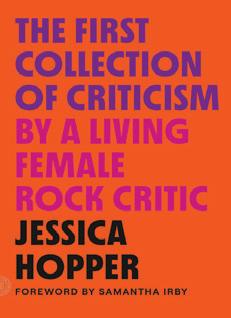
She has written for GQ, Rolling Stone, The New York Times Magazine, The Guardian, Elle, and Bookforum. She is a long-time contributor to the Chicago Reader, and she was also a columnist for the Village Voice, Chicago Tribune, and Punk Planet, as well as the music consultant for This American Life for eight years. Her first book, The Girls Guide To Rocking (Workman, 2009), was named a Notable Book for Young Readers by the American Library Association.
She is the author of The First Collection of Criticism By A Living Female Rock Critic and the 2018 music memoir Night Moves. She was formerly the editorial director at MTV News, and senior editor at Pitchfork and Rookie. Her essays have appeared in Best Music Writing for 2004, 2005, 2007, 2010, and 2011. She is series editor of The American Music Series at the University of Texas Press. In 2019, Hopper served as host and executive producer for KCRW’s popular music history podcast, Lost Notes. Her forthcoming books, No God But Herself: How Women Changed Music in 1975 (Fall 2022) and a revised and expanded second edition of The First Collection (2021), are both due from MCD/Farrar, Straus and Giroux.

Leor Galil serves as the Reader’s music writer. He began freelancing for the Reader in 2010, and joined the staff in 2012. In 2017, Reader readers voted him the third best pizza in Chicago. Smash Mouth is a fan of his work.
Presented by:

1981

Got an extra $350 a month to throw around? Why not rent a “LARGE 4 bedroom Victorian type apartment” in Wrigleyville? Okay, so you’ll have to travel back in time to October 9, 1981. Still worth it.
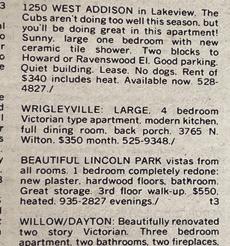
1982
In this clip from the June 18, 1982 issue of the Reader, N.C. Gitz covers Allan Berube’s attempt to write the story of gays and lesbians during WWII. Berube’s doc, Marching to a Different Drummer, was shown during Pride week activities that year.
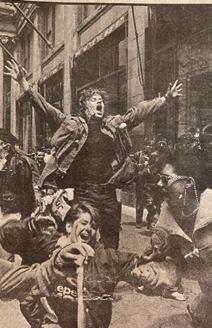
1983
The Reader’s Guide to the Music Scene in the March 25, 1983 issue led readers right to the Psychedelic Furs show at Harper College.

1984
Margo MacFarland delves into the CTA’s responsibility to make public transit accessible in this installment of Neighborhood News from the August 10, 1984 issue.
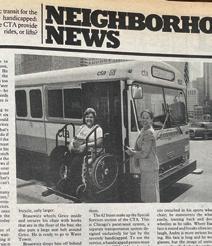
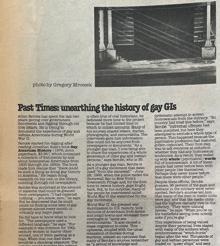
FOR DAILY UPDATES (MON.-FRI.), FOLLOW THE CHICAGO READER ON INSTAGRAM, FACEBOOK AND TWITTER; OR CHECK OUT chicagoreader.com/50
The “Hot Type” from the August 16, 1985 issue covered South Africa, dishonest aldermen and Peter Ueberroth.
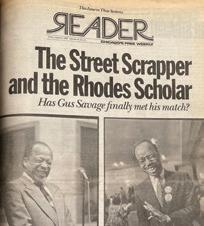
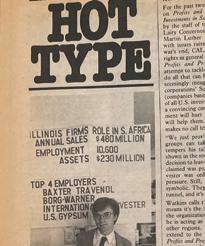
1988
Before The Simpsons (and for the first few years of The Simpsons), there was Life in Hell, Matt Groening’s iconic strip. This installment hit the stands April 8, 1988.
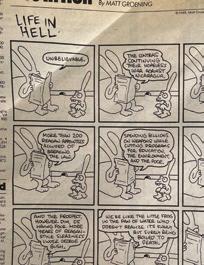
The kids were alright in this photo by M. Pahl, accompanying John Stevenson’s January 31, 1986 cover story on the Rads, “a new wave of political awareness, a new radicalism” among teenagers of the time.
1987
The IVI/IPO announced their endorsements for mayor, treasurer, and the city council in this ad from the April 3, 1987 issue. Looks like a lot of people punched 18!
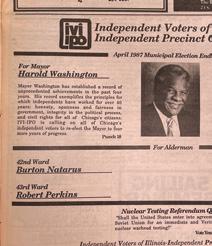
1989
Film reviewer Jonathan Rosenbaum didn’t hold back in this one-star June 2, 1989 review of Indiana Jones and the Temple of “Dumb.”
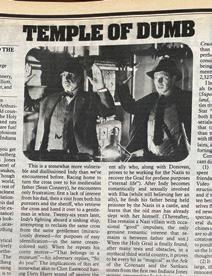
1990
This cover story of the March 9, 1990 issue by Florence Hamlish Levinsohn (with pics by Marc PoKempner) asks if incumbent congressman Gus Savage had met his match in up-and-comer Mel Reynolds. The answer, in time, turned out to be ‘Yes, but ... .’
Project Manager. Chicago, Illinois. Plan and coordinate technical activities and project designs for architectural projects pursuant to direction from licensed architect. Work with: Rhinoceros – Level 2 Certification; Autodesk
Certified Professional in Revit for Architectural Design; AutoCAD, Revit; SketchUp, Dynamo, 3D MAX, V-Ray., Maxwell; Adobe Creative Suite, Microsoft Office, Grasshopper and QGis. Required education: bachelor’s degree in architecture/ related AND Required certifications: Rhinoceros - Level 2 Certification; and, Autodesk Certified Professional in Revit for Architectural Design. NO PHONE CALLS. Forward resumes to: Studio Gang Architects, Attn: Amy Lawlor, Ref. AR, 1520 W. Division Street, Chicago, IL 60642
Public Relations Specialist. Req’d: BA’s in Public Relations, Communication, or rel. Work Site: Wood Dale, IL 60191
Mail Resume: ALLSTATE INT’L FREIGHT USA INC, 1250 W Artesia Blvd., Compton, CA 90220
JOBS
ADMINISTRATIVE SALES & MARKETING
GENERAL REAL ESTATE RENTALS FOR SALE
NON-RESIDENTIAL PROFESSIONALS & SERVICES
CLEANING
LEGAL NOTICES ADULT SERVICES
Data Analyst: provide analytical support for business operations.
Req. bachelors in economics, mathematics, statistics or rel. fld. + 2 yrs exp. Apply: CS Cabinet LLC, 3048 W 48th Place, Chicago, IL60632
AllCell Technologies, LLC seeks Project Engineer in Broadview to mdl cmplete sys usng
Thrml FEA Sims & Ht Trnsfr Analy to guide thrml dsgn of prdcts. Req BS in Mech Eng or rltd fld + 18 mths exp rltd occ + 18 mths exp in: Li-ion cels & battry tsting w/ phas chng thrml sys dsgn; wlding usng ht trnsfr, energy blnce, & thrml FEA Sims; GD&ASME Y14.5; mltiphyscs sims cmbining elec & thrmal analy. Mail resumes to John Ficarra 2600 S 25 Ave, Broadview, IL 60155
AK Information Technologies, Inc. in Rolling Meadows, IL is seek’g
NextCapital Group, Inc. is seeking a Financial Engineer in Chicago, IL to dvlp & maintain proprietary retirement asset allocation benchmark methodology, design updated optimization and smoothing methodologies, and programmatically define the universe of mutual funds. Please email resume to kocolj@ nextcapital.com & ref 14345.
NextCapital Group, Inc. is seeking a Lead DevOps Engineer in Chicago, IL to design & improve the deployment process & automation across the organization. Please email resume to kocolj@nextcapital.com & ref 16287.
Mount Sinai Hospital Med. Ctr. of Chicago seeks Data Engineer (2 positions) to collect, aggregate, store, & reconcile data to support business decisions.
Arcus Technologies, Inc. dba Kat Tech Systems, Inc. in Arlington Heights, IL is seeking ( A) DevOps Engineers to dsgn & dvlp apps using devops tools; (B) Big Data Engineer/Data Architects to analyze, dsgn & dvlp data related rqmt by leveraging big data cloud tools; ( C) Software Developers to dsgn & dvlp SW apps. No trvl/no telecom. Pos’ns are proj-based @ unanticipated sites w/in U.S. Relo may be req’d @ proj end. Mail resumes to: Arcus Technologies, Inc. dba Kat Tech Systems, Inc., ATTN: HR, 855 E. Golf Road, Ste. 1126, Arlington Heights, IL 60005.
(St. Charles, IL) Nidec Mobility America Corporation seeks Customer Quality Engineer w/ Bach deg in ME or IE & 1 yr exp in job offered or in auto indus. Also acceptable Mast deg in ME or IE & 6 mnths exp in job offered or in auto indus incl IATF 16949, FMEA, CP, MSA,PPAP, SPC. Occas intl & dom trvl reqd. Apply to HR 3709 Ohio Ave, St. Charles, IL, 60174
Logistics Analyst. Req’d: BA’s in Business Admin., Econ., or rel. Work Site: Wood Dale, IL 60191. Mail Resume: Allstate Int’l Freight USA Inc., 1250 W Artesia Blvd., Compton, CA 90220
A) Cloud Technical Developers to dvlp & implmnt custom apps, Cloud ERP apps & reports as per client reqmnts; & B) Cloud Technical Developers III to coord & oversee the dvlpmnt & implmntn of custom apps, Cloud ERP apps & reports as per client reqmnts. No trvl; no telecomm. All post’ns are proj-based @ long-term proj’s @ var unanticipated client sites w/in the U.S., & relo may be req’d @ the end of each long-term proj. Mail Resumes to: AK Information Technologies, Inc., Attn: HR, 5105 Tollview Dr., Ste. 195, Rolling Meadows, IL 60008.
TECHNOLOGY
ServiceNow Inc is accepting resumes for the following position in Chicago, IL. Staff Software Engineer (5144): Responsible for coding tasks across entire stack of application. Act as technical lead to a small group of developers responsible for discrete application functionality. Mail resume to ServiceNow Inc, Attn: Global Mobility, 4810 Eastgate Mall, San Diego, CA 92121. Resume must include job title, job ref. #5144, full name, email & mailing address. No phone calls. Must be legally authorized to work in U.S. without sponsorship. EOE.
Employment: Hair Stylists and Color Specialists needed at - 57th Street Salon in Hyde Park, Chicago. Applicants must be licensed and able to cut hair with scissors. Trainees are welcome. Submit application to 57thstreetsalon@gmail.com.
Reqs. bachelor’s in comp. sci., comp. engg., info. sys, rltd or equiv. + 5 yrs. exp. as Data Engg. or rltd. Will accept master’s + 3 yrs. exp. Exp. must include Sequel Server, SSIS, Talend, or similar ETL tool; writing advanced T-SQL queries, developing stored procedures, triggers, views, key database assets; performing data integrations & processing via CSV\XML file\message types; performance tuning SQL queries & strong table design, DML. Mail resume to S. Rayner, HR, 1500 S. Fairfield Ave., Chicago, IL 60608.
TransUnion, LLC seeks Engineers – IT Enterprise Apps for Chicago, IL location to design, implement & maintain sw sys & IT infrastructure. Master’s in Comp Sci/Mngmt Info Sys/ related field + 2yrs exp. or Bachelor’s in Comp Sci/ Mngmt Info Sys/related field +5yrs exp. req’d. Req’d skills: Splunk, VBA Scripts, PowerShell, Visio, Tableau, SQL, time series analysis. Telecommuting permitted. Send resume to: A. Goodpasture, REF: FS, 555 W Adams, Chicago, IL 60661
Architectural Intern: Professional in-house unlicensed Architectural Intern, supervised by licensed Architect under contract, working on exterior & interior building renovation & remodeling projects for real estate property mgmt company. Chicago, IL location. Send resume to: Wilson Property Mgmt, LLC, 2035 W Giddings St, Chicago, IL, 60625, Attn: A. Schcolnik.
Business Analyst – Calculate/administer commission compensation program; prepare commission, sales, analytical reports; data/analysis for applicable salesperson promotions; enter employee information within ERP sys and Intranet; resolve issues from sales/ support; communicate w management and intl colleagues; evaluate commission process for areas of improvement - suggest findings and implement; maintain confidentiality of sales figures, commission data and sensitive/confidential info. Reqd: BS in Finance, Accounting, or Biz Mgmt; 6 months exp programming (Excel VBA or Python) and increasing efficiencies or reducing runtimes in prior engagements; 3 months exp w large datasets and databases; and perm US work auth. Exp may be concurrent. Send cvr ltr and resume to N Bandukwala, HR, Brainlab, Inc., 5 Westbrook Corporate Center, Suite 1000, Westchester, IL 60154.
Slalom’s Chicago office has openings for SENIOR ARCHITECTS: Identify & develop technology solutions for clients. TO APPLY: Go to www.jobpostingtoday. com, search for job code 58411 & submit resume.
TransUnion, LLC seeks Managers for Chicago, IL location to manage sw app solutions. Master’s in Comp Sci/Comp Eng/any Eng field +2yrs exp. or Bachelor’s in Comp Sci/Comp Eng/ any Eng field +5yrs exp. req’d. Req’d skills: hands on sw dev exp w/ SQL, relational & non-relational databases, query optimization, data modeling; building & leading Agile teams to dev back-end data apps & services to support analytics platforms; deploying & implementing leading-edge analytics environments incl. sw, end-user tools; maintaining availability & quality of multi-Petabyte platforms; troubleshooting issues, manage capacity, & planning for the optimization & expansion of environments; data integration using Ab-Initio, Linux, shell scripting, system admin, Big data technologies MapR, Apache, Hive, Hadoop, Spark, Java, Agile/Scrum, Git, CI/CD, Autosys, Tableau, Dremio. 20% telecommuting permitted. Send resume to: A. Goodpasture, REF: VG, 555 W Adams, Chicago, IL 60661
Software Developers, Schaumburg, IL: Create Splunk apps searches Data models dashboards and Reports using the Splunk query language. Design solutions and concepts for data aggregation and visualization. Architect and deploy clustered/distributed Splunk Enterprise 7 .x implementations to large, complex customers. Travel/reloc to various uantic locs. Send res to: Rigelsky Inc., 120 W. Golf Rd, Suite 106, Schaumburg, IL 60195.
12x10 room for rent in a 2 bed, 1 bath garden unit at Lunt and Wolcott. Utilities included and in unit washer dryer close to Metra stop. Call Aaron at 847-875-9422 to schedule an appointment. Rent is $650/ month for September 1st.
Moogoong Terrace 4848 North Kedzie Avenue, Chicago, IL 60625 (773) 478-0085
Waiting List Open for 1 Bedroom Subsidized Apartments - Seniors and Disabled Application Period from August 23, 2021- September 17, 2021. Interested persons should contact the Management Office for an application by Calling (872)302-4878 Young Park or (773)4780085 or Pick-up during office hours MWF 10:00 a.m. - 4:00 p.m. Income
Restricted
CLEANING SERVICES
CHESTNUT ORGANIZING AND CLEANING
SERVICES: especially for people who need an organizing service because of depression, elderly, physical or mental challenges or other causes for your home’s clutter, disorganization, dysfunction, etc. We can organize for the downsizing of your current possessions to more easily move into a smaller home. With your help, we can help to organize your move. We can organize and clean for the deceased in lieu of having the bereaved needing to do the preparation to sell or rent the deceased’s home. We are absolutely not judgmental; we’ve seen and done “worse” than your job assignment. With your help, can we please help you? Chestnut Cleaning Service: 312-332-5575. www.ChestnutCleaning. com
Email details to classified-ads@chicagoreader.com
NOTICE OF PUBLIC SALE OF PERSONAL PROPERTY
Notice is hereby given that pursuant to Section 4 of the Self-Storage Facility Act, State of Illinois, that Chicago Northside Storage-Lakeview / Western Avenue Storage LLC will conduct sale(s) at www.storagetreasures. com by competitive bidding starting on Monday September 6th until Monday September 13th @ 8:00 am for where the property has been stored, Chicago Northside Storage 2946 N Western Ave. Chicago, IL 60618. 773305-4000. In the matter of the personal property for the individual listed below, Chicago Northside Storage-Lakeview / Western Avenue Storage LLC. Britney Kranz O37, Robert Casarietti P07, Debra Strazzabosco N06, Rosario Padilla N31. Purchases must be made with cash only and paid at the time of sale’s redemption. All goods are sold as is and must be removed within 72 hours after the time of purchase. Sale is subjected to adjournment.
NOTICE OF PUBLIC SALE OF PERSONAL PROPERTY
Notice is hereby given that pursuant to Section 4 of the Self-Storage Facility Act, State of Illinois, that Chicago Northside Storage - Old Town will conduct sale(s) at www.storagetreasures. com by competitive bidding starting on Friday September 17th 2021 and end on Thursday September 23rd 2021 at 8:00am on the premises where property has been stored, which are located at Chicago Northside Storage - Old Town, 1516 N Orleans St, Chicago IL 60610 312-787-2800. In the matter of the personal property for the individual listed below, Greta Neppl 2114-D, Jerry Smith 3476, Melody Hamblet 1408, . Purchases must be made with cash only and paid at the time of sale’s redemption. All goods are sold as is and must be removed at the time of purchase. Sale is subjected to adjournment.
Zen Meditation Practice. Sunday mornings, Bultasa Buddhist Temple, 4360 Montrose Avenue 10 AM - Noon 815 701
7733. Bultasa Zen Group on Meetup and Facebook. Korean Zen Master Seung Sahn tradition.
Have you had an unwanted sexual experience since age 18? Did you tell someone in your life about it who is also willing to participate?
Women ages 18+ who have someone else in their life they told about their experience also willing to participate will be paid to complete a confidential online research survey for the Women’s Dyadic Support Study. Contact Dr. Sarah Ullman of the University of Illinois at Chicago, Criminology, Law, & Justice Department at ForWomen@ uic.edu, 312-996-5508. Protocol #2021-0019.
Danielle’s Lip Service, Erotic Phone Chat. 24/7. Must be 21+. Credit/ Debit Cards Accepted. All Fetishes and Fantasies Are Welcomed. Personal, Private and Discrete. 773-935-4995
54 yo Caucasian male seeking a discreet beautiful lady for companionship and great times
I’m into theater the Arts, travel dancing and am passionate and a romantic at heart. Email incognitokt@ yahoo.com
Married + Bored Discreet and fun, Attractive and fit, sensual and interesting Toddlau735@gmail.com
Just what the doctor ordered!
30-something suburban doctor (Skokie) in search of 20-something city dwelling playmate for conversation and sensual play dates. Looks not important but chemistry is. icea123@gmail.com
Let’s have coffee Seeking partner to have adventures withAttractive, bi-racial SF, 57 yo - interests include: good conversation, current events, long walks, fitness, cooking, a good book, live music, theater, comedy seeks SBM 55-60 yo with similar interests for friendship possibly more 312-291-1366
Submit your Reader Matches ad today at chicagoreader. com/matches for FREE. Matches ads are not guaranteed and will run in print and online on a spaceavailable basis.

The Chicago Housing Authority (CHA) is releasing the Proposed FY2022 MTW Annual Plan for public comment.
The 30-day public comment period begins August 10 and ends September 8. CHA encourages and welcomes all public housing residents, HCV Program participants and the community-at-large to review the Proposed FY2022 MTW Annual Plan and submit comments.
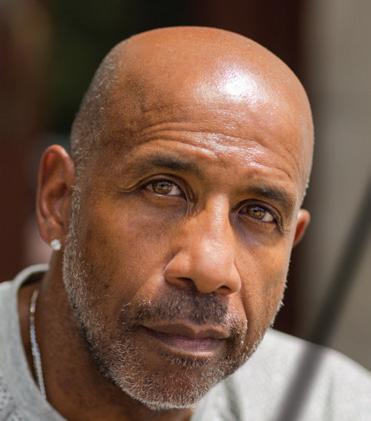


The 30-day public comment period will be held for CHA to receive written comments starting on August 10 through September 8, 2021. Due to COVID-19 restrictions on public meetings, CHA will livestream three public comment hearings. The dates and times of the public comment livestream hearings are as follows:
Tue, Aug 17, 6:00 pm: https://youtu.be/1wYOhykGIyU
Fri, Aug 20, 10:00 am: https://youtu.be/jRBUtfRdJDg
(A recording of the livestream will be available in Spanish following the hearing.)
Wed, Aug 25, 2:00 pm: https://youtu.be/nXm74M4hDOc
We ask that comments pertaining to the Annual Plan be submitted electronically to commentontheplan@thecha. org prior to each comment hearing or submitted in the chat during the livestream. All comments will be added to the comment grid and receive a response during the livestream and/or in writing in the comment grid.



If you require translation services, please read the attached notice or check with your property manager for more details.
A summary and the full Proposed FY2022 Annual Plan will be available on CHA’s website at www.thecha.org beginning August 10 until September 8, 2021. You may also mail or fax comments for the Proposed FY2022 MTW Annual Plan. All comments must be received by September 8, 2021.
Mail, E-mail or Fax comments to: Chicago Housing Authority


Attention: Proposed FY2022 MTW Annual Plan 60 E. Van Buren Street, 12th Floor Chicago, IL 60605 commentontheplan@thecha.org
Fax 312.913.7837

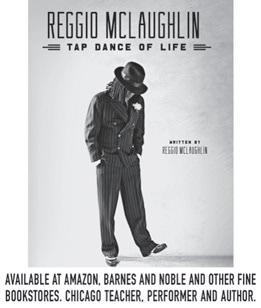
Ifyouhaveaquestionaboutthisnotice,pleasecalltheCHAat312.913-7300. Torequestareasonableaccommodation,pleasecall312.913.7062.

TTY 866.331.3603




















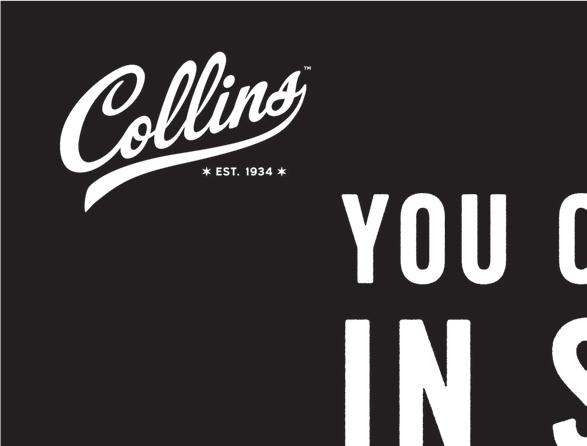
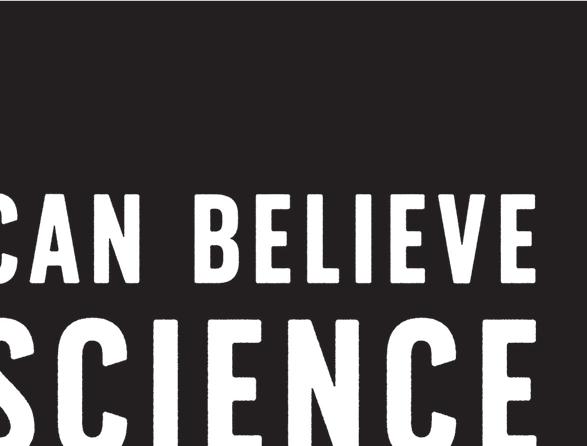



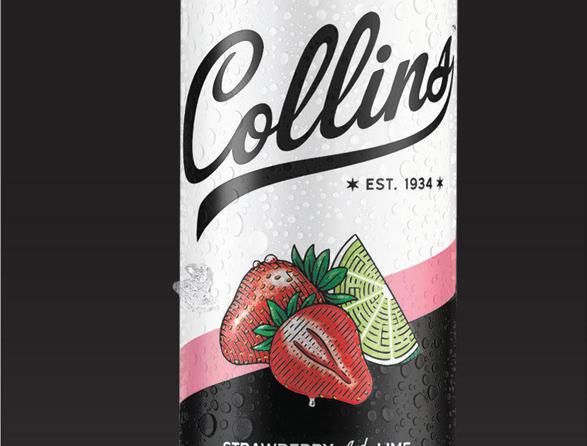
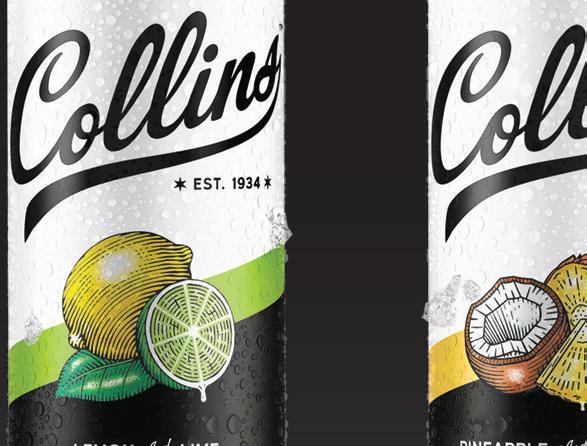


The Department of Cultural A airs and Special Events (DCASE) originally planned to celebrate the Year of Chicago Music in 2020. Then the pandemic diminished those festivities to the point that the city declared 2021 the Year of Chicago Music too.
The ongoing surge of the Delta variant means the U.S. won’t be rid of the pandemic this year. The New York Times COVID-19 tracker says at least 620,000 Americans have died of the virus, and that number will keep growing as the unvaccinated remain on the fence about a “personal choice” that a ects everyone. In Cook County, 60 percent of residents ages 12 and up are fully vaccinated, which mitigates but doesn’t eliminate the danger to public health.
Chicago officially reopened June 11, and with it live music began a gingerly return. The city’s music venues—where artists, fans, and live production professionals convene for a few magical, impossibleto-replicate hours—have largely begun hosting shows again. In response to the Delta variant, most are
requiring proof of vaccination or a recent negative COVID test for entry. If you’re going to a concert, check with the venue first to learn its current policy.
Celebrating the Year of Chicago Music in 2021 is certainly safer than it would’ve been in 2020, and DCASE has declared a citywide monthlong festival called Chicago in Tune that runs from Thursday, August 19, till Sunday, September 19. None of the city’s usual downtown festivals is happening this year, but DCASE will honor Chicago’s rich musical heritage with plenty of programming at Pritzker Pavilion and in other parks. Chicago in Tune also includes forprofit festivals such as Ruido Fest, the Lyrical Lemonade Summer Smash, the Pitchfork Music Festival, and Riot Fest.
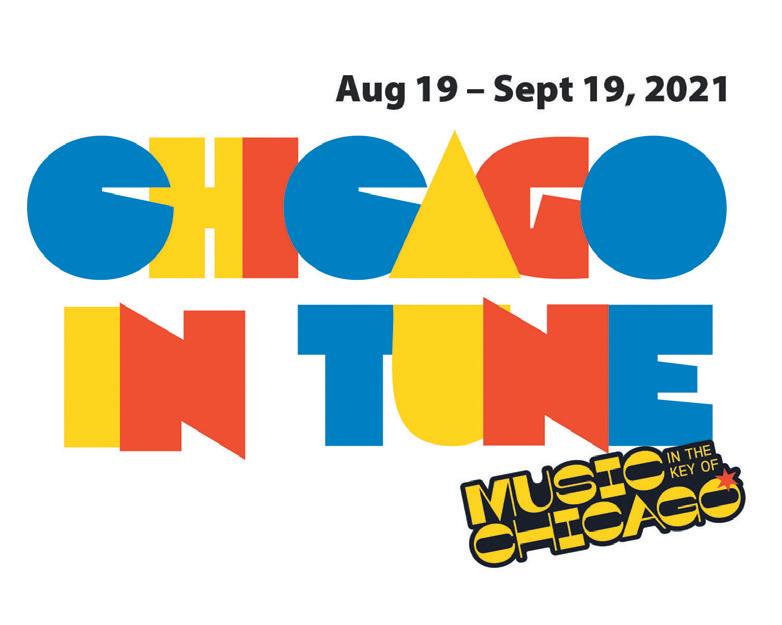
In fact, Chicago in Tune includes every concert in every venue in the city for a month. It’s more a name than an event, and it’s an exhaustively inclusive name—which means this Reader guide couldn’t possibly be complete. Instead it provides an entryway to the thrilling depth and diversity of the city’s music
communities.
Music brings people together unlike any other art form, but COVID-19 continues to make it complicated to gather. Breakthrough infections in vaccinated people are a minuscule fraction of new cases, but seeing live music necessarily carries at least a small risk. It’s up to you to decide what you can tolerate: Packed into a club, or standing on your own in a park? In any case, please bear in mind the danger you could pose to everyone else, especially kids and others who can’t be vaccinated—get your shots, wear a mask, and encourage people in your life to follow suit.
The Reader ’s guide to Chicago in Tune includes interviews with people in di erent parts of the local scene, essays on genres with deep roots in the city, and a dozen curated lists of concerts. For information on shows not included here, visit Do312’s Chicago in Tune concert calendar. And however you decide to celebrate, make safe choices so that everybody who can bask in the glory of live music will still have the chance to do it tomorrow. v
a multi-media project by Chicago graphic art studio Sonnenzimmer and Maya Bird-Murphy of Chicago
Mobile Makers, will pay tribute to the spaces, places, and people that have shaped Chicago’s music landscape, past and present. Graphic markers, website, performances and more launch August 29.
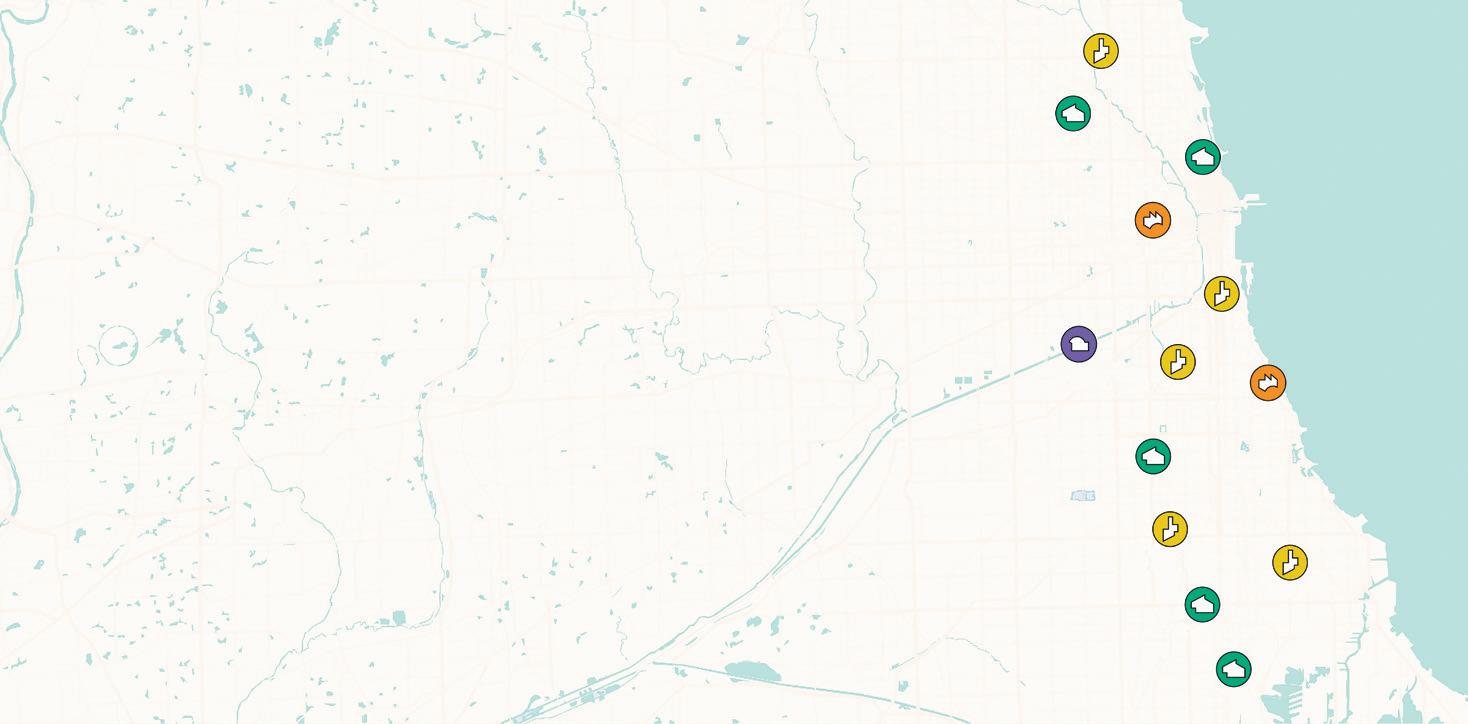

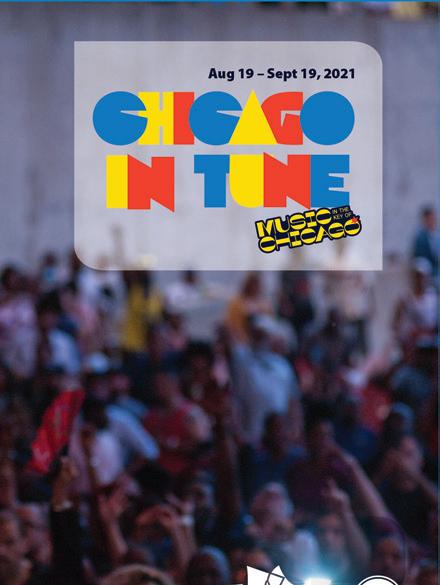
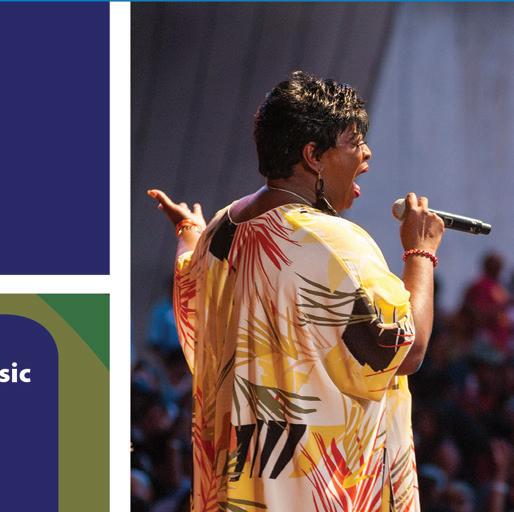
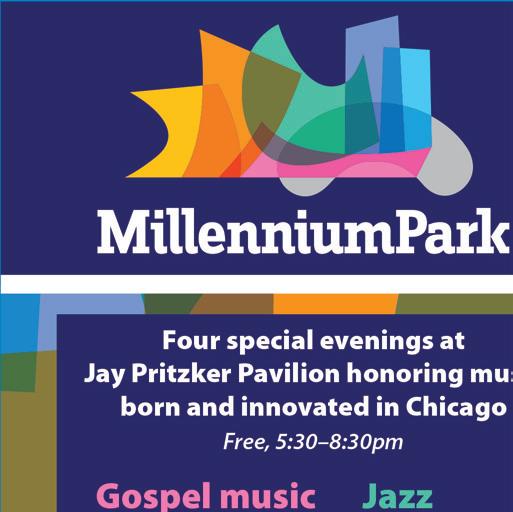
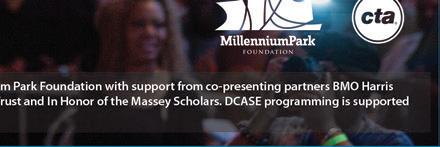
The Department of Cultural Affairs and Special Events couldn’t present many events, but it found lots of other ways to support artists and venues.
By READER STAFFWhen COVID-19 swept the country, music venues were among the first to shutter, throwing tens of thousands of live entertainment professionals out of work and sidelining artists who depend on touring income. The National Independent Venue Association formed in April 2020 and currently represents more than 3,000 performance halls, promoters, and festivals; it’s done much of the heavy lifting during the push for government financial support of these crucial community hubs. NIVA’s call to arms laid out the stakes bluntly: independent venues were the first to be closed and would be the last businesses to reopen at the end of the pandemic. A June 2020 NIVA survey of roughly 2,000 music-industry professionals revealed that 90 percent of independent venue owners and promoters expected they’d be forced to close up shop permanently without aid.
COVID-19 of course threatened not just venues but also the fan and artist ecosystems they foster and the people who form those communities. Chicago’s Department of Cultural A airs and Special Events (DCASE) did its part to help the local arts community through this era-defining turbulence—which fell during what was intended to be the Year of Chicago Music. “The first thing we wanted to do—and it surely wasn’t just for musicians, but with a special emphasis in the Year of Chicago Music—is to do everything we could to help support arts relief for the Chicago arts landscape,” says outgoing DCASE commissioner Mark Kelly.
That included launching the Performing Arts Venue Relief Grants Program with support from the only slightly less new Arts for Illinois Relief Fund as well as the Walder Foundation. In October 2020, DCASE invited
local for-profit and nonprofit venues to apply for $10,000 slices of a $1.2 million pie. “We were able to make awards to over 100 organizations,” Kelly says. “Was it enough? No, but it helped keep everyone afloat.”
That initiative went public two months after DCASE announced the recipients of its 2020 CityArts Program grants, which distributed $2 million among 191 nonprofit arts organizations. The National Endowment for the Arts chipped in too, providing DCASE with $250,000 as part of the CARES Act. The CityArts grants were split into two categories: general operating grants ranging from $2,000 to $30,000 (35 of which went to music organizations), and special project grants aligned with the Year of Chicago Music, which ranged from $2,500 to $56,200. (Full disclosure: the Reader received a special project grant.) Among the recipients are classical music school Access Contemporary Music, urbanarts youth- development program Kuumba Lynx, and the Chicago Jazz Philharmonic.
DCASE also helped artists one at a time, and last year’s Individual Artists Program grants came through right when they needed to; the city announced the grantees at the beginning of April, just weeks into the pandemic. DCASE bestowed grants on more than 160 artists to help them complete a specific piece of work. “In a typical year, about 20 musicians would receive awards,” Kelly says. “But in the Year of Chicago Music, we got a lot more music applications.” Nearly 60 musicians received grants ranging from $850 to $5,000, including trans pop singer-songwriter Ellie “SuperKnova” Kim, euphoric rapper Clinton “ShowYouSuck” Sandifer, jazz saxophonist Dustin Laurenzi, and multidisciplinary composer and performer Ayanna Woods.
“We also for the first time had our Esteemed Artist Awards,” Kelly says. “These are $10,000 awards, and seven musicians in 2020 received that award.” Only 13 people received this highly prized DCASE grant, and the seven musicians among them were more than worthy:
jazz vocalist Dee Alexander, Radio Free Honduras founder and guitarist Charlie Baran (aka Carlos Barahona), blues veteran Katherine Davis, Dolly Varden bandleader Steve Dawson, contemporary classical pianist Mabel Kwan, jazz-scene linchpin Mike Reed, and blues singer and drummer Larry Taylor.
DCASE also helped organize and fund virtual performances that gave local musicians much-needed paydays, sometimes replacing its beloved summertime series with Web-only events. SummerDance in Place, for example, moved SummerDance’s usual dance lessons

and concerts into the online space, helping folks learn salsa, swing, and line dancing wherever they were. Millennium Park at Home replaced Pritzker Pavilion’s eclectic inperson shows with online sets from the likes of alt-country veteran Jon Langford and South Asian soul-fusion artist Zeshan B.
“In all this, we were just trying to hire local, get some money to musicians, put musicians in front of an audience,” Kelly says. “I think our viewership was over a half a million, which is not a small number when there was a hell of a lot of competition for eyeballs.” In the fall, DCASE also partnered with the Chicago Independent Venue League on CIVLization, a virtual concert series that benefited local concert halls, their sta , and the artists who played in them.
Supporting local musicians during the pandemic also meant helping them plan for what might come after the crisis. In April 2021, DCASE opened applications for Chicago Pre sents through the Arts77: Arts Recovery Plan. Two rounds of recipients have been announced, and the department has so far supported 52 cultural events taking place between early July and the end of October with grants of anywhere from $5,000 to $30,000.
“We realized that in order to do this safely, these might have to be micro-outdoor live in-person events,” says DCASE performing arts program director Mariam Thiam. “That involves permitting, either with the city or the parks, depending on the location, and so we have to structure it so that people understood they have to have a COVID plan in place—all these things that are really new for presenters.”
DCASE and its volunteers on the Year of Chicago Music steering committees have been scrambling to confront the pandemic for almost a year and a half now, and all their tinkering and retooling began to bear fruit when local clubs started inviting local musicians back onto their stages a few months ago. If you’ve been going to shows at all, you’ve probably seen one organized by a DCASE grant recipient or featuring a musician who’s recorded with the department’s help. And if by chance you haven’t, you’ll have plenty of chances to change that during the month of Chicago in Tune.
“I think Chicago in Tune will be the great cultural coming-out party for the city,” Kelly says. “It’s going to be everywhere, and music is going to be in every neighborhood—I think we excite Chicago and excite the world, and set a new expectation for how we support music in Chicago.” v
Kurt Elling Quartet 8 PM, Green
Foons, Million Reasons, Blondesnamedbritney 7:30 PM, Bottom Lounge, 17+
Grant Park Orchestra and Chorus
6:30 PM, Pritzker Pavilion, Millenb
Inner Wave, La Doña 10:30 PM, Cobra Lounge, 17+
Renegade Circus Cheetah Evolution featuring Mac Diesel, Juju, 8:30 PM, the Point
Reverend Peyton’s Big Damn Band, Secret Lives, Jeff Massey
7:30 PM, Reggies Rock Club Ruido Fest day one featuring Caifanes, Silverio, Los Amigos more 3 PM, Union
Matthew Skoller & Chicago Wind
7:30 PM, Epiphany Center for the Arts
Afro Fusion DJs 9 PM, Le Nocturne Chicago, 21+
Jon Anderson with the Paul Green Rock Academy 7:30 PM, Reggies Rock Club, 17+
Chicha Roots 7 PM, FitzGerald’s, Berwyn F b
Cloud Nothings, Manas 9:30 PM, Empty Bottle, 21+
Hypnotic Brass Ensemble 8 PM, the Promontory b
Jarochicanos 6 PM, Hermosa Park
F b
Little Bird, Dried Spider 8 PM, Schubas, 18+
Vino Louden, Joanna Connor
8 PM, Kingston Mines, 21+
Motherfolk, Hacky Turtles 7:15 PM, Cobra Lounge b
Sonny Falls, Cold Beaches 8 PM, Golden Dagger, 21+
Trio Nexus 7:30 PM, Epiphany Center for the Arts, 21+
Zoé 8 PM, House of Blues, 17+
FRI 8/20
Between the Buried & Me
8:30 PM, House of Blues, 17+
Bloom, Troigo 9 PM, Hideout, 21+
Blue Dream, Daisychain, Little Church 8 PM, Reggies Music
Joint, 21+
Chicago Gospel Fire Concert
featuring Gods Posse, Adrian
B. King & Reverence, New Direction, and more 7 PM, Christ
Unity Evangelistic Church F b
Cloud Nothings, Manas 10 PM, Empty Bottle, 21+
Brent Cobb, Nikki Lane 7:30 PM, Thalia Hall, 17+
Julian Daniell, Soul Honey Records 8 PM, Schubas, 18+
Electric Feels DJs 9:30 PM, Concord Music Hall, 18+
Summer Smash day one featuring ASAP Rocky, Lil Skies, Lil Tecca, Lil Yachty, and more 3 PM, Douglass Park b
Louie Vega 10 PM, Smart Bar, 21+
SAT 8/21
Alex Midi (DJ set), Kombi DJs, and more 9 PM, Simone’s, 21+
Black Is the New Black featuring Jefe 312, Heartbreak Homie, Kiraly Payne, and more 7 PM, Bourbon on Division, 21+ Cook Thugless, LAN Party, Stranded Civilians 8 PM, Beat Kitchen, 17+
Matthew Dear, Juan MacLean 10 PM, Smart Bar, 21+
Dwele 7 and 10 PM, City Winery b
Kurt Elling Quartet 8 PM, Green Mill, 21+
Erabella, Sora Kai, Speaking With Ghosts, and more 6 PM, Bottom Lounge b
Grant Park Orchestra and Chorus
6:30 PM, Pritzker Pavilion, Millennium Park F b
Nocturna featuring DJ Scary Lady Sarah 10 PM, Metro, 18+ Power Praise 2021 featuring Bishop Hezekiah Walker & Love Fellowship Tabernacle, Donald Lawrence & Company, Mark Hubbard, and more 7 PM, Cross Pointe Park, Hazel Crest b
Ruido Fest day two featuring Panteón Rococó, Mœnia, Ivy Queen, and more 1 PM, Union Park b
Silverio, Barragoon 10 PM, Reggies Rock Club, 17+
Summer Smash day two featuring Lil Baby, Baby Keem, City Girls, and more 1 PM, Douglass Park b
Victory Travelers, Pastor Roosevelt Dixon Sr., Trina Robinson 5 PM, New Friendship Missionary Baptist Church, Gary b
SUN 8/22
Deicide, Kataklysm, Internal Bleeding, Begat the Nephilim
6 PM, Reggies Rock Club, 17+
Final Frontier Land featuring Prairie School DJs 5 and 8 PM, Sleeping Village, 21+
Frequency Series presents Patti Cudd 8:30 PM, Constellation, 18+ Interplay featuring Sam Trump, Dee Alexander, Maggie Brown, and more 3 PM, Harris Theater F b
Queen! featuring Derrick Carter, Michael Serafini, and Garrett David 10 PM, Smart Bar, 21+ Ruido Fest day three featuring Café Tacvba, Little Jesus, Ambar Lucid, and more 1 PM, Union Park b
El Shirota, Las Nubes 10:30 PM, Cobra Lounge, 17+
Source One Band 7 PM, Odyssey East, 21+ F
$not, Cochise, Hatesonny 10:30 PM, Subterranean, 17+
Summer Smash day three featuring Lil Uzi Vert, 24KGoldn, Benny the Butcher, and more 1 PM, Douglass Park b
Molly Tuttle 3 and 7 PM, Maurer Hall, Old Town School of Folk Music b
MON 8/23
Extraordinary Popular Delusions
8 PM, Beat Kitchen, 21+ F
Joel Paterson and friends 8 PM, Green Mill, 21+
Preservation of Fire featuring Natural Information Society, Drum Divas 6 PM, Pritzker Pavilion, Millennium Park F b
TUE 8/24
Future Crib 8:30 PM, Empty Bottle, 21+
Kara Jackson 9 PM, Hideout, 21+ Thelma & the Sleaze, Beastii 7 PM, Liar’s Club, 21+
WED 8/25
Boundary Waters, Splits, OK Cool 8 PM, Beat Kitchen, 21+
A Deeply Rooted Evening for Chicago’s Healing: A preview of Goshen featuring Le’Andria Johnson, members of the TriCity Singers, and Zeke Locke & the NuXperience
7:30 PM, Pritzker Pavilion, Millennium Park F b
81355, Juice Mazelee 6 PM, Tack Room F b
Ida y Vuelta 9:30 PM, Sleeping Village, 21+
Zoé 8 PM, House of Blues, 17+
THU 8/26
Barry & the Fountains, Khaliyah X, Ausar 8 PM, the Promontory, 21+
DJ Bvax 9 PM, Punch House, 21+ F
Charlie Reed, Living Thing 9 PM, Sleeping Village, 21+
Griffin Essin, DJ Skoli, and more 8 PM, the Point, 21+ Freedom Hawk, High Reeper, Black Road, Uncouth 7 PM, Reggies Music Joint, 21+ Jarochicanos, Joel Castellanos
7 PM, FitzGerald’s, Berwyn F b Matute 8:20 PM, Copernicus Center b
Ohmme, Ganser 8:30 PM, Thalia Hall, 17+ Yatra, Into the Silo 8:30 PM, Empty Bottle, 21+
FRI 8/27
Bongzilla 7:30 PM, Beat Kitchen b
Bully 10 PM, Empty Bottle, 21+ Flee Lord, Lord Mobb, and more 6:30 PM, the Promontory, 18+
Chris Foreman 5 PM, Green Mill, 21+ F Guardrail, Wolf Rd, Weekend Run Club, and more 7 PM, Bottom Lounge, 17+ Sterling Hayes, Reeseynem, HXLT, theMIND, MFnMelo, Qari, and more 7 PM, Chop Shop, 18+ Rich Jones & Justice Hill, Lester Rey, Radio Free Honduras featuring Charlie Baran 6 PM, Kosciuszko Park b F
Kali Masi, Hi Ho, Telethon 9 PM, GMan Tavern, 21+ Alexander McLean Project 8 PM, Green Mill, 21+ Motoblot day one featuring Black Sabbitch, Vaudettes, Boybrain, Amazing Heeby Jeebies, and more 4 PM, Cobra Lounge b Niika, Reno Cruz 9 PM, Hideout, 21+
OvejaNegra, MuTaTe, Mr. Funko, DJ Gildelgar Sanchez 10 PM, Wings Fire House Pilsen, 21+ F 12th Planet, Phaseone, Guppi, OG Nixin 9 PM, Concord Music Hall, 18+
Vicious Attack, From Those Ashes 8 PM, Bourbon on Division, 21+ Yung Bleu, Ann Marie, Seddy Hendrinx, Noby 8 PM, Park West b
SAT 8/28
AfriClassical presents Ayanna Woods and friends performing music from FORCE! An Opera, Julian Otis & Olivia Harris 8 PM, Elastic Arts b Elton Aura, Chris Banks 9 PM, Hideout, 21+
Bully 9:30 PM, Empty Bottle, 21+ Jhay Cortez, Mora 9 PM, Radius Chicago, 18+
Emily Blue, SuperKnova, Carlile, Thair 8 PM, Lincoln Hall, 18+ Freestyle Forever presents Mixtape Edition III featuring Stevie B, DJ Funk, Samantha,
and more 9 PM, Concord Music Hall, 21+
Impulsive Hearts, Present Company, Cloud Horses, Pete Cautious 8 PM, Reggies Music Joint, 21+
Motoblot day two featuring Nekromantix, Slutter, Screamin’ Rebel Angels, Aweful, and more noon, Cobra Lounge b
R&B Only Live featuring DJ Tiara Monique 8:15 PM, House of Blues, 21+
Rise Against, Descendents, Menzingers 7 PM, Huntington Bank Pavilion b
Matthew Shipp 8:30 PM, Constellation, 18+
V Is for Villains, Bellhead, Code
Name: Phoenix 7:30 PM, Bottom Lounge, 17+
Wilco, Sleater-Kinney 6 PM, Pritzker Pavilion, Millennium Park b
SUN 8/29
Bronzeville Blues: Checkerboard Lounge featuring the Mojo Jam Session with Kenny “Beedy Eyes” Smith, John Primer & the Real Deal Blues Band, Melody Angel, Big James & the Chicago Playboys, Nick Alexander noon, outside near 423 E. 43rd F b
Bronzeville Blues: The Forum featuring Joe Filisko & Eric Noden, Greasy Gravy, Harmonica Hinds noon, outside near the Forum F b
Bronzeville Blues: Park 43 featuring Bob Stroger, Mississippi Gabe Carter, Gerry Hundt’s Legendary One-Man Band noon, outside near Park 43 F b
Bully, Tweens 9:30 PM, Empty Bottle, 21+
Colin Hay 7:30 PM, Park West, 18+
Immortal Guardian, Paladin, Knight of the Round, Acracy
7 PM, WC Social Club, West Chicago b
King Crimson, Zappa Band
7:30 PM, Ravinia Pavilion, Highland Park b
Motoblot day three featuring Delta Bombers, Black Sabbitch, Crombies, and more noon, Cobra Lounge b
PorchFest Roscoe Village 1 PM, various outdoor locations throughout Roscoe Village F b
Joe Pratt & Source One Band
6 PM, Willie Dixon’s Blues Heaven Foundation F b
Research & Development featuring Sassmouth, Miss Twink USA, Grey People, and more 6 PM, Sleeping Village, 21+ F
Afrodjia Social Club featuring DJ Sadie Woods and friends, Proximity with Micah Collier &
Electec 6 PM, Pritzker Pavilion, Millennium Park b F
Eric Chial and friends 7 PM, Montrose Saloon, 21+ F
Extraordinary Popular Delusions 8 PM, Beat Kitchen, 21+ F Maroon 5, Blackbear 6:30 PM, Wrigley Field b
Joel Paterson and friends 8 PM, Green Mill, 21+ Swäm, Bonita Appleblunt 8:30 PM, Empty Bottle, 21+ F
TUE 8/31
Future Bartenderz 8:30 PM, Empty Bottle, 21+ Garden of Souls 8 PM, Fulton Street Collective b
Honey Cellar 7 PM, Montrose Saloon, 21+ F
Adam Ness, Ami, Mamii 7 PM, the Promontory, 21+
Orisun 9 PM, Hideout, 21+ Spiral Galaxy, Sip 6 PM, Hideout, 21+
WED 9/1
Modern English, Ganser 8 PM, SPACE, Evanston b
Kent Rose & the Remedies 7 PM, Montrose Saloon, 21+ F
THU 9/2
Gary Bartz 8 and 10 PM, Jazz Showcase b
Bnny, Squirrel Flower, Divino Niño 9:30 PM, Empty Bottle, 21+ Knocked Loose, Incendiary, and more 6:30 PM, Metro b
Out of Space featuring Big Boi, Twista 7 PM, Temperance Beer Co., Evanston, 18+ Zulema, Sones de México Ensemble 6 PM, Pritzker Pavilion, Millennium Park F b
FRI 9/3
American Aquarium, Adeem the Artist 9 PM, Lincoln Hall, 18+ Gary Bartz 8 and 10 PM, Jazz Showcase b
Big Sandy & His Fly-Rite Boys 9 PM, FitzGerald’s, Berwyn, 21+ Black Dahlia Murder, A er the Burial 7 PM, Concord Music Hall, 17+ Blockhead, Shrimpnose 9 PM, Schubas, 18+
Chicago in Tune: Gospel Music featuring Lashon Brown Jr.; the Carson Sisters, Nicole Harris, and Illiana Torres; the Tommies Reunion Choir 5:30 PM, Pritzker Pavilion, Millennium Park, 201 E. Randolph F b
Greta Van Fleet 6:30 PM, Huntington Bank Pavilion b
Knocked Loose, Gatecreeper 6:30 PM, Metro b
North Coast Music Festival day one featuring Kaskade, Louis the Child, San Holo, and more 2 PM,

SeatGeek Stadium, Bridgeview, 17+
Out of Space featuring Drive-By Truckers, JD McPherson 7 PM, Temperance Beer Co., Evanston, 18+
Plack Blague, Ozzuario, Him Hun (DJ set) 10 PM, Empty Bottle, 21+
Telekinetic Yeti, Blake 8 PM, Bourbon on Division, 21+ Tierra Roja, Los Sudakas 10 PM, Wings Fire House Pilsen, 21+ F
SAT 9/4
ARC Music Festival day one featuring Luttrell, DJ Pierre, and more 2 PM, Union Park, 18+ Gary Bartz 8 and 10 PM, Jazz Showcase b
Chicago in Tune: Jazz featuring Ari Brown, Marquis Hill, Lizz Wright 5:30 PM, Pritzker Pavilion, Millennium Park b F
Drumcode featuring Adam Beyer, Layton Giordani 10 PM, Concord Music Hall, 18+
In the Company of Serpents, Hive, Roman Ring 9:30 PM, Empty Bottle, 21+
Jodi, Tenci 9 PM, Sleeping Village, 21+
MC Magic, Lil Rob, Jay Roxxx
7 PM, the Vic b
North Coast Music Festival day two featuring GRiZ, Ganja White Night, Diesel, Lane 8, and more 2 PM, SeatGeek Stadium, Bridgeview, 17+
NRBQ 8:30 PM, FitzGerald’s, Berwyn, 21+
Rockwell Blues & Jazz Street
Stroll featuring Delmark All Stars Band with Jimmy Johnson, Jimmy Burns, Linsey Alexander, and more 1 PM, on Rockwell between Irving Park and Berteau
F b
Strawberry Girls, Andres 8 PM, Beat Kitchen, 17+
¡Súbelo! featuring Molotov and more 1 PM, Harrison Park, 18+ F Blacklizt, Eli & Fur 10 PM, Radius Chicago, 18+
SUN 9/5
ARC Music Festival day two featuring Camelphat, DJ Heather, and more 2 PM, Union Park, 18+ Gary Bartz 4 and 8 PM, Jazz Showcase b
Geof Bradfield, Russ Johnson, Matt Ulery, and Quin Kirchner
9 PM, Hungry Brain, 21+
North Coast Music Festival day three featuring Zeds Dead, Rezz, Bonobo, Chris Lake, and more
2 PM, SeatGeek Stadium, Bridgeview, 17+
NRBQ 8:30 PM, FitzGerald’s, Berwyn, 21+
Sheryl Youngblood 6 PM, Willie
Dixon’s Blues Heaven Foundation
F b
Sylmar, Avantist, Faux Furrs 8 PM, Subterranean, 17+
MON 9/6
Contemporary Indigenous Voices featuring Leonard Sumner, Lyla June, Tall Paul 6 PM, Pritzker Pavilion, Millennium Park F b
Eli Winter, Jordan Reyes, Rebecca
Valeriano-Flores 8:30 PM, Empty Bottle F
TUE 9/7
Microcosms, Serjeooh 8 PM, Golden Dagger, 21+
Natewantstobattle, CG5, Vespera
7 PM, Lincoln Hall b
Meshell Ndegeocello 7 and 9:30 PM, SPACE, Evanston b
Tame Impala 8 PM, United Center b
WED 9/8
Bomba con Buya, Mancha ‘E Plátano 8:30 PM, Maurer Hall, Old Town School of Folk Music F b
Chicago SummerDance in the Parks presents Quinto Imperio and more 5:30 PM, Davis Square Park F b
Kathleen Edwards, Mick Flannery
8 PM, Thalia Hall, 17+
Sam Fischer 7:30 PM, Lincoln Hall b
Homeboy Sandman, Nolan 8 PM, Subterranean, 21+
THU 9/9
A-Trak 8:30 PM, Thalia Hall, 17+
CalenRaps, Price 7:30 PM, Subterranean, 17+
Blu DeTiger, Unusual Demont 9 PM, Lincoln Hall, 18+
Aaron Dorfman 5:30 PM, Martyrs, 21+ F
Flux Pavilion 9 PM, Concord Music Hall, 18+
CIVL presents Neal Francis and more 6 PM, Pritzker Pavilion, Millennium Park, F b
International Connections: 50
Years of the Segundo Ruiz
Belvis Cultural Center featuring Bomba con Buya, Mancha ’E
Plátano 7 PM, Segundo Ruiz
Belvis Cultural Center b
Mabel Kwan & Tim Daisy, Trio Red Space 8:30 PM, Elastic Arts b
Megadeth, Lamb of God, Trivium, Hatebreed 6 PM, Hollywood
Casino Amphitheatre, Tinley Park b
Phora 7:30 PM, House of Blues b
Threads featuring Gabriela Lena Frank, Jonathan Russell, Nadia
Sirota & Liam Byrne performing the work of Donnacha Dennehy
7:30 PM, Davis Theater b
Turnstile 7:30 PM, Metro b
Corey Wilkes 8 and 10 PM, Jazz Showcase b
FRI 9/10
Armor for Sleep, Never Loved, Silence of You, Cold Seas 7 PM, Metro b
Bámbula: Afro-Diáspora en Chicago with Mancha ’E Plátano, Las Bompleneras Unplugged 3:30 PM, Kelvyn (William) Park F b
Las Cruxes, Kelroy, Rai 10 PM, Wings Fire House Pilsen, 21+ F French 79 9:30 PM, Sleeping Village, 21+
Kim Gordon 10 PM, Thalia Hall, 17+ Il Divo 8 PM, Arie Crown Theater b
Lydia Lunch Retrovirus, No Men 8 PM, Beat Kitchen, 17+
Pitchfork Music Festival day one featuring Phoebe Bridgers, Big Thief, Animal Collective, and more noon, Union Park b
Rod Tuffcurls & the Bench Press 9 PM, Riviera Theatre, 18+ RP Boo, DJ Taye, Jana Rush, DJ Manny 10 PM, Smart Bar, 21+ Sincere Engineer, Canadian Rifle, Annabel, Foresight 8 PM, Cobra Lounge, 17+
Spencer Brown 11 PM, Concord Music Hall, 18+
311, Iration, Iya Terra 6:30 PM, Huntington Bank Pavilion b
Toad the Wet Sprocket, Althea Grace 8 PM, Park West, 18+ Corey Wilkes 8 and 10 PM, Jazz Showcase b
SAT 9/11
Bámbula: Afro-Diáspora en Chicago with Mancha ’E Plátano, Las Bompleneras Unplugged 3:30 PM, Julia de Burgos Park F b
Black Violin, Blind Boys of Alabama 7:30 PM, Ravinia Pavilion, Highland Park b
Chicago in Tune: House featuring Roy Davis Jr., Sanitize Your Soul with Mark Hubbard & DJ Terry Hunter, DJ Lady D 5:30 PM, Pritzker Pavilion, Millennium Park F b
Devourment, Ringworm 8 PM, Cobra Lounge, 17+ Carol Genetti 2 PM, Lake Forest College, Lake Forest F b
Level Up, Ace Aura, Space Wizard, Syzy 9 PM, Concord Music Hall, 18+
Pitchfork Music Festival day two featuring St. Vincent, Angel Olsen, Kim Gordon, and more noon, Union Park b Quinn XCII, Chelsea Cutler, Tai Verdes 7 PM, Huntington Bank Pavilion b
Real Friends, Action/Adventure
7 PM, Bottom Lounge b
Special Interest, HIDE, Ariel Zetina, Miss Twink USA 10 PM, Smart Bar, 21+
Starless, Anatomy of Habit, Lavisher, Sanford Parker 8 PM, Reggies Music Joint, 21+ Tenci, Katy Kirby 10:30 PM, Hideout, 21+
Corey Wilkes 8 and 10 PM, Jazz Showcase b
SUN 9/12
Austin: West Side Blues featuring Lurrie Bell, Vance Kelly, Mzz Reese, Jimmy Burns, Mary Lane, Larry Taylor noon, Chicago Avenue and Mayfield b F
Bámbula: Afro-Diáspora en Chicago with Mancha ’E Plátano, Las Bompleneras Unplugged
3:30 PM, Senka Park F b
Loose Ends 5 and 8 PM, City Winery b
Vino Louden 6 PM, Willie Dixon’s Blues Heaven Foundation F b
Pitchfork Music Festival day three featuring Erykah Badu, Flying Lotus, Thundercat, and more noon, Union Park b
Ricky Skaggs & Kentucky Thunder
7 PM, Maurer Hall, Old Town School of Folk Music b
Skillet 6 PM, House of Blues b
Joe Troop, Jake Blount 5 PM, Szold Hall, Old Town School of Folk Music b
Corey Wilkes 4 and 8 PM, Jazz Showcase b
MON 9/13
Durand Jones & the Indications, 79.5 7:30 PM, the Vic, 18+ Angel Meléndez & the 911 Mambo Orchestra, ÉSSO 6 PM, Pritzker Pavilion, Millennium Park F b
TUE 9/14
Duckwrth 7 PM, Reggies Rock Club, 18+
Flogging Molly, Violent Femmes, Me First & the Gimme Gimmes, Thick 7 PM, Aragon Ballroom, 17+
Thurston Moore, Macie Stewart & Lia Kohl 9:30 PM, Empty Bottle, 21+
Struts 7:30 PM, Riviera Theatre b
WED 9/15
Avatar, Magic Sword, Tallah
7:30 PM, House of Blues, 17+ Chicago SummerDance in the Parks presents Chicago Latin Groove and more 5:30 PM, Portage Park F b
Ghost-Note, Sungazer 7 PM, City Winery b
Japanese Breakfast, Luna Li
8:30 PM, Thalia Hall, 17+
Oux, Orisun, Bonita Appleblunt
9:30 PM, Sleeping Village, 21+
Thurston Moore, Matchess
9:30 PM, Empty Bottle, 21+
Waltzer, Solar Poon 8 PM, Golden Dagger, 21+
THU 9/16
Ear Taxi Festival presents Rhythm Is Image 8:30 PM, Constellation, 18+
Eighth Blackbird with Karim Sulayaman, J. Ivy, and Tarrey Torae 6 PM, Pritzker Pavilion, Millennium Park F b
Guns N’ Roses, Mammoth WVH
6 PM, Wrigley Field b
Instigation Festival presents An Evening of Duos & Trios featuring Doug Garrison, Jeff Albert, Paul Thibodeaux, Mikel Patrick Avery, and more 8:30 PM, Elastic Arts b
Japanese Breakfast, Luna Li
8:30 PM, Thalia Hall, 17+
Psychedelic Furs, Josh Caterer
8 PM, the Vic, 18+
Torres, Ariana & the Rose
9:30 PM, Empty Bottle, 21+
FRIDAY 17
Blue October 8 PM, House of Blues, 17+
Conway the Machine, Stove God Cooks 7 PM, Avondale Music Hall, 18+
Duke Dumont, Claptone 9 PM, Aragon Ballroom, 18+
Instigation Festival presents the Instigation Orchestra, Aurora Nealand 9 PM, Hungry Brain, 21+ F
Mdou Moctar, Pure Adult 9 PM, Lincoln Hall, 18+ Mod Sun, Girlfriends, Tyler Posey
7:30 PM, Park West b
Mr. Bungle, Fishbone 10 PM, Radius Chicago, 17+
Nouvelle Vague 10 PM, Empty Bottle, 21+
Osees, Mr. Elevator 8:30 PM, Thalia Hall, 17+
Riot Fest day one featuring Smashing Pumpkins, Coheed and Cambria, Lupe Fiasco, and more
11 AM, Douglass Park b
Spirits Having Fun 8 PM, Golden Dagger, 21+
Third Eye Theatre Ensemble performs The Infinite Energy of Ada Lovelace and Petticoats & Sliderules 7:30 PM, the Edge Theater b
SAT 9/18
Above & Beyond, Andrew Bayer, Gardenstate 7 PM, Huntington Bank Pavilion b
Kioto Aoki 2 PM, Lake Forest College, Lake Forest F b
Chicago in Tune: Blues featuring Cash Box Kings with Shemekia
Copeland, Lil’ Ed & the Blues
Imperials with Billy Branch, and more 5:30 PM, Pritzker Pavilion, Millennium Park F b
Dinosaur Jr., Ryley Walker 11 PM, Bottom Lounge, 17+
Ear Taxi Festival presents Kosmologia Project 7:30 PM, PianoForte Studios b
Ferris & Sylvester 7:30 PM, Martyrs, 21+
Future Islands, Hinds 8 PM, Chicago Theatre b
Instigation Festival presents Kim Alpert, Jim Baker, Charles Rumback, James Singleton, Greg Ward, and Ed Wilkerson 8:30 PM, Constellation, 18+ New Found Glory, Simple Plan, Lolo 9 PM, Radius Chicago, 17+ Osees, Mr. Elevator 8:30 PM, Thalia Hall, 17+
Riot Fest day two featuring Run the Jewels, Faith No More, Dropkick Murphys, and more
11 AM, Douglass Park b
Riot Ten, Must Die!, YDG 8 PM, House of Blues, 17+
The Sounds, Starbenders 10 PM, Reggies Rock Club, 17+
Thursday 11 PM, Cobra Lounge, 17+
Too Many Zooz & Big Freedia
11 PM, the Vic, 18+
Tropical Night featuring DJ Bruce, DJ Marz 9 PM, Simone’s, 21+ Wizkid 8 PM, Riviera Theatre b
SUN 9/19
Asleep at the Wheel 7 PM, Maurer Hall, Old Town School of Folk Music b
Bayside, Senses Fail, Hawthorne Heights, Bombpops 9 PM, Concord Music Hall, 17+
Candlebox 8 PM, House of Blues, 17+
Ear Taxi Festival presents Kosmologia Project 7:30 PM, PianoForte Studios b
Eddie From Ohio 8 PM, City Winery b
Fi h House Ensemble 2 PM, Brushwood Center at Ryerson Woods, Riverwoods b
Fourth Coast Ensemble 4 PM, Newberry Library b
Frequency Series presents Shi-An Costello 8:30 PM, Constellation, 18+
Instigation Festival presents Ben LaMar Gay & Aurora Nealand; Jeff Albert, Katinka Kleijn, Steve Marquette, and Ken Vandermark 9 PM, Hungry Brain, 21+ F John Primer 6 PM, Willie Dixon’s Blues Heaven Foundation F b
Riot Fest day three featuring Nine Inch Nails, Pixies, Machine Gun Kelly, and more 11 AM, Douglass Park b
Taking Back Sunday 11 PM, Metro, 18+ v
As
Chicago multi-instrumentalist and producer Jonn Wallen, who records and performs as Oui Ennui, has been writing music since he was five. Working mostly with synths and computers, he makes maximalist compositions he describes as “paintings.” In September 2019, he gave his first public performance in more than a decade as part of the Plantasia event at the Garfield Park Conservatory, and he was looking forward to more. Instead the pandemic hit. In April 2020 Wallen became gravely ill with COVID-19. While recovering from his initial symptoms, he set himself the task of releasing one album per month—a challenge that got even bigger once he realized he was battling long COVID. The most recent, at the time of this writing, is the August 6 album Eros Largesse.
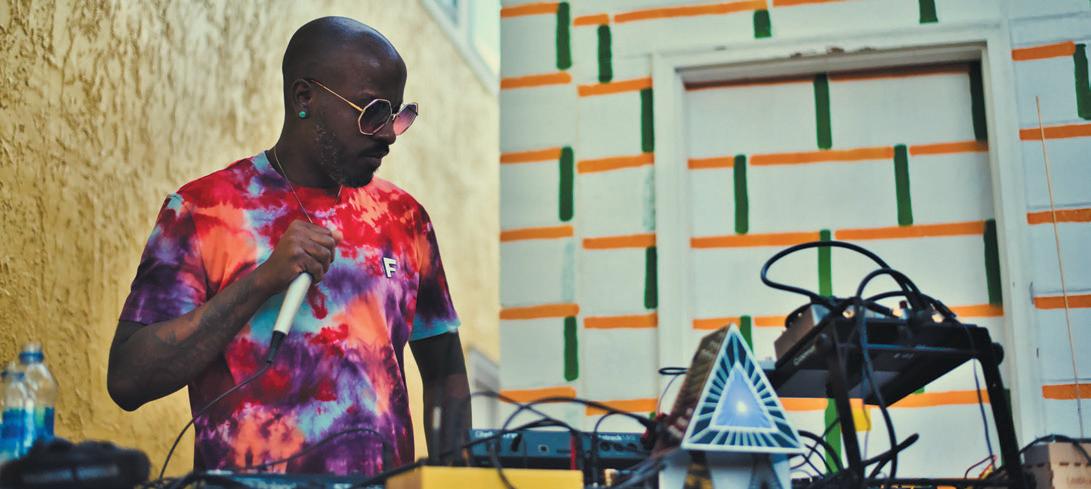
Iknew something was very wrong when the COVID symptoms started. As someone who has had chronic illness and had been sick quite a bit, this was next level. It was so bad I called 911. They said, “Shelter in place, or we can send an ambulance. That’s all our guidance.” So I sheltered in place.
It was horrifying. There were two or three
times that I can recall feeling so bad I thought, “This is the beginning of when I’m dying.” I was alone in my apartment, sweating through sheets—I couldn’t eat a bite of food for the first seven days. I lost 20 pounds. I was shaking. I was awake 22 hours a day with ridiculous fatigue. I couldn’t even move to writhe in pain. I couldn’t do anything but lay there. I didn’t even listen to music. There was just silence in my house. My friend Scott brought me some rice when I began to have an appetite again, and my manager dropped o a thermometer and Tylenol, but I don’t have any family in Chicago so I was very much alone.
It started on April 15. It was probably nine or ten days before I could get out of bed. The whole time when I thought I was going to die, I was thinking, “All of this music that I’ve been making for the last 30-plus years—no one’s going to know about it.” The first thing I did when I could think about anything other than how terrible I felt was to go to my synths and my computer. I started making my album Sirius Bismuth. That was probably the 22nd or 23rd of April, and the album came out May 1, Bandcamp Friday.
I just wanted to leave something. I had
long-haul COVID, and there were several times throughout my process of releasing an album every month where I thought that I wasn’t going to make it for the next one. I felt like shit for 13 or 14 months in a row. It was as bad as when my first COVID symptoms started, and I didn’t know if it was going to happen again. My mental state was on the edge of a knife. Releasing that much music is kind of ridiculous, but it kept me sane in some respects. As soon as I released an album, I’d take a couple days off, and then I’d start making the next one. I had my nose to the grindstone, which kept me from wallowing in fear about what was happening to my body. I was on medical leave for a long time. For the first several albums, I was sick all day and doing it when I could. In September 2020, I went back to work full-time, but my symptoms got worse and I wound up going on medical leave again in January 2021. In April I finally went back to work for real.
The experience hasn’t changed my approach to music as a whole—I’ve been in a codependent symbiotic relationship with music for most of my life. I’ve been trying to change, but for most of my life I’ve been a loner and kind
of a hermit. I just stay in my house and obsess about records and music, which was probably exacerbated by quarantine. Other than being really sick, I think I was able to handle the isolation better than people that are more social than I was or am.
But it definitely sharpened my skill set. I’m able to be a lot more e cient now because I was practicing my craft. If I practiced the guitar the amount I produced songs, I’d be a much better guitarist—this made me a much better producer, songwriter, and arranger.
After somebody wrote me a note about the liner notes for Sirius Bismuth , I started intentionally making music about something. I began to write music with intention, knowing that I’d need to have liner notes describing my process and support what it was about. It began to be an ouroboros e ect. I don’t assume that everyone will read them. It’s instrumental music, so it’s going to create its own meaning for the listener. My approach is like, “This is what I’m going through. This is what I’m thinking about.” However the listener interprets it is out of my hands.
It’s counterintuitive for someone who’s an artist to not particularly like attention. But for most of my musical career—if you want to call it that—my musical life has been 99 percent private. It’s only been in the last year where people are reaching out to me and wanting to hear more, or wanting to know what I think about things. It’s definitely a strange experience, but feedback has been amazing. When you sell stu on Bandcamp, you get an e-mail, and just seeing some of the e-mail addresses from Cape Town or London, I’m like, “Wow, Where are these people finding it?” It’s been humbling.
It doesn’t really do anything to assuage the imposter syndrome, but it feels great that people are reacting to the music. I’ve always thought that if my music helps a single person, then I can die knowing that I did something, even if I don’t ever “make it” in music. A number of people have literally said, “Your album helped me get through quarantine or COVID.”
People have been so incredibly kind and generous. I’m very happy to now be part of a scene; I’ve been in Chicago for 11 years, but I’ve been here alone. The friendships that are now in their infancy, who knows what those could turn into? That’s probably been my favorite thing about releasing all this music—being able to connect with people, new friendships, and community.
Mallory McClaire and Chantala Kommanivanh came out of lockdown with a brick-and-mortar space on 103rd Street.
As told to LEOR GALIL
Mallory McClaire and Chantala Kommanivanh work as an artist and educator and as an arts administrator, respectively—but the couple also run Web-based record shop Beverly Phono Mart. In August they plan to open a brick-and-mortar location at 1808 W. 103rd in Beverly. This interview was conducted July 26.
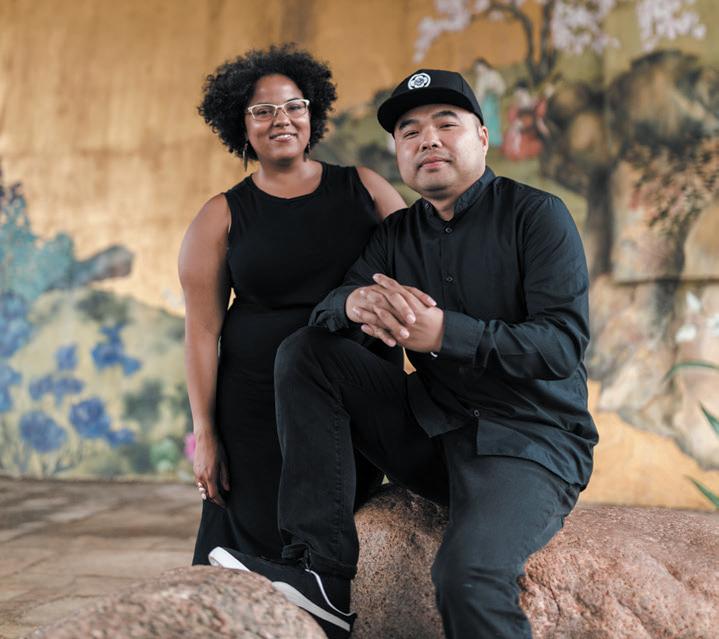
CHANTALA I’m the youngest of four brothers—my brothers were into hip-hop, and into music a lot, so having music in the house was an everyday thing. My older brother Sid dabbled in DJing. As a young kid, I was really mesmerized by the records—taking them out of the jackets, putting them on the record player, and rubbing them back and forth was intriguing. So for me, dabbling in DJing and
also collecting records since I was maybe 12 or 13 gave me the knowledge. Owning a record shop in my late 30s is sort of the icing on the cake.
MALLORY I grew up with a lot of music in the home. My parents, they took us to all the big city festivals growing up; I grew up on Jazz Fest and Blues Fest, and it’s just always been around. My dad in particular—he’s from Harlem—listens to a lot of soul, a lot of jazz, a lot of Afro-Latin jazz, and thankfully was really mindful to expose me and my sisters to that. I’ve always been going to live shows and exploring music my whole life. Like Chantala, it just feels like the shop is a pretty natural course.
CHANTALA I grew up in the northwest side, in Albany Park, and I lived there from 1983 till last year.
MALLORY I grew up in Beverly. We moved down here in fall 2019—we knew when we were buying a house we’d either end up close to Chantala’s family or close to mine. We ended up down here, right around the corner from my childhood home and a block away from where I went to elementary school.
We met on Tinder. I maintain that we probably crossed paths and didn’t know it—we would go to the same shows and hang out in the same places.
CHANTALA I have an art studio on the south side, and I’m from the north side, so if I didn’t swipe when I was in my studio, we wouldn’t have matched.
MALLORY It was a very long, long first date, and the second half of it was probably all just talking about what we listen to and what we like to do. We also like to travel and started doing that pretty early on; when we travel, we eat and we buy records.
We’d always had an interest in building a business of our own centered around community and our own personal interest in some way, and I think it took us a while to figure out what that angle was. Part of it was also just looking at what we wanted in our own community. Coming down to Beverly—when you’re a kid growing up here . . . I can’t speak for everyone, but for me it was like, you feel like it’s so far from all the action, and it’s so quiet. You get older and you want di erent things. I never imagined that I would actually be back here.
Now that we are here, it’s like, “Well, why do we have to go to the north side to have a really cool record shop?” There is a neighborhood shop, Beverly Records, they’ve been here for a long time. Beyond their presence here, you’d have to hit Hyde Park Records and then Pilsen. We felt like there was space for a store that could bring in elements of art and food and things that we love, and also just be a place for people with similar interests to gather.
CHANTALA Getting a loan, that’s the hard part. Putting our personal collection in the shop is a great help, and also a great start, and having e-commerce prior to the shop opening—it’s also helpful to get a jump start into the business.
MALLORY It’s really scrappy. I think our first
start was getting our LLC and our tax ID in February. We would do one little thing a week until we hit the point where we were like, “Well, all there is left to do now is find the spot, to sign the lease.” I’ve done work in operations before, so that part felt familiar to me, except for the fact that I was now doing it for myself.
CHANTALA We found a location on 1808 W. 103rd Street, and we got keys last week. We are in the midst of building out the shelves and the bins, and a little painting and things like that. We should be open come mid- to late August. I always tell my students—there’s 24 hours in a day. You just have to prioritize how much of those hours you want to use on your own interests.
MALLORY Yeah, work after work—and weekends. I think we’ll eventually find ways to balance that, cause we’ll also be the presence in the shop too. It’s great to have examples of people who have done it in our lives, and just see that it’s doable.
CHANTALA Miyagi Records has been a huge catapult for us, helping us get our recognition out there—they’ve always reached out, invited us to collaborate with them in these pop-ups that they’ve been doing.
MALLORY The Beverly Area Arts Alliance, they’re really good supporters of all types of creatives in the neighborhood—they’re all folks who actually run the Arts Alliance outside their own full-time jobs. We’re doing a pop-up with the Beverly Area Arts Alliance this upcoming weekend. And then there are folks like Shady Rest Vintage & Vinyl.
CHANTALA Who also have full-time jobs.
MALLORY We talk a lot about that community element; we want the shop to be approachable. We’re hoping to have performances and DJ sets and things like that in the space too, so just other elements of culture. We’ll have art up as well; we’re hoping to open with a group art show in the space. We hope that it’s like a starting point for people to explore all types of cultural interests, but with music as an anchor.
CHANTALA And also explore the south side, the far south side. The south side has been going up north for so long. Maybe it’s time for the north to come down. v @imLeor
Managing director Reba Cafarelli describes how the ensemble and its staff adapted to the suspension of live music.
As told to PHILIP MONTORO
Reba Cafarelli is managing director for Third Coast Percussion, working primarily in booking, marketing, and day-to-day operations. The ensemble is incorporated as a nonprofit, and it has a board of directors and three full-time employees in addition to its four members. In May 2022 Third Coast Percussion plans to release its next album, which will include Perspective, a seven-movement piece created in 2020 by footwork innovator Jlin.
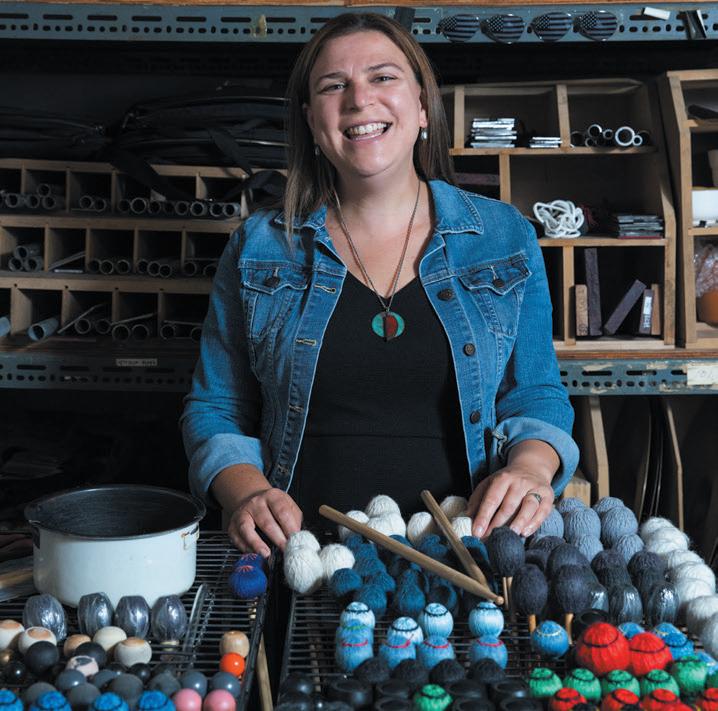
The primary role that I play with Third Coast Percussion is booking. So I represent Third Coast Percussion to potential presenters, partners at universities, performing arts centers.
Performance is one major activity. Another one is commissioning new music for percussion. The third would be education, from preschool to adults. Because we’re a nonprofit, there’s grants that we can apply for to help support commissioning. We release an average of one major commercial recording per year, mostly on Cedille Records.
With the pandemic, many things changed. I started my job in October 2019, so I was just getting into the groove of booking the ensemble. Of course, the rug got ripped out from under us very swiftly. We have a mission statement that we looked at, and we said, how can we stay on mission? Which is to bring exciting and unexpected musical performances to au-
diences, and to educate. So we all just realized that digital was gonna be the way to go.
We already had high-quality HD video equipment in our studio, because when the ensemble goes on tour, they tour with cameras, so that the audience can see projections of what they’re doing with their hands. We used that same strategy with digital. Our studio manager, Colin Campbell, took it upon himself to learn how to be a livestream producer overnight, basically. We upgraded our Internet in the studio, and one week after our last live performance, we had our first public livestream.
We wanted it to be as close to a concert experience as possible. Like, the “doors” opened a few minutes before the concert so people could start chatting. My colleague Rebecca McDaniel and I would monitor the chat and answer people’s questions, and then we would collect questions for the ensemble to answer at the end.
One of the coolest things is that percussion music is such a new thing that almost every composer and music creator we work with is alive, and we could get video messages from the composers to speak directly to the audience about their piece.
We really thought it through, like, we have to make this livestream world as engaging and interesting as possible. We knew at some point people would get tired of looking at their screens. But at the time, we were like, here’s an opportunity, let’s make the most of it. We solicited donations from our audiences, but we decided early on that we would not go behind any paywalls.
Two times we did have fundraisers online, where we did have a ticket. We used to have in-person fundraisers that would be about $100 a ticket, and a small group of people who could afford a $100 ticket would come. But now our ticket structure for the fundraiser is pay-what-you-can, starting at $5.
We beat our goal by going online and doing it that way. It made more than an in-person fundraiser! Another reason for that is the expenses—for in-person events, sometimes we have to rent the venue and rent a truck to move percussion instruments around.
We had booked our 2020-2021 season prior to everything shutting down, and we were able to convert several canceled engagements. And then new ones came about—one of the great things about the livestreams that we did was they were public, so people were able to see for themselves that they were high quality.
Again, no expense on our side other than
our own staff time. It wasn’t anywhere near the amount we would bring in for a typical touring season, but every dollar was able to stay with us. And we did a lot of education work compared to what we would normally do. There are some organizations that hire Third Coast Percussion specifically to do K-12 classroom visits. This way we don’t have to be already flying to California to work with students in California.
Everything that we do with our education program is very specifically built so that it’s 100 percent participation—the ensemble will do a clapping game with the kids, get them up out of their seats doing something, even when it’s remote.
One day early on in the pandemic, DCASE gave us a call, and they were working really hard to draw attention to the Arts for Illinois Relief Fund—it was clear that a free fall was happening. And they asked if Third Coast would do a live performance on the mayor’s Instagram story.
We had a couple of presenters who paid us to do a livestream, and it wasn’t necessarily appropriate for us to ask for donations since we were being compensated. So we asked for donations for New Music USA’s relief fund for people who are hurting in the contemporary classical music world.
Prior to the pandemic, everyone who worked with Third Coast Percussion on a new piece of music would visit the studio, come in and kind of do a sandbox session. It’s hard for anyone to wrap their brain around what Third Coast Percussion has in their arsenal of instruments—there’s just so many different ways to create sound on the wildest objects you can imagine. Using this great technology that we’ve built, composers can work with the ensemble remotely instead of coming all the way over to Chicago to get their hands dirty, so to speak.
We will definitely continue to embrace digital. The education programming that we do—we can prerecord something really high quality and then license it to schools and presenters. We’ve started releasing a new video every Thursday. To have a high-quality video to accompany all the new music that we’re developing, it reaches so many more people.
This ensemble, they built it really slowly and they built it right. Careful financial planning was important—the board of directors has been very hands-on in helping us build a reserve and making sure we have an emergency backup plan for any scenario. Without their support and guidance, it could’ve been a very di erent story. v
A free Chicago in Tune showcase in Millennium Park links the music’s history to its future.
By ROBERT MAROVICHChicago has earned bragging rights as the birthplace of Black gospel music. It was here that gospel was first composed, sung, played, published, promoted, recorded, broadcast, and formalized—the last via a national convention with regional chapters. Migrants to Chicago from the south in particular found comfort in it, because it articulated their shared experiences as strangers in a strange land and reminded them of their southern roots.
The seeds of gospel took root in Chicago with the planting of Pentecostal and Holiness churches on the south and west sides in the 1910s and 1920s. These “sanctified” churches amplified their spirited, communal music with the beat (and sometimes by the instrumentation) of the city’s blues and jazz scenes. The first commercial recording of this hybrid religious music was made in Chicago in 1926 by Pentecostal pianist Arizona Dranes. Her barrelhouse style and extroverted singing foretold the coming of gospel’s polyrhythms, improvisations, and call-and-response structure.
At that time, very early in the Great Migration, the Black community in Chicago was majority middle class, and the music in Black middle-class churches—mostly Baptist and African Methodist Episcopal—was decidedly different. Congregants used hymnbooks compiled by their white denominational counterparts. There was no improvisation, no barrelhouse piano, no handclaps or hallelujahs. Choirs sang formal hymns and anthems, the congregation listened and didn’t sing along, and unspoken norms discouraged spontaneous emotionality. Bewildered migrants accustomed to less formal worship stole away to the extroverted services at churches such as Elder Lucy Smith’s All Nations Pentecostal or Bishop William Roberts’s Church of God in Christ, both in Bronzeville.
This gap began to narrow in the late 1920s, when Thomas A. Dorsey, a blues and jazz pianist who’d come here from Georgia, began writing gospel songs that blended Baptist and Pentecostal elements. At first, he was shown the door—sometimes not so politely—by Protestant pastors who declared his music too worldly for sacred spaces. At the 1930 National Baptist Convention, held in Chicago, Dorsey was surprised by an upwelling of enthusiasm for one of his songs, which gave him a glimmer of hope. But it still took two more years—and
specifically the successful debut of a gospel chorus that Dorsey and Mississippi-born singing evangelist Theodore Frye had established at Ebenezer Baptist Church—for the new music to breach the imposing stone walls of local Protestant churches. Pastors surely realized that it would help build membership, increase donations, and ultimately help them burn the church mortgage faster.
Soon hundreds of gospel choruses were popping up all over the south and west sides and around the midwest, and to train them Dorsey, Frye, and Magnolia Lewis Butts (director of the W.D. Cook Gospel Chorus at Metropolitan Community Church in Bronzeville) formed the National Convention of Gospel Choirs and Choruses. The first convention, in 1933, was held at Pilgrim Baptist Church, where Dorsey served as music minister. Under the leadership of Georgia-born gospel singer Sallie Martin, the convention established a nationwide network of gospel choruses and local chapters. By the end of the 1940s, gospel choirs coast to coast were emulating their Chicago counterparts and singing Dorsey songs such as “Take My Hand, Precious Lord,” “Peace in the Valley,” and “Highway to Heaven.”
Chicago radio stations further expanded the gospel audience through live broadcasts of local Sunday church services. One of the first and most popular broadcasts emanated from Chicago’s First Church of Deliverance, beginning in 1935. The massive listenership of the Spiritual church’s midnight service prompted songwriters to pitch gospel songs to its choir in hopes of an overnight hit—the 1940s equivalent of YouTube virality. In the 1950s and 1960s, the constellation of Sunday service broadcasts in Chicago supported the practice of “broadcast hopping.” Groups of congregants traveled from one church to the next, visiting successive on-air services from morning till midnight, just to experience the spiritual electricity.
Many other gospel artists also did foundational work in Chicago. The ensemble that Arkansas- born singer and pianist Roberta Martin founded in 1933 would set the standard for piano-led gospel groups. Sallie Martin (no relation) and Kenneth Morris operated the Martin & Morris Music Studio, which for decades was the most successful Black-owned music publishing company in the world. Chicago- based quartet the Soul Stirrers
launched the careers of superstar vocalists Sam Cooke and Johnnie Taylor. Gospel’s royalty—Mahalia Jackson, James Cleveland, and Albertina Walker—called Chicago home.
Chicago television and record companies brought gospel music into living rooms and onto turntables. From 1963 to 1984, Sid Ordower’s Jubilee Showcase on WLS-TV soundtracked Sunday-morning church preparation rituals. Labels on Chicago’s Record Row—Vee-Jay, Halo, Chess and its Checker subsidiary, United and its States subsidiary— released the latest gospel hits. A gospelized version of “Hello Sunshine” by Chicago’s own Reverend Maceo Woods & the Christian Tabernacle Concert Choir hit the pop charts in 1969, rivaling Edwin Hawkins’s contemporaneous smash “Oh Happy Day” as the harbinger of contemporary gospel—a sound that introduced elements of rock, jazz, R&B, and folk into the traditional organ- and piano-led style.
On the evening of Friday, September 3, Millennium Park will showcase the city’s pioneering and contemporary contributions to gospel in a three-hour program emceed by Chicagoan Jonathan McReynolds, one of the genre’s current leading lights. Radio personalities Sonya Blakey and DeAndre Patterson from Inspiration 1390 will join him to present three musical segments.
Lashon Brown Jr. is a young south-side vocalist who, like McReynolds, plays acoustic guitar and delivers fresh songs of praise and worship in an intimate tenor voice. His thoughtful, melodic religious music resonates especially with younger churchgoers who, like the first generation of gospel fans, want a sound of their own.
The Tommies Reunion Choir will honor its roots as America’s first community gospel choir (unlike conventional church choirs, community choirs welcome singers from different churches and denominations). Formed in 1948 by the Reverend Milton Brunson, the Thompson Community Singers lent new songs and distinctive arrangements to generations of grateful church choirs. Members of the Reunion Choir include stalwarts Leanne Faine, Kim McFarland, and Kevin Brunson as well as songwriters Percy Bady and Darius Brooks.
A tribute to the Reverend Dr. Clay Evans, Pastor Maceo Woods, and Archbishop Lucius Hall will memorialize the golden years of church radio broadcasts. The south-side sanc-
Hosted by Jonathan McReynolds, Sonya Blakey, and DeAndre Patterson. Featuring Lashon Brown Jr.; a musical tribute to the Reverend Dr. Clay Evans, Pastor Maceo Woods, and Archbishop Lucius Hall with the Carson Sisters, Nicole Harris, and Illiana Torres; and the Tommies Reunion Choir. Fri 9/3, 5:30 PM, Pritzker Pavilion, Millennium Park, 201 E. Randolph, free, all ages
Gospel Industry Network Summit Featuring Adrian B. King, Gods Posse, New Direction, and others. Fri 8/20, 7 PM, Christ Unity Church, 208 E. 61st, free, all ages
Power Praise 2021 Featuring Bishop Hezekiah Walker, Donald Lawrence, Mark Hubbard, Krystal Sykes, and LeNasia Tyson. Sat 8/21, 7 PM, Cross Pointe Park, 2801 W. 167th, Hazel Crest, $40, $30 group rate for ten or more, $65 VIP, all ages ChicaGO REACH Gospel Workshop With Felicia Coleman-Evans, Dr. Lou Della Evans-Reid, Lonnie Norwood, and others. Via Zoom at lonnienorwood. com/chigoreachpopshops. Sat 8/21 and Sun 8/22, noon till 7 PM both days, $75 ($50 for students), all ages
A Deeply Rooted Evening for Chicago’s Healing: Goshen A preview of a Deeply Rooted Dance Theater performance based on Goshen by Donald Lawrence, featuring Le’Andria Johnson, members of the Tri-City Singers, and Zeke Locke & the NuXperience. Wed 8/25, 7:30 PM, Pritzker Pavilion, Millennium Park, 201 E. Randolph, free, all ages
Calvin Bridges Live recording with guests Dr. Walt Whitman, Dr. Yvonne Ruff, Ann Bridges, Pastor DeAndre Patterson, and others. Sat 9/7, 6 PM, Apostolic Faith Church Chapel, 3823 S. Indiana, free, all ages
Black Violin, Blind Boys of Alabama Sat 9/11, 7:30 PM, Pavilion, Ravinia Festival, 200 Ravinia Park Rd., Highland Park, $33-$80, all ages
tuaries of these three towering religious and civic leaders were veritable conservatories for emerging gospel artists. Musical guests will include the Carson Sisters, siblings of the late Billy Carson, who know their subject well (as did their brother—Billy made frequent appearances at Evans’s Fellowship Missionary Baptist Church and played drums on Woods’s “Hello Sunshine”). They’ll be joined by contemporary gospel singers Illiana Torres and Nicole Harris, who’ll put their own spin on the traditional music of Evans, Woods, and Hall. Gospel enthusiasts will remember Harris from her vocal contribution to the 2018 hit single “You’re Doing It All Again” by Maywood native Todd Dulaney. v
The Chicago in Tune jazz showcase in Millennium Park reaches from 1940s bebop to present-day avant-garde experiments and pop hybrids.
By BILL MEYERThere’s been jazz in Chicago for nearly as long as there’s been jazz. While jazz is commonly said to have ridden the rails to Chicago around 1916, when the Great Migration of African Americans from the south to the north kicked into gear, Dixieland bandleader Wilbur Sweatman had played gigs on the city’s south side as early as 1908, and Jelly Roll Morton first landed here in 1914.
So while it’s undeniably a shame that the citywide festivities called Chicago in Tune, originally scheduled for spring 2020, have been diminished and delayed, the resilience and longevity of Chicago jazz ensure that the music will swing right out of the pandemic.
Chicago has incubated a series of transformative developments in jazz. Louis Armstrong moved here in 1922 and devised a new approach that transformed the music into a virtuoso soloist’s art. Around the same time, the Austin High School Gang, a group of high schoolers smitten with the King Oliver Creole Jazz Band and the New Orleans Rhythm Kings, formalized an up-tempo variant of hot jazz into something known as the Chicago Style. After World War II, the city’s name was applied to a muscular, bebop-steeped mode of tenor saxophone playing identified with Gene Ammons, Johnny Griffin, Von Freeman, and Cli ord Jordan.
In the 1950s, keyboardist and arranger Sun Ra used Chicago as the launchpad for his Arkestra, a big band-cum-commune whose mind-blowing music incorporated swinging rhythms, atonal compositions, free improvisation, early electronics, and science fictioninspired themes. Its all-inclusive approach suggested a world freed from the racial and social strictures of mid-20th-century America.
Ra’s example of self-determination and insistence on artistic freedom wasn’t lost on the musicians who convened on the south side in 1965 to organize the Association for the Advancement of Creative Musicians. Formed in reaction to the diminished opportunities resulting from a generation of youth picking rock and soul over jazz, the AACM evolved into a cadre of mutually supportive artists who helped one another perform new work and
provided schooling to aspiring musicians on the south side. The group has been a beacon for generations of musicians who refuse to be confined by genre or business barriers. Many early participants, such as Roscoe Mitchell and Muhal Richard Abrams, left Chicago to pursue opportunities elsewhere, but other former and current members, including Fred Anderson and Ernest Dawkins, stayed and became invaluable mentors.
During the 1970s, Grant Park hosted summer festivals honoring Duke Ellington and John Coltrane. In 1979, the city combined those events with a new one proposed by the Jazz Institute of Chicago to create the first Chicago Jazz Festival. Held annually until COVID-19 put a lethal stick in the spokes, the fest has remained free to the public and committed to programming actual jazz, unlike so many similar festivals in other cities that have drifted so far that they’re jazz in name only. And even in the leanest times, clubs such as the Jazz Showcase and the Green Mill have continued to book jazz and nothing else, as they’ve done for decades.
Since the 1990s, a succession of musician organizers, including Ken Vandermark, Dave Rempis, Mike Reed, and Josh Berman, have forged alliances with the city’s rock and experimental- music communities, pooling creative and material resources. The venues where they operate are a big part of the ecosystem where jazz lives, breathes, and evolves; do yourself a favor and look into them as you tune in to Chicago in Tune.
Chicago in Tune also includes four Pritzker Pavilion concerts devoted to genres with deep roots in the city. The jazz concert, on September 4, features ensembles led by saxophonist Ari Brown, trumpeter Marquis Hill, and vocalist Lizz Wright (performing in that order).
Brown’s robust tone, self-assured command of bebop fundamentals, and patient lyricism place him squarely in Chicago’s rich tenor saxophone tradition. He’s just as proficient on the soprano saxophone, which he sometimes plays at the same time as his tenor to become a one-man horn section, and on the piano, which was his first professional instrument when he
played in soul and blues combos in the early 1960s.
Born in 1944, Brown is a lifelong resident of the city, and since the mid-70s he’s worked as an educator as well as a musician. He shifts between straight-ahead and avant-garde vernaculars with an easy fluency that comes from understanding their commonalities. Brown gigged mostly as a sideman for decades, playing with the likes of Elvin Jones, Kahil El’Zabar, and McCoy Tyner. He didn’t make his first album as a leader, the Delmark release Ultimate Frontier, until 1995. Since then, he’s recorded three more, each time leading the same sympathetic combo: his brother Kirk Brown on piano, Yosef Ben Israel on bass, and Avreeayl Ra on drums.
Like Brown, Hill was born and raised in Chicago. He went to school at Kenwood Academy and learned on the bandstand at jam sessions conducted by Fred Anderson, Ernest Dawkins, and Von Freeman. Hill moved to New York in 2014, the same year he won the Thelonious Monk Institute of Jazz prize for trumpet, but he’s continued to work with Chicago musicians—most notably bassist Junius Paul and drummer-bandleader Makaya McCraven. On Hill’s recent recordings for Concord Jazz, his fleet melodies weave through slinky rhythms derived from contemporary soul. Judging by a YouTube preview of his next album, New Gospel Revisited, due via Edition Records in 2022, next he’ll achieve that mix with an entirely acoustic band.
Singer Lizz Wright grew up in Georgia, the daughter of a minister and the church’s music director. Her albums for the Verve and Concord labels have included jazz, blues, and American folk songs, and she’s recorded with Joe Sample, Meshell Ndegeocello, and the band Calexico. But no matter where she gets her material, she gives it a spiritual vibe with the low swoop and broad vibrato in her voice. In her o stage guise as a chef, she’s developed the menu for Carver 47 Food & Wellness Market, part of the Little Black Pearl learning center on 47th Street.
Featuring ensembles led by Ari Brown, Marquis Hill, and Lizz Wright. Sat 9/4, 5:30 PM, Pritzker Pavilion, Millennium Park, 201 E. Randolph, free, all ages
Hypnotic Brass Ensemble Thu 8/19, 8 PM, Promontory, 5311 S. Lake Park Ave. West, $20-$32, all ages Extraordinary Popular Delusions Mondays (8/23, 8/30, 9/6, 9/13), 8 PM, Beat Kitchen, 2100 W. Belmont, free, 21+
Matthew Shipp Sat 8/28, 8:30 PM, Constellation, 3111 N. Western, $25, $20 in advance, 18+
Garden of Souls Geof Bradfield, Nick Mazzarella, Joshua Abrams, and Dana Hall perform the 1980 live recording Playing by Old and New Dreams.
Tue 8/31, 8 PM, Fulton Street Collective, 1821 W. Hubbard, $15 donation requested, all ages
Gary Bartz Quartet Thu 9/2-Sat 9/4, 8 and 10 PM; Sun 9/5, 4 and 8 PM, Jazz Showcase, 806 S. Plymouth Ct., $20-$40 (matinee free for 12 and under), all ages
Geof Bradfield, Russ Johnson, Matt Ulery, and Quin Kirchner Sun 9/5, 9 PM, Hungry Brain, 2319 W. Belmont, donation suggested, 21+
Mabel Kwan/Tim Daisy Duo, Trio Red Space
Thu 9/9, 8:30 PM, Elastic Arts, 3429 W. Diversey, $15, all ages
Corey Wilkes Thu 9/9-Sat 9/11, 8 and 10 PM; Sun 9/12, 4 and 8 PM, Jazz Showcase, 806 S. Plymouth Ct., $20-$40 (matinee free for 12 and under), all ages
Instigation Festival New Orleans musicians Jeff Albert, Mikel Patrick Avery, Doug Garrison, Aurora Nealand, James Singleton, and Paul Thibodeaux collaborate in mixed groups with Chicagoans. Thu 9/16-Sun 9/19, various times and venues (Elastic Arts, Hungry Brain, May Chapel, Constellation), prices and age restrictions vary. See instigationfestival.com.
Chicago in Tune showcases decades of house-music history in a three-hour concert.
By READER STAFFHouse-music culture developed in Chicago’s Black gay clubs in the 1970s, and it owes as much of its soul to the people who gathered to dance as it does to the DJs whose innovative mixes of disco, funk, R&B, and pop kept late-night partiers moving till long after sunrise. In the seven years or so between the emergence of key artists such as Frankie Knuckles, Michael Ezebukwu, and Ron Hardy and the arrival of what’s usually recognized as the first house record, Jesse Saunders’s 1984 cut “On and On,” thousands of house heads dedicated themselves to the culture. Since then, the vast influence of house has circled the globe several times over—techno, garage, deep house, juke, gabber, IDM, footwork, dubstep, and EDM have all sprung from the soulful seed of classic, four-on-the-floor house music, and it’s irrevocably transformed the landscape of pop.
House is as much a part of Chicago’s cultural DNA as gospel, blues, and jazz. The city’s Department of Cultural Affairs and Special Events debuted the Chicago House Music Festival in 2018, after dabbling in large-scale house parties over Memorial Day weekend, and though it’s the youngest of DCASE’s big annual fests, it’s already established itself as one of the best showcases for dance music in the city. In the Chicago House Music Festival’s first two years, it became a friendly counterpart to the Chosen Few Picnic (“the Woodstock of House Music”), with lineups demonstrating house’s reach across generations. The second festival—the last one before the pandemic—booked juke pioneer Gant-Man, footwork dance collective the Era, and house veteran Gene Hunt, who issued his first 12-inch in 1989.
The Chicago in Tune house-music showcase in Millennium Park this September is just a few hours long, but even within those constraints, DCASE has built a lineup that speaks to the genre’s history and its creators’ ability to continue shaping the culture decades later. Darlene Jackson, better known as DJ Lady D, emerged as part of Chicago house’s second
wave in the 1990s. She took up DJing in 1995, and in 1997 she teamed up with Colette, DJ Heather, and Dayhota to form Superjane, a collective that championed women in a scene that frequently marginalized them; they threw their first party at the defunct Funky Buddha Lounge.
In her recorded output, Lady D favors sharp, direct percussion that drives insistent grooves. On the 2015 single “All Night Long,” she lends her sparse vocals a velvety touch that teases out the thumping track’s tantalizing feel, which the late Paul Johnson further played up in his disco-fueled remix. Lady D’s influence in dance music extends beyond DJing and producing: after working in A&R for northwest suburban label Afterhours (where she brought on one of Chicago’s most successful dance producers of the past 20 years, Kaskade), she cofounded D’lectable Music in 2004.
This concert also doubles as the debut of Sanitize Your Soul, a collaboration between gospel veteran Mark Hubbard and longgrinding DJ Terry Hunter. Hubbard formed the United Voices of Christ choir in 1985, and seven years later he released his debut album with the Voices, Trust in Jesus . Their fifth album together, 2004’s Blessin’ Waitin’ on Me, won a Stellar Award for Traditional Choir of the Year in 2006, and in 2017 he was elected president of the Chicago chapter of the Recording Academy, the organization behind the Grammys.
Hunter’s history in music is just as long. He picked up DJing in the early 1980s and broke out later in the decade spinning parties for promoter Marvin Terry. In 1990, he released his first 12-inch, Madness , a collection of slyly funky tracks for respected Chicago label Muzique Records. Hunter’s skills are so highly regarded in the house community that in 2006 he became the first DJ in nearly 30 years invited to join the Chosen Few collective. As a producer, he’s also a favorite of stars across the pop spectrum who want to put a new spin on their work, and he’s made remixes for the
likes of Aretha Franklin and Jennifer Hudson. In 2018 his T’s Box label issued “Move of the Spirit,” a smooth gospel-house collaboration between Hunter and vocalists Jocelyn Brown and Inaya Day—a demonstration that he understands the spiritual and emotional energies that house and gospel have in common.
Closing out the evening is veteran producer Roy Davis Jr., who took his first steps in the world of house music as a teenager living in the south suburbs in the late 1980s. He befriended DJ Pierre of pioneering acid-house group Phuture and helped write “20 Below,” an R&B-inflected jam released under the name Pierre’s Phantasy Club on the sixth volume of the Jack Trax series. In the 1990s Davis replaced Pierre in Phuture for a spell, while simultaneously releasing his own records as part of a blossoming solo career. New York dance label Strictly Rhythm put out Davis’s debut 12-inch in 1992, Learn to Live (credited to the Roy Davis Project), and later recruited him to work in A&R. Davis has released plenty of music in the decades since, but he remains best known for a gospel-inflected 1996 collaboration with Peven Everett called “Gabriel” (a remix of his tune “Gabrielle”), which buoys its gently rippling groove with light hand drums and sparse, sultry horns. The following year XL Recordings reissued the 12-inch in Britain, where it became a chart hit and a touchstone for the budding UK garage movement. Chicago in Tune’s house programming extends beyond this Pritzker Pavilion concert. In July DCASE launched “House City,” a series of ten dance-music events in neighborhoods around the city’s south, west, and north sides. Four of the events fall within the span of Chicago in Tune, and the series closes in Bronzeville on September 19 with an afternoon show featuring DJs Mike Dunn of the Chosen Few, Daryll Mellowman, and JStar. Two of the ten events have been postponed as of publication time, and the exact location of the Bronzeville show has yet to be announced—so it’s best to check the DCASE House City page for updates. v
CHICAGO IN TUNE: HOUSE
Roy Davis Jr. headlines; DJ Lady D opens, and the Sanitize Your Soul gospel house choir with Mark Hubbard and DJ Terry Hunter performs second. Sat 9/11, 5:30 PM, Pritzker Pavilion, Millennium Park, 201 E. Randolph, free, all ages
Louie Vega Fri 8/20, 10 PM, Smart Bar, 3730 N. Clark, $25, $20 in advance. 21+
Freestyle Forever: Mixtape Edition 3 Featuring Stevie B, DJ Funk, Samantha, D’zyre, Mark Milan, Lucy Love, Amazin’ Records, Pain. Sat 8/28, 9 PM, Concord Music Hall, 2047 N. Milwaukee, $20-$60. 21+
Research & Development: Sassmouth, Miss Twink USA, Grey People, Patrixia, JS Alvarez, Makeen Sun 8/29, 6 PM, Sleeping Village, 3734 W. Belmont, free. 21+
Blacklizt, Eli & Fur Sat 9/4, 10 PM, Radius, 640 W. Cermak, $50. 18+
RP Boo, DJ Taye, Jana Rush, DJ Manny Fri 9/10, 10 PM, Smart Bar, 3730 N. Clark, $20, $15 in advance. 21+
The pandemic couldn’t sever the music’s deep roots, and Chicago in Tune’s Millennium Park concert showcases its thriving variety.
By JAMES PORTERBlues music thrives on live interaction between performer and audience, but for nearly a year and a half, that’s been in short supply. Clubs are caught between “waiting to reopen” and “slowly coming back,” and Millennium Park has been largely quiet— for two Junes running, the city has canceled the Chicago Blues Festival. Our blues artists haven’t shown any serious signs of decline, though, even in these grim circumstances, and we’ll get a sampling of what they have to o er when the city’s Chicago in Tune festival presents a free Pritzker Pavilion concert on September 18 to mark the 50th anniversary of Alligator Records.
Many important Chicago blues labels predate Alligator, founded in 1971 by Bruce Iglauer, but few can match its long track record of releasing what it calls “Genuine Houserockin’ Music.” In its first decade alone, it released music by the likes of Hound Dog Taylor, Son Seals, Koko Taylor, Albert Collins, and Lonnie Brooks. Alligator continues to prove to the world that Chicago blues is no museum piece— it’s as alive as any ten rock bands put together.
The city’s distinctive blues tradition extends at least as far back as the 1930s, with important pioneers such as Big Bill Broonzy, Washboard Sam, and Tampa Red. An uncountable number of blues musicians came to Chicago from the south during the Great Migration, which began in the 1910s: they included Muddy Waters, Howlin’ Wolf, Jimmy Reed, Little Walter, Koko Taylor, J.B. Hutto, and Willie Dixon, and later Otis Rush, Buddy Guy, Magic Sam, Junior Wells, and James Cotton.
The addition of drums and amplification helped create what we now know as Chicago blues—one of the most significant developments in the genre’s history. It’s a big sound, and from its origins it made plenty of room for variety. Jazz-influenced pianists such as Eddie Boyd and Willie Mabon helped shape the scene as well, and they’d been preceded by the likes of Little Brother Montgomery, who first moved to the city in 1928 and settled here for good in 1941. The success of soul music in the early 60s added a new flavor to the Chicago sound (and a new way for gospel to influence the blues) via the stylings of vocalists such as
Ricky Allen and Little Milton.
The 1950s can be considered the golden age of Chicago blues, but that doesn’t mean the music hasn’t kept thriving. The six artists showcased at September’s Pritzker Pavilion concert continue to extend and expand blues traditions. And they all have releases on Alligator Records, except for Wayne Baker Brooks—and he’s the son of Alligator artist Lonnie Brooks.
Lil’ Ed & the Blues Imperials have been with Alligator the longest (their first album for the label came out in 1986), and they’ve had the same lineup for most of that time. Guitarist and front man Ed Williams is the nephew of slide-guitar wizard J.B. Hutto, who taught him the basics in the late 60s, and his high-energy playing reflects his uncle’s sound as well as his own identity. The Imperials were recording a track for the 1987 Alligator compilation The New Bluebloods, and Iglauer was so impressed he o ered them a contract on the spot. By now Williams, guitarist Mike Garrett, drummer Kelly Littleton, and bassist James “Pookie” Young are one of the longest-running traditional blues acts in the city, alongside Lurrie Bell, John Primer, Jimmy Johnson, and Jimmy Burns.
Nick Moss worked his way up as a bassist with Jimmy Dawkins before joining Willie “Big Eyes” Smith’s band, where he switched to guitar. He began leading his own group in 1997 and released a long string of albums on his own Blue Bella label before debuting on Alligator in 2018. For the past four years or so, he’s been working with harmonica player Dennis Gruenling, who has one of the driest, most full-bodied tones I’ve ever heard. Moss’s own sound spices up traditional Chicago blues with a streak of urbane Los Angeles jump blues.
The Cash Box Kings also have a small-combo jump-blues feel, albeit a little rowdier and with a touch of Memphis rockabilly. Founded in 2001 in Madison, Wisconsin, by singer and harmonica player Joe Nosek, the Kings added south-side Chicago vocalist Oscar Wilson as coleader in 2007. Much like labelmates Rick Estrin & the Nightcats, they use plenty of humor—on the 2019 Alligator album Hail to the Kings! , you can hear it loud and clear on
Shemekia Copeland (who makes a guest appearance on Hail to the Kings! ) became a contender for Queen of the Blues at age 19, when her 1998 debut, Turn the Heat Up , hit the streets. And at the 2011 Chicago Blues Festival, the city and state formally granted the New York-born singer that title—and none other than Cookie Taylor (daughter of the late Queen of the Blues, Koko Taylor) bestowed the crown onstage. Over the course of nine albums, Copeland has incorporated soul, classic rock, and Americana into her blues, along with a generous dose of social commentary.
Harmonica master Billy Branch first started making the rounds in the 70s, and by the end of that decade he’d founded the long-running band Sons of Blues as well as the Blues in the Schools program, which teaches this uniquely American art form to schoolkids across the country. Building a decades-long legacy in a scene where artists come and go seemingly overnight is an accomplishment in itself, and Branch has also shared his gifts with collaborators in and out of the blues—they include Lou Rawls, Mexican rock band El Tri, and jazz guitarist George Freeman.
Chicago loves its blues rock, judging from the audiences that line up to see the likes of Toronzo Cannon, Melvin Taylor, and Joanna Connor. Wayne Baker Brooks falls solidly in that bag. Playing with his father, Lonnie Brooks, gave him invaluable experience—he joined Lonnie’s band in 1990, the year he turned 20—and over the past couple decades he’s made his own mark.
As wide-ranging as this lineup is, it only hints at the diversity of Chicago blues. And whatever form the music takes—the jazzy strides of guitarist Dave Specter, the soulful strokes of singer Gerald McClendon, the gospel inflections of guitarist Mississippi Gabe Carter—not even a pandemic can shut it down. Across the decades, through all its comings and goings, hosted by countless record labels, club stages, outdoor festivals, street corners, and subways, the blues has become part of the city’s DNA. It’s just too indigenous to die. v
@JamesPorterCHI
Celebrating the 50th anniversary of Alligator Records. The Cash Box Kings headline, with guest Shemekia Copeland; Lil’ Ed & the Blues Imperials play second, with guest Billy Branch; the Nick Moss Band and Dennis Gruenling open, with guest Wayne Baker Brooks. Sat 9/18, 5:30 PM, Pritzker Pavilion, Millennium Park, 201 E. Randolph, free, all ages
Bronzeville Blues: The Forum With Joe Filisko & Eric Noden, Greasy Gravy (Matt Hendricks and Rick Sherry), and Harmonica Hinds. Sun 8/29, noon-6:30 PM, near the Forum, 318-324 E. 43rd, free, all ages
Bronzeville Blues: Checkerboard Lounge With the Mojo Jam Session (featuring Kenny “Beedy Eyes” Smith), John Primer & the Real Deal Blues Band, Melody Angel, Big James & the Chicago Playboys, and Nick Alexander. Sun 8/29, noon6:30 PM, near the original location of the Checkerboard Lounge, 423 E. 43rd, free, all ages
Bronzeville Blues: Park 43 With Bob Stroger, Mississippi Gabe Carter, and Gerry Hundt’s Legendary One-Man Band. Sun 8/29, noon-6:30 PM, Park 43, 540 E. 43rd, free, all ages
Record Row Series At the former Chess Records building that now houses Willie Dixon’s Blues Heaven Foundation. Sundays (8/29: Joe Pratt & the Source One Band, 9/5: Sheryl Youngblood, 9/12: Vino Louden, 9/19: John Primer duo), 6 PM, 2120 S. Michigan, free, all ages
Chicago Blues Club City Tour Twenty shows at ten clubs, including appearances by Jimmy Johnson, Joanna Connor, Erwin Helfer, Billy Branch, Mud Morganfield, the Kinsey Report, Tail Dragger, and Jamiah Rogers. Wed 9/1 through Mon 9/6, various times and venues (B.L.U.E.S. on Halsted, GMan Tavern, Golden Dagger, the Hideout, Martyrs’, the Promontory, the Quarry, Reggies, Rosa’s Lounge, Taylor Street Tap), all shows free, 21+ Austin: West Side Blues Featuring Lurrie Bell, Vance Kelly, Mzz Reese, Jimmy Burns, Mary Lane, and Larry Taylor. Sun 9/12, noon-8 PM, Chicago Avenue and Mayfield, free, all ages
Chicago in Tune is a diffi cult festival to describe, since it includes basically all live music happening in the city from August 19 till September 19. How that looks to you depends heavily on which shows are on your radar. The Reader has provided you with a number of assists: a show calendar spanning the entire month; lists of gospel, jazz, house, and blues concerts; and these roundups by genre, compiled by Reader staff and freelancers with special expertise in each area. We’ve definitely le some genres out, in the interest of avoiding hairsplitting, and the festival roundup is of course not about a genre at all. Plenty of events could’ve ended up filed in several categories, so we just had to pick one: the Lyrical Lemonade Summer Smash is under hip-hop, not festivals, and Ruido Fest leads off the Latinx roundup. The best way to be sure you’re hearing about everything that might interest you is to read all of these, I reckon. But of course I was going to say that anyway. —PHILIP
MONTOROChicago musicians keep the city in tune year round, and they’ve even done it through a pandemic—so the month of programming that DCASE has designated Chicago in Tune was bound to feature stellar talents. It includes loads of can’t-miss pop, rock, and punk shows where you might just discover your new favorite artists.
On the opening night of Chicago in Tune (Thu 8/19), lo-fi rockers Sonny Falls and Cold Beaches hit the stage at coffeehouse and music venue Golden Dagger, formerly known as Tonic Room. The venue also hosts alternative trio Microcosms and pop-rock vocalist Serjeeoh (Tue 9/7),
the fearless Sophie Sputnik’s moody garage group, Waltzer (Wed 9/15), and quirky indie heads Spirits Having Fun (Fri 9/17).
For the second night of the festival, the Hideout presents the punched-up indie pop of Bloom and Troigo (Fri 8/20) on its patio stage. The beloved small venue has great outdoor shows booked throughout, of course, including poet and songwriter Kara Jackson (Tue 8/24), Niika & Reno Cruz (Fri 8/27), grungy funk punks Orisun (Tue 8/31), and pop singer Katy Kirby with the hypnotic alt-country stylings of Tenci (Sat 9/11).
Ohmme, the experimental duo of Macie Stewart and Sima Cunningham, will perform material from their stunning 2020 album, Fantasize Your Ghost (in addition to some older fan favorites), at a CHIRP Radio-sponsored Thalia Hall show with goth punks Ganser opening (Thu 8/26).

In a near re-creation of the extravagant showcase dubbed Iconic that they presented at Schubas in 2019, the powerhouse pop lineup of Emily Blue, Thair, SuperKnova, and Carlile reunite at Lincoln Hall (Sat 8/28)—with any luck, Blue and Thair will surprise fans with a live rendition of their take on Lady Gaga and Ariana Grande’s “Rain on Me.”
That same night, surfy pop-rock oddballs Impulsive Hearts headline a show at Reggies Music Joint with Minneapolis alt-rockers Present Company, emo six-piece Cloud Houses, and the shimmery songs of Pete Cautious (Sat 8/28).
Closing out August, folk band Honey Cellar bring their delightfully buzzing harmonies to Montrose Saloon (Tue 8/31).
Singer-songwriter Jess Viscius and her new outfit, Bnny, play a record-release show at the Empty Bottle to celebrate their debut LP, Everything , which comes out August 20 on Fire Talk Records (Thu 9/2). And the latest signee to Sooper Records, multi-instrumentalist Jodi, brings the conventiondefying music and queer country tales of their intimate new album, Blue Heron , to Sleeping Village (Sat 9/4).
Also at Sleeping Village, Indigo Hope Finamore
and Manae Hammond, who make music as Oux, will deliver a set of their soulful, synth-dipped, electro R&B (Wed 9/15)—when their songs “Rise,” “Queer Like Me,” and “Mood” wash over you, vibe like no one’s watching.
Given the depth of Chicago’s pool of musical talent, you should never sleep on opening acts here— you never know who might blow you away. Avantist, the grossly underrated rock band of brothers Erick, David, Luis, and Fernando Arias, and dream-pop five-piece Faux Furrs will both get the crowd moving ahead of Cincinnati rockers Sylmar (Subterranean, Sun 9/5). Full of noise, rage, and bass, No Men will get all up in your face supporting no-wave legend Lydia Lunch and her band Retrovirus (Beat Kitchen, Fri 9/10), who are sure to do the same. You’ll probably need earplugs for this one, and be sure to help your fellow showgoer if the mosh pit gets too chaotic—safety fi rst!
—JESSI ROTI
So far this summer, three albums by Chicago rappers have hit the top five of the Billboard 200. G Herbo’s 25 landed at number five on July 17, a few weeks a er Polo G’s Hall of Fame took the top spot on June 26, displacing The Voice of the Heroes, a collaboration between Atlanta’s Lil Baby and Chicago’s Lil Durk. But as entertaining as chart watching can be, it can’t tell you much about what’s made the local scene so vital and unique over the past decade. Keeping an eye on the city’s concert listings will get you a lot closer.
The Lyrical Lemonade Summer Smash returns to Douglass Park this year (Fri 8/20-Sun 8/22). A big part of the festival’s draw comes from its marquee names—ASAP Rocky, Lil Baby, Lil Uzi Vert— but much of the rest comes from Chicago acts. Among the highlights are up-and-comer OG Stevo, the master ful Saba, nonchalant fl exer Queen Key,
spitfire story teller Femdot, the dryly cool Nina Tech, and Hurt Everybody MCs Qari and Supa Bwe performing solo sets. The Summer Smash lineup also showcases artists who’ve worked with Lyrical Lemonade founder-turned-videographer Cole Bennett, among them Lil Skies, Ski Mask the Slump God, and Lil Tecca. The fest also nods at hip-hop’s breadth, finding a through line that connects Atlanta screamer Waka Flocka Flame, Los Angeles philosopher Earl Sweatshirt, and Buffalo underground veteran Benny the Butcher.
Watching what’s happening in Chicago’s clubs will also teach you how far hip-hop’s cultural imprint extends beyond what’s traditionally considered hip-hop. Chicago footwork producer DJ Taye, who began adding verses to his hyperactive, zigzagging dance music on 2018’s Still Trippin, will perform at Smart Bar alongside footwork pros DJ Manny, Jana Rush, and RP Boo (Fri 9/10). Chicago producer and singer Elton Aura creates supple, graceful songs from a soothing blend of R&B, funk, hip-hop, and pop; he plays a patio show at the Hideout with DJ Chris Banks (Sat 8/28). And Sterling Hayes, a hard-grinding member of Chicago hip-hop collective Save Money, celebrates his new album, Beam Scale, at Chop Shop (Fri 8/27).
Touring hasn’t resumed at anything like preCOVID levels, but quite a few out-of-town hip-hop acts will come through in the next month, including New Jersey hip-hop fusion crew Cook Thugless (Beat Kitchen, Fri 8/20) and New York producer Blockhead, who’s playing a release show for Space Werewolves Will Be the End of Us All (Schubas, Fri 9/3). Subterranean hosts two great hip-hop acts back-to-back: underground champion Homeboy Sandman (Wed 9/8) and rising artist CalenRaps (Thu 9/9). Los Angeles MC Duckwrth brings his smooth, lighter-than-air tunes to Reggies Rock Club (Tue 9/14), and dyed-in-the-wool underground rapper Conway the Machine—a member of prolifi c Buffalo crew Griselda, alongside Benny the Butcher—headlines Avondale Music Hall (Fri 9/17). Hip-hop moves quickly, and even the biggest
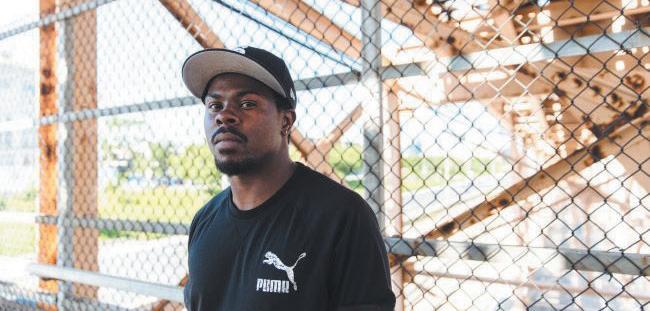
stars sometimes drop albums just days a er revealing their existence, or announce shows just a couple weeks in advance. So it’s always a good idea to keep checking concert calendars.
Pandemic shutdowns seemed destined to sideline metal and hardcore bands for longer than their peers in other genres. A er all, where would you feel more likely to contract a respiratory virus: at a coffeehouse show by an acoustic singersongwriter, at a seated concert by a chamber quintet, or in a circle pit watching a band of thunderously loud hell-raisers screaming their faces off? As in-person shows have come back, though, metal has been well represented, and the local circuit is stacked throughout Chicago in Tune.
There are a few stadium shows and festivals, of course: Megadeth and Lamb of God at Hollywood Casino Amphitheater (Thu 9/9), Guns N’ Roses at Wrigley Field (Thu 9/16), Faith No More and Coheed and Cambria at Riot Fest (Douglass Park, Fri 9/17-Sun 9/19). But if you like it heavy, the club shows are every bit as exciting.
Florida death-metal pioneers Deicide play Reggies Rock Club with Canadian death-metal legends Kataklysm and reunited slam unit Internal Bleeding (Sun 8/22), and Nashville scuzz rockers Thelma & the Sleaze play Liar’s Club with Chicago-based intergalactic occult weirdos Beastii (Tue 8/24). The end of the week provides a hesher’s bounty of doom and stoner-rock bands: Freedom Hawk, High Reeper, Black Road, and Uncouth at Reggies Music Joint (Thu 8/26) and midwestern stoner-metal veterans Bongzilla at Beat Kitchen (Fri 8/27). If power metal and laser light shows are your thing, you can rev up for the week ahead with Immortal Guardian and Paladin at WC Social Club (Sun 8/29).
The onslaught continues over Labor Day weekend. Noisy hardcore group Knocked Loose head-
line two stacked bills at Metro (Thu 9/2-Fri 9/3), with Gatecreeper opening the latter. Chicago/ Gothenburg mini fest Scorched Tundra returns to the Empty Bottle with a single-night showcase (Sat 9/4) featuring western-infused doom outfit In the Company of Serpents, Minneapolis D-beat/ crust punks Hive, and local death metallers Roman Ring. Iowa doom merchants Telekinetic Yeti and local Lovecra ian instrumental duo Plague of Carcosa share a four-band bill at Bourbon on Division (Fri 9/3).
The following week, Reggies Music Joint hosts a lineup of boundary-breaking local artists, headlined by doomy slowcore band Starless, who are celebrating the release of the album Hope Is Leaving You ; opening are dark experimental group Anatomy of Habit, heavy rockers Lavisher, and musician and audio engineer Sanford Parker (9/11). On the same night, Cobra Lounge gets brutal with Dallas death metallers Devourment and Cleveland hardcore titans Ringworm.
The past year and a half has proved that Chicago’s metal scene can’t be stopped by a submicroscopic infectious agent. (To quote 3rd Rock From the Sun on viruses: “They are stealthy, but they are stupid.”) With vaccinations on the rise and clubs instituting stricter COVID-19 safety policies, we can afford to hope the city will never know a time without live metal again. READER STAFF
Ruido Fest falls on the first weekend of Chicago in Tune, featuring smooth Mexico City dance-pop band Little Jesus, local retro-pop trio the Mini Projects, Miami-based Venezuelan singer Maye, and many more. Old-school Latin-alternative icons Café Tacvba, Panteón Rococó, and Caifanes headline, along with Puerto Rican reggaeton star Ivy Queen. Don’t miss producer Camilo Lara and his group Mexican Institute of Sound, Afro-Colombian
synth-pop artist Lido Pimienta, and tropical discofunk band Los Amigos Invisibles (Union Park, Fri 8/20-Sun 8/22).

The Ruido a erparties are equally great: highlights at Cobra Lounge include Las Nubes, who conquered Iggy Pop’s heart in Miami (Sun 8/22), and the radical reggaeton of La Doña paired with the chill jams of Inner Wave (Fri 8/20). Silverio will pounce on synths to create dark electronic music at Reggies Rock Club (Sat 8/21), while Alex Midi of Mœnia will spin at Simone’s (Sat 8/21).
Two free shows at FitzGerald’s present relatively traditional Latinx music: Chicha Roots honor the golden age of Andean cumbia (Thu 8/19), and Jarochicanos and Joel Castellanos present a night of son jarocho (Thu 8/26). Jarochicanos also teach the zapateado that accompanies son jarocho at a fandanguito in Hermosa Park (Thu 8/19). The following week, Ida y Vuelta explore folk sounds from Veracruz at Sleeping Village (Fri 8/25).
In Pilsen, Tierra Roja and Los Sudakas perform Andean folk, boleros, son cubano, and son jarocho at Wings Fire House on Western at 25th, a secondfloor restaurant that hosts live music (Fri 9/3).
Other upcoming lineups at Wings Fire House include Latinx funk, ska, and soul with OvejaNegra, MuTaTe, Mr. Funko, and DJ Gildelgar (Fri 8/27); Latinx rock with Las Cruxes, Kelroy, and Rai (Fri 9/10); and an homage to Mexican pop group RBD called Tributo Celestial that’s sure to please lovers of cheesy 90s Latinx pop (Sat 9/11).
The city’s ¡Súbelo! showcase (Harrison Park, Sat 9/4) will feature Mexican rap-rock band Molotov and other Latinx performers. SummerDance in the Parks includes cumbia by Quinto Imperio (Davis Square Park, Wed 9/8) and salsa by Chicago Latin Groove (Portage Park, Wed 9/15).
Kombi hosts Kumbiaholics at Simone’s (Sat 8/28), but if you’re looking for a different flavor, DJ Flores Negras (vocalist for doom-metal band Rosaries) and DJ MaddJazz host a goth cumbia night at Subterranean (Fri 8/27).

Celebrating 50 years of promoting and preserv-
ing Afro-Puerto Rican culture, Segundo Ruiz Belvis Cultural Center presents an all-bomba gathering (Thu 9/9) with Cerqua Rivera Dance Theatre, Barcelona- based group Mancha ’E Plátano, and Bomba con Buya (the two bands also play Wed 9/8 at the Old Town School). The festivities continue with Bámbula: Afro-Diáspora en Chicago, a series of outdoor bomba dance parties (Kelvyn Park, Fri 9/10; Julia de Burgos Park, Sat 9/11; Senka Park, Sun 9/12). —SANDRA
TREVIÑOChicago in Tune overlaps the Grant Park Music Festival on one end and the Ear Taxi Festival on the other. Grant Park closes its season just as Chicago in Tune begins, with a program that includes Handel’s choral-orchestral whammy Dettingen Te Deum (Pritzker Pavilion, Fri 8/20-Sat 8/21). Pritzker Pavilion also hosts a Grammy Legacies concert (Thu 9/16) featuring Eighth Blackbird, tenor Karim Sulayman, performance poet J. Ivy, singersongwriter and actress Tarrey Torae, and a world premiere by Pamela Z.
That same day, Ear Taxi kicks off its Spotlight series with the debut of Rhythm Is Image, focusing on works that treat sound as a tactile phenomenon (Constellation, Thu 9/16). Later that weekend Chicago-based Kosmologia, the brainchild of composer Carmen-Helena Téllez, brings Téllez’s own piano works into dialogue with Bach’s (PianoForte, Sat 9/18-Sun 9/19).
Fi h House Ensemble mounts an outdoor concert in collaboration with the American Indian Center’s Big Drum Ensemble, featuring commissions by Shawn Okpebholo and Patrick O’Malley; the watercycle-themed program also includes “In Wisconsin Woods” by composer and Lenape Center codirector Brent Michael Davids (Brushwood Center at Ryerson Woods, Sun 9/19). The same a ernoon, vocal quartet Fourth Coast Ensemble premieres
A Brush With Our Time, based on the poetry of Zen artist Kazuaki Tanahashi; Tanahashi will paint largescale enso calligraphy around the space (Ruggles Hall at Newberry Library, Sun 9/19).
Access Contemporary Music’s season starter includes guests Nadia Sirota (the violist and podcaster of Meet the Composer fame) and Liam Byrne (bass viol) playing Donnacha Dennehy’s Tessellatum (Davis Theater, Thu 9/9). The Frequency Series at Constellation remains reliably intrepid: percussionist Patti Cudd delivers a live rendition of her decadent still motion, released by new local label Sideband Records (Sun 8/22), and pianist ShiAn Costello transforms famous collectively improvised pieces (Terry Riley’s In C , Julius Eastman’s Stay on It , and Louis Andriessen’s Workers Union ) into solo arrangements (Sun 9/19).
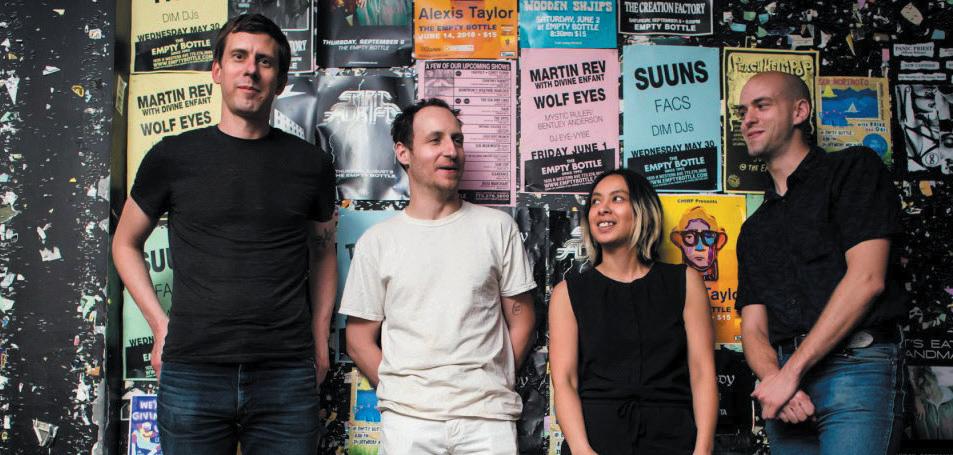
If you have to be choosy this summer, though, choose opera. Elastic Arts’ AfriClassical series passes the baton to Ayanna Woods, whose ensemble performs music from FORCE! , Anna Martine Whitehead’s collaborative “punk opera” about women and femmes of color sharing a prison waiting room (Sat 8/28). And Third Eye Theatre Ensemble phoenixes itself from pandemic ash with a bewitching double bill: the midwest premiere of Kamala Sankaram’s The Infinite Energy of Ada Lovelace and a commission by Elizabeth Rudolph called Petticoats & Sliderules (Edge Theater, Fri 9/17Sun 10/3). —HANNAH EDGAR
“Experimental” is more a how than a what, and most of the shows here could’ve fit in at least one other category. The Pitchfork Music Festival (Union Park, Fri 9/10-Sun 9/12), one of the best such events in Chicago, features a slew of great experimentalists on Friday’s lineup—including sound-collaged dance-music project the So Pink Truth, frenetic postpunk mavericks Black Midi, art-
pop troubadours the Fiery Furnaces, and beloved psychedelic act Animal Collective. Former Sonic Youth bassist Kim Gordon plays on Saturday (with a solo date Fri 9/10 at Thalia Hall), and prismatic glam-rock star Yves Tumor plays on Sunday (with an a ershow that night at the Empty Bottle). Thurston Moore, also a former member of Sonic Youth, has two shows at the Bottle later that week (Tue 9/14-Wed 9/15).
At Millennium Park’s Pritzker Pavilion, Experimental Sound Studio presents a series of widely varied 30-channel sound installations that take full advantage of the gridlike trellis of overhead speakers spanning the lawn. The installations will be active roughly one day per week throughout Chicago in Tune, for two hours each day; the six 20- minute works are by Whitney Johnson (aka Matchess), I Gusti Ngurah Kertayuda & Bill Parod, Stephan Moore, Kitundu, Kioto Aoki, and Natalie Chami (aka TALsounds). ESS also hosts a concert series at Lake Forest College that celebrates ephemeral but powerful experiences. Artists include avant-garde vocalist Carol Genetti (Sat 9/11) and taiko drummer Kioto Aoki (Sat 9/18).
Elastic Arts reliably books experimental music in many genres, and the month of Chicago in Tune is no exception. JG Thirlwell of Foetus will deliver an electroacoustic audiovisual performance called “Silver Mantis” (Sat 9/11), and the underrated Ohio trio of Jayson Gerycz, Jen Powers, and Matthew Rolin will improvise a set of folk-jazz (Fri 9/3).
The Empty Bottle will present Nebraska’s favorite queer electro-industrial leather maniac, Plack Blague, sharing the bill with local no-wave punk-metal duo Ozzuario and a DJ set from Him Hun (Fri 9/3). A few days later (Mon 9/6) it hosts a night of performances from three Chicago natives: young guitarist extraordinaire Eli Winter, synthesist Jordan Reyes, and Rebecca Valeriano-Flores, guitarist and vocalist for postpunk band Negative Scanner.
The Museum of Contemporary Art presents its Tuesdays on the Terrace jazz series at 5:30 PM,
when its exhibits are still open. The fi rst show to fall within Chicago in Tune features reedist Mwata Bowden (Tue 8/24), a second-generation member of the Association for the Advancement of Creative Musicians (AACM), a Chicago institution founded in 1965 to support the autonomy of experimental Black artists. The following week’s concert (Tue 8/31) is by the Alexander McLean Project, a group led by vocalist Dee Alexander and guitarist John McLean. —JOSHUA MINSOO
KIMLast summer’s festival season was canceled before it began, but as vaccines tamped down new infections this spring, it felt like we might be heading out of the woods. Then the Delta variant took over and undid what we thought we knew about COVID. Mixed signals from politicians and public health offi cials fueled the confusion: Masks or no masks? Are outdoor events still safer than indoors? How likely is a vaccinated concertgoer to get a breakthrough infection standing in line for a portapotty—or to pass that infection along?
Every photo of a sea of fans at Lollapalooza fueled fears that the fest would be a superspreader. As of this writing, its impact remains unclear, but new COVID cases are rising steeply. That said, there are still reasons to be optimistic about music festivals during Chicago in Tune. Vaccination, in combination with precautions such as masking, social distancing, testing, and self-quarantining, alleviate a huge amount of risk.
The eclectic Millennium Park Summer Music Series continues through mid-September at Pritzker Pavilion. It includes Contemporary Indigenous Voices, cocurated by Sicangu Lakota rapper Frank Waln and featuring Leonard Sumner, Lyla June, and Tall Paul (Mon 9/6). Afrodija Social Club (Mon 8/30) is a multidisciplinary performance by DJ Sadie Woods that explores diasporic music and culture.
Fans of motorcycles and hot rods unite at Motoblot (outside Cobra Lounge, Fri 8/27-Sun 8/29), whose musical component includes psychobilly legends Nekromantix, Las Vegas rockers the Delta Bombers, and Chicago punk and ska acts such as Mystery Actions, the Crombies, and Aweful.
PorchFest Roscoe Village (Sun 8/29) presents live music on 15 porches around the north-side neighborhood, with a full lineup and porch map provided to those who register online.
Labor Day weekend is stacked with big music events. Delmark Records, Earwig Records, and the Rockwell Business & Residents Association present the Rockwell Blues & Jazz Street Stroll (Sat 9/4), a daylong fest on Rockwell between Irving Park and Berteau; the headlining set by the Delmark All Stars Band includes appearances by Jimmy Johnson, Jimmy Burns, Sharon Lewis, and others. The new ARC Music Festival hosts two days of electronic music (Union Park, Sat 9/4-Sun 9/5), with sets from house and techno luminaries such as Derrick Carter, DJ Heather, and Hiroko Yamamura. In case that’s not enough dancing, the North Coast Music Festival features the likes of Kaskade, Louis the Child, Zeds Dead, and GRiZ (SeatGeek Stadium, Fri 9/3-Sun 9/5).
The Pitchfork Music Festival descends on Union Park (Fri 9/10-Sun 9/12) with an impressive mix of indie rock, rap, soul, and experimental music, featuring headliners Phoebe Bridgers, St. Vincent, and Erykah Badu. During the final weekend of Chicago in Tune, Riot Fest returns to Douglass Park (Fri 9/17-Sun 9/19), bringing a roster of cult favorites (including a reunited Mr. Bungle) and a slate of headliners that mixes hip-hop and rock: Run the Jewels, Lupe Fiasco, Smashing Pumpkins, Coheed and Cambria.
In 2021, every music festival is subject to change. But with a little luck—and a lot of community effort—Chicago’s festival season will give us a chance to create once-in-a-lifetime memories that can help us get through whatever comes next.
READER STAFF v
